#the bad batch analysis
Explore tagged Tumblr posts
Text

I need more seasons of The Bad Batch! I can’t believe this amazing series is almost over… what am I supposed to do after? Just live my life like nothing had happened? These characters are part of me, and I don’t want their story to end.
What do you think?
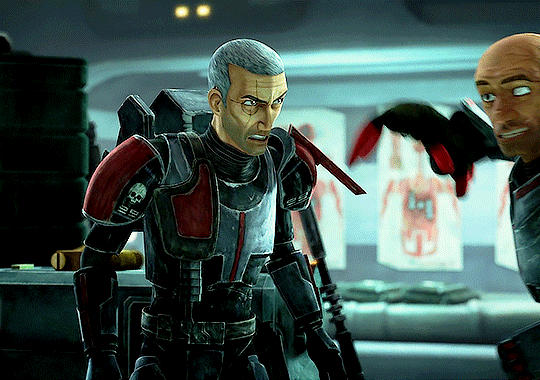
#tbb#tbb crosshair#tbb hunter#tbb omega#tbb spoilers#tbb tech#tbb x reader#the bad batch#the bad batch crosshair#the bad batch echo#the bad batch wrecker#the bad batch analysis#the bad batch tech#the bad batch x reader#the bad batch spoilers#the bad batch hunter#tbb season 3#sw tbb#tbb wrecker#tbb echo#the bad batch omega#the bad batch x oc#the dad batch#dad batch#star wars#star wars the bad batch#hunter and omega#tbb azi#tbb masterlist#hunter bad batch
204 notes
·
View notes
Text
Since when our favorite squad has been in active duty ?
Sharing this to add up to @miss-musings 's very detailed analysis of The Bad Batch timeline. If you haven't read the post, I highly recommand it! See link bellow:
Thanks to a piece of dialogue between Wrecker and Tech, we know their last detachment lasted 180 days (205, if you adjust to galatic zones change but I'm not gonna consider that because I want the number of days they actually lived)
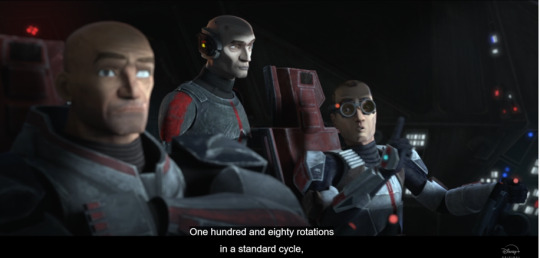
Wrecker also tells us that during those 180 days, they executed and succeded 11 missions.
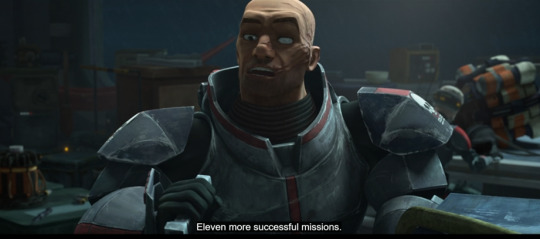
Which gives us an average duration of 16,4 days per mission.
During that scene in the baracks, we also catch a glipse of the board where they keep track of their missions. I've counted 11 groups of 5 tally marks, so 55 missions.
There are 2 possible sources of error here, because 1- I'm assuming the shot pans through the whole board but there could be more marks that we don't see, and 2 -Since it's been said they have a 100% rate of success in The Clone Wars episodes, I consider it's stil the case and that all the missions are marked on the board
With the average lenght of 16,4 days per mission, that leads us to 902 days. So roughtly
2,5 years
(Note: it is my understanding that a standard year in Star Wars is 368 days, so really close to our year)
From Wookepedia, I place the event surrounding order 66 and the creation of the Empire and therefore the first episode of The Bad Batch in the middle of the year 19BBY
"The anniversary of the Empire's creation was celebrated yearly, on the twenty-third day of the fifth month using the Great ReSynchronization (GrS) dating system based on Coruscant."
Clone Force 99 would have been promoted and sent in active duty at the beginning of year 21BBY.
To try and place it in the Clone wars timeline, that would be about a year after the battle of Geonosis (beginning of the war) but before the attack on Kamino that lead to 99's death (TCW S3E2 Arc Troopers).
I like that because I headcanon the Domino squad was propably training on Kamino around the same time and that they are close in age. I'd like to think they got to interact together thanks to 99...
Let me know if you think this make sense or if you came up with another number!
47 notes
·
View notes
Text
Crosshair's Innate Archetype (Part 1)
This is the sixth instalment of my Bad Batch analysis. This character analysis has two parts: innate archetypes and anima. I will be referring to “Gods in Everyman” by Jean Shinoda Bolen for this first part analysis. This innate archetype analysis is split into two parts.
Part 1 | Part 2
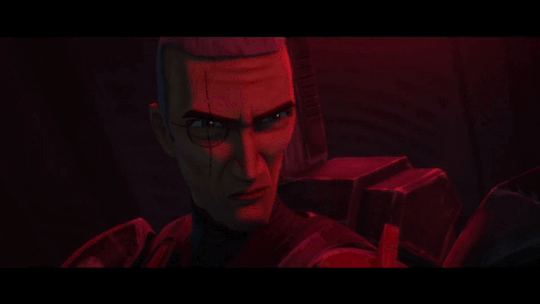
Crosshair has two main archetypes: Poseidon and Apollo. His innate archetype is Poseidon, or Neptune as the Romans called him, and he is the God of the Sea. He is linked with tidal waves and earthquakes; hence, he is called Flood-bringer and Earth-shaker. He is bad-tempered, violent, vindictive, destructive, and dangerous, and these characteristics are represented by tempest, turbulence and the raging sea. However, he can also calm the sea – storms instantly stop when he drives his golden chariot drawn by white horses over the waves, and sea monsters play around it. The sea is the realm of emotions and instincts, and it is part of the unconscious. The shallow water is where personal and readily retrievable emotions and memories can be found, while the deep sea is where repressed personal feelings and instincts reside, and it is the emotional realm we share collectively. Underground water represents the deep introverted feelings that are unexpressed and unseen.
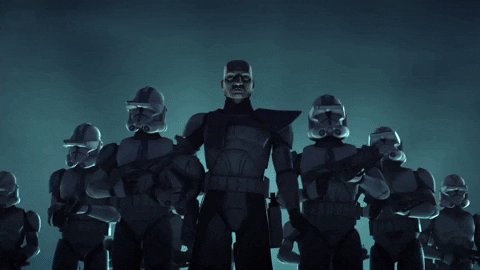
All clones have the Poseidon archetype as their innate archetype because their donor Jango Fett is innately Poseidon (Mandalorians generally have Poseidon as their innate archetype). However, this archetype is generally diluted as clones are genetically modified to be more compliant and docile. Besides that, their military training also further dilutes the effect of this archetype. Nevertheless, their Poseidon archetype motivates the clones to seek their individuality. Hence, this archetype is expressed through them in different ways such as having individual names, wearing customized armour, and sporting different hairstyles and tattoos. Even with the desire to be unique individuals, the clones also value honour, loyalty, brotherhood and community, which are all values of Poseidon. Surprisingly, these values are also upheld by most Mandalorians and the people living on Pabu.
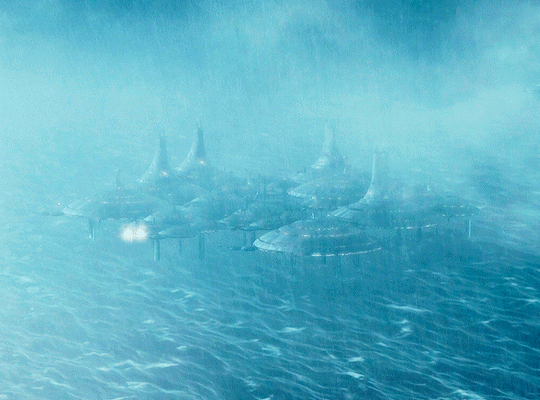
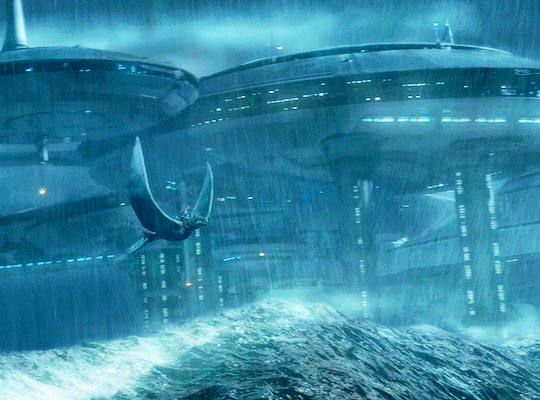
Kamino is a remote planet covered by the ocean after the Great Flood. Instead of petitioning aid from the Galactic Republic, the Kaminoans use genetic engineering to adapt their genetic codes, flora and fauna to the new watery environment. They also build their cities in higher land and on stilts. There is an abundance of life in the ocean such as the aiwhas, the Kamoradon Sea Dragon, fish and krill. The planet often experiences heavy rain, and some parts of the year is covered by heavy electrical storms. Kamino is the home of the clones. Their donor Jango Fett did live there for 10 years as he oversaw the training of the clones and raised his unaltered clone as his son, whom he named Boba Fett. Surrounded by the ocean and sea creatures, Kamino is in the realm of Poseidon, and anyone familiar with this planet are usually innately Poseidon. I believe that the Kaminoans are innately Poseidon, especially before the Great Flood. They use science and technology to adapt and survive through the environmental changes. However, once they start using genetic engineering to better themselves, they end up suppressing the Poseidon archetype. They perceive this archetype as no longer beneficial after the Great Flood, and it should be left in the past, submerged in the ocean like their old infrastructure. They become generally expressionless, which can be a sign of being “cut away” from the realm of emotions. The monotone and sterile environment in Tipoca City shows how much they have supressed this archetype. In Legends, the Kaminoans used to be expressive and they had a dance called Nahra where they would display their emotions, which is now frowned upon.

Almost all clones started off with a diluted Poseidon archetype and it is maintained through military training. Of course, there are exceptions like the Domino Squad, whom they have expressed their individuality when they were cadets. Once the clones leave Kamino and join the war, their Poseidon archetype gets cultivated. How much this innate archetype gets cultivated depends on many factors like the environment, the experiences, the people they are surrounded with, etc. For example, clones who are assigned to Anakin, Ahsoka, Obi-Wan, Yoda, Plo Koon and Shaak Ti have their Poseidon archetype being cultivated positively because they are seen and treated as individuals, not expendables. On the other hand, the clones who are assigned to be Coruscant Guards have a minimal cultivation of the Poseidon archetype as their loyalty to the Republic usually supersedes their loyalty to their fellow clone brothers. Clones who have survived through various battles will have greatly cultivated their Poseidon archetype.
As the god of the sea, Poseidon can plunge into the watery depths and stay under the sea as long as he wants. He can also rise swiftly to the surface by commanding his horses to pull his chariot. This makes Poseidon the archetype of the deep-sea diver. A person who identifies with Poseidon can dive deeply into the watery realm of emotions and stay there as long as they want to. They can feel all sorts of intense emotions that can take the forms of great beauty and monsters of the deep. They can dive so deep to the point that vision must be abandoned and they have to sense the emotions and instincts hidden in the darkness. As deep-sea divers, they have a sense of emotional depth, intensity and complexity. This archetype is expressed through art and literature, music, dance, architecture and psychotherapy when it involves diving into the collective human depth.
The world around us tends to force us to cut off the Poseidon archetype. However, one can enter the realm of emotions and be overwhelmed by it like a drowning person when they drink or when they are consumed by a strong emotion (especially if that emotion is bottled up for too long). Though, there are some cultures that connect well with the realm of emotions and allow their people to be more emotional, irrational and expressive. This is especially true for cultures that have experienced suffering historically, where art, dance, music and literature are valued, and their museums mostly contain cultural artifacts (e.g. coins, statues, artwork, traditional clothing, armour and weapons) and natural artifacts (e.g. fossils, minerals, animal and plant specimens).
Like Zeus, the Empire’s domain is the sky, which is the realm of will and power. To rise upwards, one must “leave the earth” to see the forest not the individual trees. It is a highly competitive workplace and anyone who cannot keep up the pace will be left behind. Those who manage to reach the top ranks in the Empire tend to live in their heads and express themselves through power and words. They are cut off from their hearts, hence, they lack sympathy for others. They are also cut off from their emotions and sensuality. They see their bigger picture perspective as superior, hence, they view the people below them as expendables and are willing to sacrifice them to achieve their goals. However, the clones, being Poseidon, do not share such values. They instead value loyalty, brotherhood, teamwork, creativity and innovation. Unlike the people working for the Empire, the clones are supportive of each other, and they are unwilling to leave their own behind. The Empire looks down at such values, which may explain why they always plan on casting them out after Order 66 is carried out.

The inhibitor chip not just makes the clones to mindlessly kill the Jedi, it also strips away their individuality and values – which is like suppressing their Poseidon archetype. Furthermore, the decommissioning of clones and Project War-Mantle are carried out to replace the clones with Stormtroopers, which consists of people that are willing to strip away their individuality to serve the Empire. Finally, the aerial bombardment being carried out to destroy Tipoca City, the home of the clones, symbolizes the Empire raining down lightning (like Zeus) to destroy the realm of emotions and instincts, and the city being submerged underwater symbolizes the Empire’s values – the suppression of emotions, instincts, sensuality and connections with nature and other people. I also feel that the Empire destroying Kamino could serve as an allegory of the British Empire almost decimated the Māori people and culture because I find that the Māori people’s connection with nature, loyalty and caring towards community, the desire to preserve their traditions, creative arts such as carving, tattoos and performing arts evoke the Poseidon archetype.

On the other hand, Pabu serves as the haven for the clones. It is a remote island surrounded by the ocean, and there is an abundance of life and nature like the moon-yos, fish and fruits. The people living there are refugees who have fled from war and conflict. They understand each other’s sufferings and they treat each other like family. They are also welcoming towards the Bad Batch. The Archium is a museum built to store the people’s cultural artifacts that Phee has liberated. The people respect nature as they acknowledge the moon-yos as the island’s native animals and allow them to roam freely. Despite all its beauty and abundance, the island experiences earthquakes and tidal waves. The people have built an early warning system to alert them when there is a risk of a sea surge, and rescue ladders for evacuation. Although the tidal wave has destroyed Lower Pabu, rendering many people homeless, they are resilient and they work together to rebuild Lower Pabu (with the help of the Bad Batch). The residents on Pabu uphold the values of the Poseidon archetype, which are shared by the clones, making the island as the perfect place for the clones to settle down after the war.
Crosshair has enhanced eyesight. It is said that the eyes are the window to the soul because the eyes reflect our emotions and thoughts. This means that his genetic modification not just intensifies his eyesight, it also intensifies his emotions and instincts. This also means Crosshair has an enhanced Poseidon archetype, which is why some fans think that he is the closest we can get to Jango Fett. As a deep-sea diver, Crosshair is an emotionally intense person. Even as he lurks in a corner and stays calm, his intensity leaks out and can make people feel uncomfortable around him. His eyes depict various emotions like anger, pain and sadness.

Since Crosshair feels intensely, this means that he tends to stay in one emotion for a long time and it takes time for the emotion to subside. This can become a problem, for example, if he is angry, he will stay angry for a long time. To make matters worse, he is likely to unleash his anger towards everyone, regardless it is his target or an innocent victim, just like the saying “get caught in the crosshairs” (hence, Crosshair is a fitting name for him). This is equivalent to the forces of nature destroying everything and everyone on its path without discrimination. Aside from anger and sadness, if Crosshair is in pain, he feels it more intensely than normal people. That is why Dr. Hemlock using the interrogation droid to torture Crosshair is extremely cruel (and it hints that he understands Crosshair well enough to find ways to break him). Normal people will feel intense pain from the torture method, but Crosshair feels it much worse and the pain lingers longer in his body and mind. It is remarkable that Crosshair can still talk, stand, shoot and walk after going through the intense pain.
Of course, the emotional intensity is not all negative – there are some positives. Since Crosshair is accepted and loved for who he is by the Bad Batch, he can be emotionally responsive and physically demonstrative. Besides, being surrounded by people who expresses themselves freely can help Crosshair to develop positive traits of being an emotionally intense person. There are headcanons that Crosshair laughs loudly, which I believe is in character for him – it is just that he only does it in private or with his brothers. I believe that he almost always shows his deep affection to his loved ones in private. In “Aftermath”, Wrecker says that he and Crosshair cry upon seeing the new armoury. Even though Crosshair does not want to admit it, it is in character for him to be so emotionally overwhelmed that he sheds tears. Besides that, Crosshair is extremely loyal and can develop long-lasting ties with other people, even those who are his opposites. He is fiercely protective of his loved ones and will resort to physical fights to protect them. With the access to the deep sea, which is the collective human emotional depth, Crosshair has the capacity to understand other people’s emotions, making him emotionally mature and intelligent. For example, if you feel intense pain from something that is normally not that painful to a normal person, Crosshair will not judge you and instead acknowledges your feelings as valid. If you have an unusual phobia, he will understand you and help you. I do believe that if Crosshair was with the Bad Batch in “The Crossing”, he would understand Omega’s grief of losing Echo and comfort her.
In a romantic context, Crosshair will fall deeply in love. His expressions of love will probably be rough, intense, passionate and dominating, and these may be done consciously or unconsciously. If you try to hide from him, he will still find you. If you try to downplay your beauty, he will still think you are beautiful. If he is in the mood but you are not, he will probably pull you into the same mood as him (as long as you are fine with it). It is like he drags you into the watery depths of his emotions and instincts, flooding your consciousness so you will share his feelings.
Though, it is not out of character for Crosshair to be soft and tender, and this requires him to develop the “dolphin” in himself. In Greek mythology, Poseidon saw the Nereid Amphitrite dancing and he fell in love with her. Jean Shinoda Bolen interprets the love is more than sexual desire, and that Amphitrite attracts his inner image of his beloved, which Carl Jung describes it as “anima”, the unconscious feminine side of a man. Poseidon courted her with how he was used to – dominating and overpowering her with his intensity. This frightened her and she fled to the Atlas Mountains to escape him. Delphinus (or Dolphin) found her, then pleaded his case charmingly, and she agreed to marry Poseidon. In gratitude, Poseidon made the Dolphin into a starry constellation.
It is essential for a Poseidon person to learn from the Dolphin, a creature at home in his own watery realm. Poseidon people must learn to give up the need to dominate, and instead focus on his relationships with others. By developing the “dolphin” in themselves, they can attune themselves to another person (like the dolphin can find Amphitrite although she is hiding), and be sensitive, caring and communicative at a deep level. Since emotions are naturally present in the watery realm, skills such as enhancing rapport, empathic understanding and emotional expressiveness can come naturally for Poseidon people. With encouragement and opportunity for development, they can master their feelings like how people master their artistic and mental skills. If a Poseidon person evolves with the help of the dolphin, their effect with their loved ones will be like “living in a beautiful undersea palace” where they share an emotional depth, which is a beautiful aspect of a relationship. This is a common theme for many soft Crosshair headcanons and fanfictions, and the romantic setting usually takes place at beaches.
The name Poseidon means husband of Da (posis Das), which is a name for the earth. He wields a trident, and he is symbolized by two animals: the bull and the horse (or more specifically, the stallion). The trident, bull and horse are abstract statements of his sexuality, fertility and sexual prowess. As the husband of earth, Poseidon strikes the earth with his trident to bring forth water, which brings life and fertility to the land. I have seen headcanons of Crosshair being a gardener or a cook, and these are surprisingly fitting for him as the life-giving Poseidon. Moreover, being the life-giving Poseidon also means that the clones can be great fathers. As the trident bearer, there are two sides that Crosshair and the rest of the clones have: they have multiple partners with no strings attached, or they are loyal and committed in a relationship. Like Poseidon, their partner preferences are diverse: smart and independent, emotional and sensitive, shy and obedient, quiet and mysterious, bratty and rebellious, funny and mischievous, calm and collected, tough and resilient, caring and loving, etc.
Poseidon is seen as an archetype of the wild man, which is a symbol of masculinity that is filled with instincts and is in touch with nature. Unfortunately, this archetype is disregarded and feared, hence, it is repressed by the patriarchal society. If this archetype is liberated and brought into the consciousness, it can be a source of strength and power, teaching a person to be courageous and loving. We are seeing a rise of male characters who are emotional and sensitive, which are now seen as positive traits. This leads to an appreciation and empowerment of this wild man archetype. The clones do exhibit this archetype to some extent – they are not afraid to fight and die in a war, yet they are loving and caring towards children.
Like Zeus and Hades, Poseidon is an archetype of the king. People who identify strongly as Poseidon desires to “be somebody important” and seeks power, control and respect. However, they lack the impersonality, strategic thinking, and force of will like Zeus to be successful. Due to their intense feelings associated with Poseidon, they are not good losers and can easily be enraged. In the myth, Zeus, Poseidon and Hades drew lots to divide the world: Zeus got the sky, Poseidon got the sea, while Hades got the underground. Poseidon was not satisfied with his lot, so he competed with other gods for possession of cities. In one myth, Poseidon and Athena competed for the city of Athens. Athena presented the olive tree, while Poseidon used his trident to strike a rock, producing a saltwater spring. When Athena’s gift was judged to be more useful, the enraged Poseidon flooded the surrounding plains, which might explain why Athens was located next to three separate rivers at that time. Poseidon was also unsuccessful in claiming Argos from Hera, Aegina from Zeus and Naxos from Dionysus. There is also one myth where Poseidon unsuccessfully plotted against Zeus.
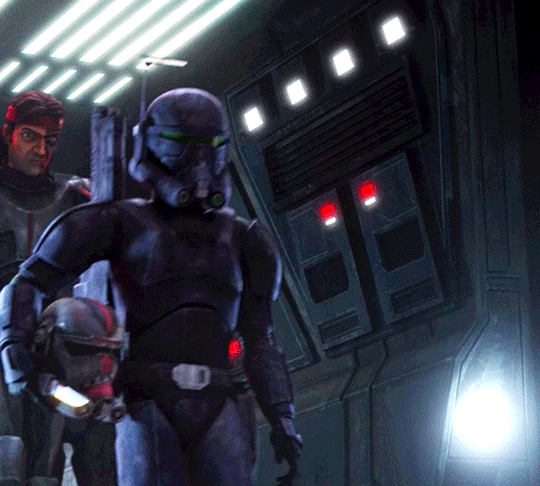
Having a strong Poseidon trait, Crosshair seeks to “be somebody important” as he sees himself and Clone Force 99 as more superior than the regular clone troopers. He is highly competitive and is unafraid to challenge for authority. For example, in “The Bad Batch”, Rex decides to take charge of the mission after Cody is injured, and Crosshair questions the legitimacy of Rex’s authority since Cody has called in Clone Force 99 for this mission, which means the authority to carry out this mission should be under Clone Force 99. Moreover, Crosshair is the only one who challenges Hunter’s leadership skills in “Aftermath”, “Return to Kamino” and “Kamino Lost”. He even wants to remove Hunter’s role as a leader and possibly taking the leadership role for himself in “Aftermath”. Crosshair being given the Clone Commander rank by Admiral Tarkin, which is higher than Hunter’s Clone Sergeant rank, probably satisfies his desire of having more power than Hunter.
Poseidon is known as the implacable enemy in Greek mythology. In Homer’s Odyssey, Odysseus blinded Poseidon’s one-eyed Cyclops son Polyphemus and escaped from being eaten. This resulted in Odysseus facing Poseidon’s wrath, leading him to spend 10 years trying to return home. This eye-for-an-eye justice is vengeance that takes nothing else into consideration, even going so far as “He who is not with me is against me” (very similar to what Anakin Skywalker tells Obi-Wan Kenobi in “Revenge of the Sith” because Anakin is innately Poseidon). In addition, Poseidon is a grudge holder, and with his emotional intensity, he can hold it for a long time and innocents are not spared from his wrath. This is depicted in one myth where Poseidon and Apollo had an agreement with King Laomedon to build the walls of Troy in return for payment. When the construction was completed, the Trojan king refused to pay, and Poseidon avenged himself “unto the second and third generation”, dragging Priam (King Laomedon’s son), Paris and Hector (King Laomedon’s grandchildren) to face his wrath.
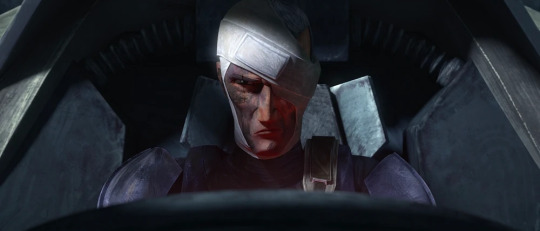
The archetype of Poseidon as the implacable enemy is present in Boba Fett, Dogma and Crosshair. After Boba witnesses Jedi Master Mace Windu kills his father Jango Fett, he becomes obsessed with seeking revenge against the Jedi. He and his mentor Aurra Sing attempt to assassinate Mace Windu, which results in the destruction of the Star Destroyer Endurance and the deaths of many innocent people (though he does not want to hurt others and he does these things reluctantly). Even though his plan fails and he is sent to prison, he still refuses to forgive the Jedi. When Dogma realizes that Pong Krell has betrayed the Republic and the clones, even taking advantage of his blind loyalty, he becomes enraged and kills the Jedi to avenge his brothers. After the Bad Batch leaves Crosshair behind in “Aftermath”, Crosshair holds a grudge against them for the entire Season 1. At the beginning of “Bounty Lost”, the vengeful Crosshair pursues the Bad Batch relentlessly even though he is severely burned by the ion engine. In “Return to Kamino”, Crosshair wants them to join the Empire to have a purpose again, but they refuse. This prompts Crosshair to warn them not to make the same mistake twice and not to become his enemy. In “The Outpost”, Crosshair gets revenge of Mayday’s death by killing Lieutenant Nolan, who refuses to provide medical help and causes Mayday to succumb to his injuries.
Although Poseidon is known for his anger, destructiveness, and otherwise stormy disposition, he also has a peaceful and merciful aspect to his personality. In his calmer moods, he visited his Ethiopian worshippers, who gave him rich sacrifices, and he forgot his pursuit of Odysseus for some time. In an act of mercy and an earthquake, he turned Thessaly, which had been an enormous lake, into dry land. He also changed Ino and her son into sea gods when they threw themselves into the sea, and appointed Castor and Pollux as protectors of sailors who could calm the storms. Moreover, the Ancient Greeks gave Poseidon various titles such as “Saviour of Sailors”, “Averter of Earthquakes”, “The Creator and Tamer of Horses” and “The Leader of Nymphs”. They prayed to Poseidon even in cities where the god of sea was not the city’s patron god to ensure the sailors and fishermen would have a safe journey. With that, it is possible for Crosshair to be peaceful and merciful, though, this is a rare occurrence. The one time we see Crosshair briefly showing his calmer side is in “Aftermath”, when Omega tells him that it is not his fault that he feels angry and that he cannot help it.
Poseidon is treated as a shadow of Zeus because the emotional aspect of the father archetype is being repressed or buried. Hence, this archetype becomes undeveloped and inaccessible to those who have severed their emotionality. This can lead to emotional instability and the tendency to react out of proportion to whatever sets them off. In the social context, there is a need to control how much emotions one can show that is deemed appropriate. Poseidon people can be emotionally expressive, but they can reach to the point when their emotions “take over”. A person who is taken over by their fluctuating subjective feelings, who takes no one else and no situation into consideration is described as self-centered and emotionally inappropriate. They are also viewed as emotionally immature or unstable, and even “out of their minds”. If they resemble a resentful, angry Poseidon, they are likely to be violent and abusive, especially when alcohol further loosens their controls. Based on my observations and my readings of various headcanons, I see that Crosshair can be both emotionally immature and mature depending on how well he controls his emotions.
Poseidon’s mythology emphasizes his resentments and retributions. He represents the dark aspect of the father archetype that seeks revenge – “an eye for an eye”. As a negative emotional complex, Poseidon vengeance can become all-consuming and destructive to one’s personality as well as towards whom the hostility is directed. A person who obsessively fantasizes about seeking revenge is also consumed by this powerful negative aspect of Poseidon.
If a Poseidon person is constantly criticised for being “too emotional” or “not rational enough”, they may internalize the criticism and continue to judge themselves negatively even when the external criticism has ceased. This can lead to poor self-esteem and they are likely to repress their emotionality. Their wellbeing and worthiness will be adversely affected, especially if they harbour powerful negative feelings such as resentment or the desire for revenge. This is common among men, but it can also happen on women.
Poseidon is the bringer of tidal waves and earthquakes. These two natural disasters represent powerful emotions that topples rationality and swallows up reality, causing a person to “go mad”. New construction or reconstruction can only begin after the waters recede or the earth becomes stable again. The calmness for the observing ego comes, allowing the person to understand the experience and reconstruct themselves and the relationships they have at least destroyed temporarily. The “tidal wave” can be interpreted as an amplified version of one’s usual emotional nature. For example, a person may react to a current pain by opening the floodgates to more grief and rage. These feelings are not new, only greater. The “earthquake” can be interpreted as one’s emotions being kept underground. The introverted feelings are like underground water that follows fault lines, and as pressure builds up underground, some mild tremors are felt but they are usually disregarded. Only after a major quake we remember the previous “rumblings” that hinted at the instability and emotionality below the surface. The earthquake represents primitive rage in which a person may irrationally attack others, which may devastate not only others but also (and even more) themselves.

Crosshair has shown to unleash his “tidal waves” and “earthquakes” a few times. In “Aftermath”, Crosshair is angry that Hunter refuses to execute Order 66 and that he let Caleb Dume escape, even lying that he stuns the Padawan and causes him to fall to his death. This causes tension to rise between him and Hunter, but it is eased temporarily by Echo, Tech and Wrecker. Things do not go well for Crosshair, especially when his meal is ruined during the food fight, prompting him to unleash his rage by hitting two clones with his tray. When Hunter disobeys orders for the second time by letting Saw Gerrera and his people go, Crosshair’s anger grows and he begins to challenge Hunter’s authority. Crosshair becomes more annoyed when Hunter decides to believe Omega’s warning and go back to Kamino to save her. As he has expected, the Bad Batch gets arrested for treason and is thrown into the brig. Crosshair’s anger becomes greater as he blames Hunter’s leadership for getting the team into trouble, and that every decision he has made since Kaller has been wrong. Realizing that Crosshair’s inhibitor chip is slightly working, Tarkin asks Nala Se to intensify the chip’s programming. I believe this operation not just intensifies Crosshair’s loyalty to the Empire, it also intensifies his feelings of anger, loss and betrayal towards his teammates. These amplified feelings are eventually unleashed like a tidal wave when Crosshair fires first at Hunter, leading to a gun battle between the Bad Batch and the clones loyal to the Empire.
In “Return to Kamino” and “Kamino Lost”, Tech, Echo, Wrecker and Omega go to Kamino to rescue Hunter, who is captured by the Empire. Kamino is dark and stormy, representing Crosshair’s turbulent emotions towards his old teammates. He is still angry at them for leaving him behind, but he has no intention to kill them despite they are branded as traitors to the Empire. He proves it by killing all four Elite Squad Troopers who refuse to obey his command and stand down. He offers the Bad Batch to join the Empire but they refuse, which angers him. When Crosshair reveals that he already has his inhibitor chip removed a long time ago, and that he willingly pledges loyalty to the Empire, Hunter and the rest of the team are shocked. Crosshair claims that this is who he is, but Hunter refuses to accept it and stuns him. Even though Crosshair is unconscious, his rage has probably reached its boiling point as he remembers his teammates refusing to join the Empire and refusing to accept that he willingly joins the Empire.
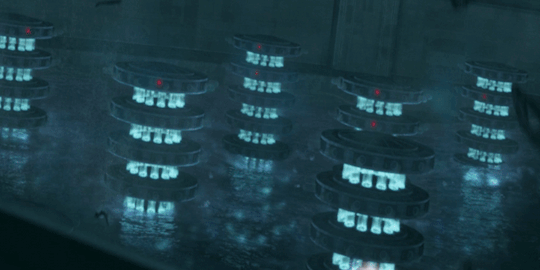
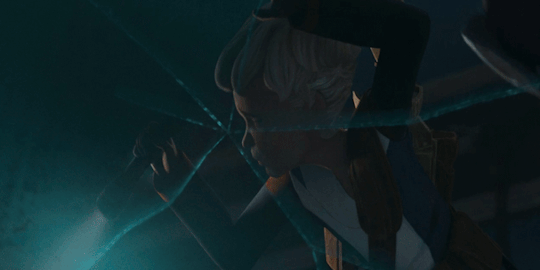
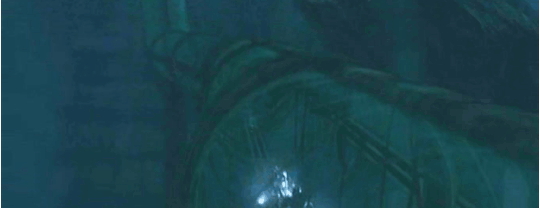
As Tipoca City gets bombarded by the Empire, the Bad Batch is forced to flee into the depths of the sinking city. As the city sinks into the ocean, the compartments get flooded, which represents Crosshair’s amplified feelings of rage, disappointment and betrayal finally bursting open, threatening to drown the Bad Batch, including Crosshair himself. Crosshair’s amplified emotions are shown when he rejects Omega’s help to free him, and when he pushes her away after she rescues him. Even as the Bad Batch manages to escape from the flooded compartments, water bursts through the cracks on the tunnels and the Kamoradon Sea Dragon further damages the tunnels as it tries to eat the Bad Batch. These represents Crosshair’s emotional tidal wave still moving to unleash its destructive force towards himself and the Bad Batch. This is evident as Crosshair is bitter that his team has thrown away their legacy, and he blames Hunter’s failed leadership for causing them to end up in a situation where they are going to die. He also blames his teammates for letting Omega (“the kid”) to call the shots and accuses Hunter for taking things personally. Crosshair’s emotional tidal wave finally subsides as daybreak comes, represented by the placid ocean and the clear sky of Kamino.

In “The Outpost”, Crosshair is reassigned to the Imperial depot on the snowy planet Barton IV. When he, Lieutenant Nolan and the clone troopers land there, it is snowing and strong winds are blowing. The snow and strong winds represent Crosshair’s inner emotions. Ever since Commander Cody tells Crosshair that they all make their own choices and they have to live with them too at the end of “The Solitary Clone”, Crosshair is unable to sleep and eat well. Moreover, he is lonely as other regular clone troopers do not want to associate with him, and that Cody later deserts the Empire. Although he seems to be disinterested of the fate of the clones because he views himself as more superior than the regular clone troopers, his inner emotions show how he is really feeling. He is fuming when Rampart refers to Cody by his designation number and he mocks the loyalty of the clone troopers due to the increasing rate of desertion. He probably also feels that the passing of the Imperial Defense Recruitment Bill is unfair because it forces the clones into retirement, which is being protested by many clone troopers. Crosshair supresses these feelings and his questioning of the Empire’s actions because he just wants to be “a good soldier”, which is all that matters to him. This is why he is unbothered by the snow and strong winds of Barton IV because his Imperial armour has shielded him from the harsh environment literally and from his inner emotions metaphorically.
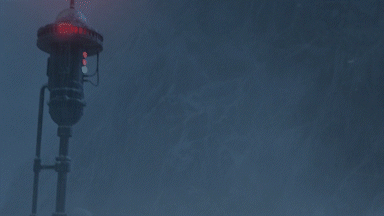
Crosshair starts to open up slightly when Commander Mayday extends his warmth and kindness to him. When Mayday gives him a tour of the Imperial depot and its surroundings, the strong winds have subsided and there is less snowfall. This change of weather indicates that this companionship has helped to ease Crosshair’s inner emotions albeit temporary. Moreover, this meeting can be interpreted as Crosshair’s subconscious is calling for help because “mayday” is an internationally recognized radio word to signal distress. When Crosshair steps on a pressure mine that is hidden underneath the snow, it serves as a warning sign to him that his inner emotions and questioning of the Empire’s actions have become a ticking time bomb. The pressure is building up and it will explode any time. Before Crosshair steps on the mine, the tunnel above him and Mayday rumbles, which can be interpreted as an early warning sign of Crosshair’s destructive emotions. Thankfully, Mayday disarms the pressure mine and by slowly lifting his foot, Crosshair is able to escape from danger for now. When facing an overwhelming number of raiders, Crosshair shoots at a power generator, which causes an explosion that takes out the raiders. However, the explosion also creates cracks on the mountain and causes rocks and snow to fall onto the raiders’ hideout, in which Crosshair and Mayday have to escape from. The cracks on the mountain indicates that Crosshair’s inner emotions and questioning of the Empire’s actions are starting to leak out. It is like water starts to leak out from a cracked bottle due to the pressure. Though, Crosshair and Mayday think that the cracks are mild and ignore them, just like most people ignore the mild tremors coming from the earth.
When they go to recover the stolen cargo, they discover that the cargo contains stormtrooper armour for the new Imperial Military. Mayday is upset that he and his brothers are being treated horribly despite their combat service, loyalty and sacrifices. His sentence “We’re good soldiers, we followed orders, and for what?” finally hits Crosshair and intensifies his inner feelings and questioning of the Empire’s actions. Then, loud rumbling sounds can be heard and the ground begins to shake. This indicates that Crosshair has reached his breaking point and he can no longer contain his inner emotional turmoil. An avalanche comes running down towards Crosshair and Mayday. The avalanche (which can be seen as an icy tidal wave) represents Crosshair reacting to his current emotional turmoil by opening the floodgates to more turmoil. The avalanche buries Crosshair and Mayday, which causes Mayday to get injured and Crosshair to lose his helmet and expose himself to the cold. This disaster symbolizes Crosshair’s destructive emotions have devastated Mayday and Crosshair himself. Now, Crosshair, with his helmet off, is forced to face the aftermath of his actions and emotions. Since the emotional floodgates are opened, strong winds and snowfall, which also represent Crosshair’s emotional turmoil, appear as Crosshair brings the injured Mayday back to the Imperial base. They are forced to endure the icy and freezing conditions without proper equipment and supplies. The strong winds and snowfall only subside when Crosshair and Mayday finally arrive at the Imperial base. The clear weather indicates that Crosshair has let go of his ego and his emotional turmoil as he is only focused on making sure Mayday gets medical treatment.

Across the world, many people live in places that are prone to natural disasters such as storms, earthquakes, floods, hurricanes, and tsunamis. Some people choose to move away from these places, but many choose to stay. They learn to read the weather or seismological reports. From experience, they learn what to expect, how to prepare, and what to build that is likely to survive a potentially destructive wave or quake. People whose Poseidon emotionality can overwhelm their egos must become conscious of their own susceptibility and must learn as much as possible about its conditions and warnings. They must develop ways to live with this powerful part of them. Similarly, people who are affected by the destructiveness of Poseidon, as lived out in someone else, must learn to detect the warning signs.
In “Pabu”, Hunter is able to sense the incoming tremor before it hits the island, just like the moon-yos quickly retreating before the rumbling comes. He tenses up, and before he suggests that they retreat, a small tremor rocks throughout the island and sea. The residents of Pabu, especially Shep and Lyana disregard the small tremor because it is a common occurrence on the island. Not long after, a larger tremor comes, which concerns everyone. This scene shows that Hunter is extremely sensitive to changes of pressure, and a slight change is enough to prompt him to take quick, decisive actions. By interpreting the tremors as powerful and destructive emotions, it can be said that Hunter is able to detect the warning signs given out by Crosshair’s inner emotions. This is evident in “Aftermath” when Hunter is able to sense that Crosshair is staring at him intensely despite his eyes are closed and Crosshair is wearing his helmet. He probably already knew that Crosshair is going to ask him about the Padawan when he asks “what?” to Crosshair. Thanks to his enhanced senses, Hunter can quickly pick up changes to Crosshair’s emotions. He takes action when he senses even a slight increase of intensity of Crosshair’s emotions.
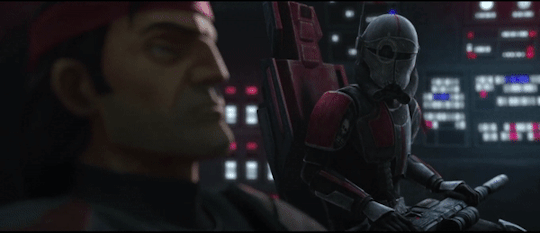
In the Hyperspace Stories #10, the Bad Batch is sent to Hylanth, a moon in the Outer Rim for a mission involving battle droids. This mission seems to frustrate Crosshair as the words “battle droids” are written in bold, indicating a greater emphasis of these words. Hunter senses his frustration and tells him that they have their orders. Crosshair then explains that he is not questioning the orders, but he just feels that this mission can be carried out by the regular clone troopers. After Tech explains that the battle droids they are sent to investigate have been modified, Crosshair says that “maybe there is hope for this mission yet” because he likes to be challenged. This causes Hunter to tease Crosshair for sounding grumpy. I feel that Hunter does not tell Crosshair to shut his mouth when his words irk Jesse and Rex in the Clone Wars episodes because Hunter does not sense any increased tension from Crosshair’s words and that it is just on brand of his dark, twisted sense of humour. However, in “Aftermath”, when Crosshair starts shooting at Caleb Dume, Hunter quickly orders him to stand down. Furthermore, in “Return to Kamino”, tension rises between Hunter and Crosshair due to the reveal that Crosshair already has his inhibitor chip removed and that he willingly joins the Empire. Before Crosshair can shoot, Hunter stuns him, indicating that his quick, decisive actions are meant to dilute Crosshair’s intense emotions. Hunter’s Dionysus archetype enables him to sense changes to Crosshair’s emotions like the mysterious and uncontrollable tides that flow and ebb in nature, and his Demeter anima motivates him to care for Crosshair’s emotional needs. His Zeus archetype helps him to take immediate action to calm Crosshair down, though, this tactic does not always work because he may not fully understand how and why Crosshair feels that way, which is evident in the comic and the episodes stated earlier.
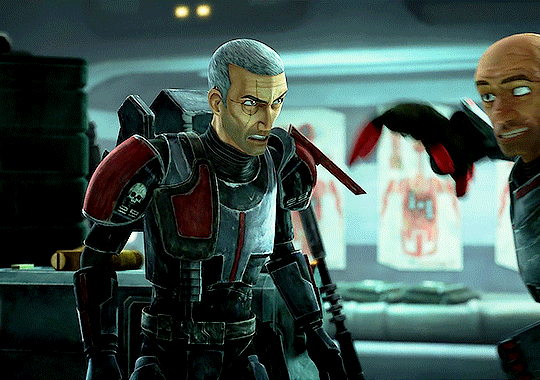
Besides Hunter, the rest of the Bad Batch have their own ways to handle Crosshair’s emotionality. Wrecker, who has a strong Aphrodite anima, is drawn to Crosshair’s intense emotions. He attends to Crosshair’s emotional needs by annoying him and shifting his focus so his emotions can subside faster, which is shown in the Hyperspace Stories #10, “The Bad Batch” and “Aftermath”. Even when Crosshair reacts angrily at him, he remains loving towards him. Moreover, Wrecker encourages Crosshair to be emotionally expressive, which is evident in “Aftermath” as Wrecker corrects Crosshair that they both did cry seeing the new armoury. Besides that, Wrecker is an explosive expert, which means that he can handle Crosshair’s destructive and explosive emotions as he knows how to disarm it.

Tech, who is Hades the Good Counsellor, accepts that Crosshair is severe and unyielding, and that nobody, not even Crosshair himself can change that. Tech’s subjective understanding enables him to accept Crosshair’s decision to join the Empire and let go of the emotional pain inflicted by him as seen in “Kamino Lost”. In “Pabu”, after a larger tremor rocks throughout the island, Tech warns that the island is vulnerable to a sea surge with the risk ranging from highly probable to imminent. His prediction comes true when the island’s early warning system later comes to life. By interpreting the tremors and sea surge as powerful and destructive emotions, it can be said that Tech is well-prepared in predicting and handling Crosshair’s intense and destructive emotions, like he is the head of the emergency or disaster management. When Crosshair’s inner emotions begin to leak out or show its cracks, Tech takes notice of it and expects the worst outcome. With that, motivated by his Athena anima and his Hermes archetype, he raises his defence and diverts others away from Crosshair before his emotions are unleashed. Once Crosshair’s emotions subside, Tech assesses the aftermath, carries out the recovery process, and implements better preparations to mitigate its destructive forces.
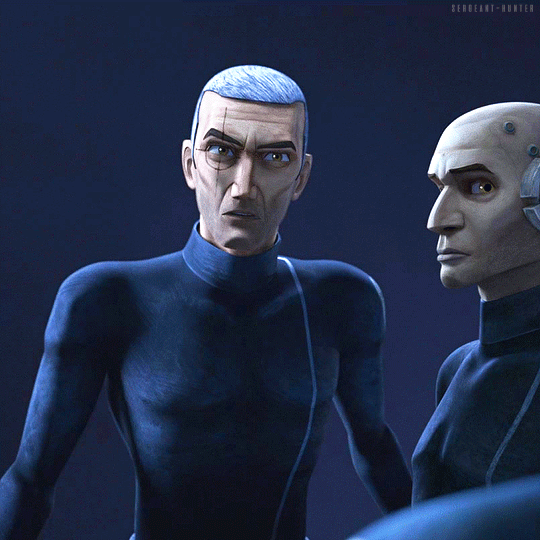
For Echo, who has the Hephaestus archetype, handles Crosshair’s emotionality by being stubborn and being the family peacekeeper. In “Aftermath”, when Echo senses the rising tension between Hunter and Crosshair, he questions why the clone troopers turn on their general Jedi Master Depa Billaba despite they have been serving her for years. This causes Tech to explain about the regular clones’ programming, which distracts Hunter while Wrecker distracts Crosshair. With that, Echo is able to ease the tension temporarily. Later in the episode, Echo takes on a more assertive approach in dealing with Crosshair’s intense emotions. When Crosshair grumbles about the team debating their choices and they need to complete the mission of eliminating the insurgents, Echo tells him to wake up and see that the Empire has sent them to kill innocent civilians. Then, when Crosshair demands Hunter to explain why he has gone soft, Echo tells him to stop it as there is no use of fighting and they should focus on escaping the prison. Moreover, since Echo has a strong Hestia anima, he is usually unaffected by Crosshair’s emotionality, and he is not judgemental towards Crosshair.

Omega, who is highly perceptive thanks to her Persephone archetype, can sense that Crosshair is angry. She reaches out to him and sits beside him. She then pleads with him not to do what he is going to do. She tells him that it is not his fault that he is feeling angry and that he can’t help it, which briefly softens him. In “Kamino Lost”, Omega once again approaches Crosshair and observes that he never liked Kamino. She understands him as she has spent most of her life inside Nala Se’s private laboratory alone until the creation of the Bad Batch, which is why she is determined to find them all again. Her receptive personality makes her kind and compassionate, and it gives her the ability to try to see things from Crosshair’s perspective, so she can reach out to him from the emotional level.
Besides the Bad Batch, Cody and Mayday have shown the ability to handle Crosshair’s emotionality. In “The Bad Batch”, after Crosshair’s words incite anger in Jesse, Cody reminds him that they are all on the same mission and he needs to cut his attitude. In “The Solitary Clone”, Cody specially requests Crosshair to be part of the mission and he chuckles at Crosshair’s humour. Cody’s no-nonsense attitude and authority gain Crosshair’s respect. As for Mayday, he shares a heater with Crosshair and starts a conversation with him, which helps Crosshair to open up. He also gives Crosshair a tour of the Imperial base so he can be familiarized with the new place and the planet’s harsh environment. He even encourages Crosshair to humour him as he disarms the pressure mine that Crosshair has stepped onto it. Although Mayday does not have any proper tools and equipment to disarm the mine, his experience and creativity help him to save Crosshair. I have interpreted that the pressure mine represents Crosshair’s emotionality as a ticking time bomb, and with Mayday’s ability to disarm it without proper equipment, it can be said that Mayday is highly experienced in handling people with intense emotions like Crosshair.
Although Crosshair is cold and rude, he is fortunate to be accepted and loved for who he is by the Bad Batch, Cody and Mayday. His relationships with them, especially with the Bad Batch, help him to develop his “dolphin”, allowing him to have a better understanding and control of his own emotions. It is believed that Crosshair has the habit of pushing boundaries to test people – to see whether they can handle his emotionality and stay, or become disgusted and run away from him. He probably knows how his intense emotionality scares most people away, and he does not want to waste time on people who do not appreciate and accept him for who he is. He also wants to spare himself from the hurt and betrayal. Crosshair is grateful that the Bad Batch chooses to stay with him, and in return, he gives his loyalty and respect to them. Unfortunately, that all changes with the issue of Order 66.
When Order 66 is issued, Crosshair’s inhibitor chip is somehow activated. He becomes adamant in carrying out orders without question. Influenced by the order, he tries to shoot Caleb Dume down. Hunter keeps telling Crosshair to stand down but to no avail. Crosshair later gets angry that Hunter has allowed Caleb to escape and has lied that the Padawan has been eliminated. His anger intensifies when Hunter defies orders to eliminate Saw Gerrera and his people. When the Bad Batch is thrown into prison for disobeying orders, Crosshair blames Hunter’s leadership for getting the team into trouble. Hunter, Tech, Wrecker and Echo do not understand what is wrong with Crosshair. They never have an issue with disobeying orders because they do it all the time. Crosshair also does not understand what is wrong with himself. The inhibitor chip has “tampered his access to the emotional realm” (for regular clones, the chip “inhibits their access to the emotional realm”), thus, hampering his emotional control. Crosshair probably feels frustrated that nobody, not even himself can figure out what has gone wrong. To make matters worse, Hunter, Tech, Wrecker and Echo are more focused on trying to escape instead of taking care of Crosshair, which may have frustrated him further because he thinks that they are indifferent towards him. Omega, who notices his anger, is the only person to reach out to him, and she is able to comfort him for a brief moment.
After Crosshair’s operation, the effects of the inhibitor chip are intensified, along with his anger towards his teammates, especially Hunter. His amplified rage is eventually unleashed towards his teammates when he fires the first shot, starting a gunfight. When the Bad Batch manages to leave Kamino, Crosshair feels bitter that they have left him behind. They have always stay by his side no matter how intense his emotions can get, but this time, they run away from him – like Amphitrite fleeing from Poseidon, and some people moving away from places prone to natural disasters. Crosshair feels betrayed by their actions.
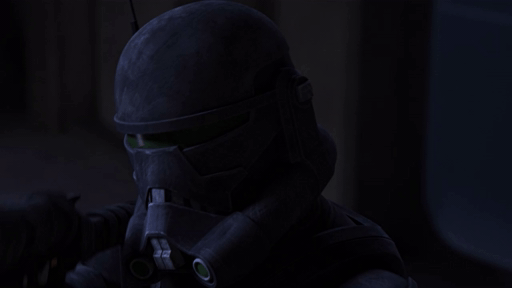
The Bad Batch later finds out about the inhibitor chip, and they suspect that it has caused Crosshair to betray them. In “Replacements”, Hunter is angry at himself for leaving Crosshair behind. Omega comforts him and says that they will find a way to bring Crosshair back. Even though they now have the knowledge about the inhibitor chip and how to remove it, they are actively trying to avoid Crosshair, who is hunting them down because they are traitors to the Empire. Due to their last gunfight, they probably think that Crosshair is trying to kill them. When Crosshair manages to catch up with the Bad Batch in “Reunion”, Hunter and Omega try to snap him out of the effects of the inhibitor chip but to no avail. Tech already predicts that Crosshair will not be convinced due to his severe and unyielding nature, so he has prepared an escape plan for the team. After barely escaping from Crosshair’s relentless chase, the Bad Batch is probably aware of his wrath and decides to stay away from him for some time. In “Rescue on Ryloth”, when the Bad Batch spots Crosshair in the city, they step back to discuss their plans for they do not want to be noticed and hunted down again. However, a probe droid hovers above them and Crosshair is alerted to their presence. The team wants to abandon the rescue mission, but Omega manages to convince them to continue on. After the Bad Batch successfully carries out the rescue mission, Rampart realizes that he has underestimated them and gives Crosshair permission to hunt them down. Crosshair’s eyes and smile show his conflicting emotions – he is happy to have a chance to approach his teammates again, but he still harbours anger and sadness towards them.
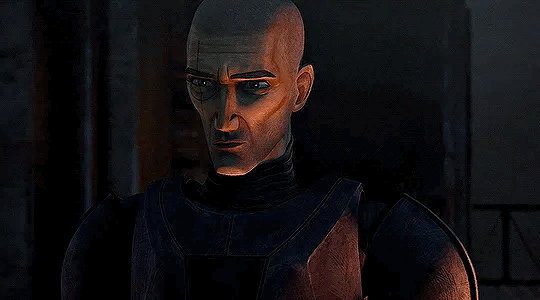
In “Return to Kamino”, Hunter explains to Crosshair that they did not have a choice when they left Kamino without him, in which Crosshair counters “and I did?”. He probably feels angry and betrayed that Hunter tries to justify his actions for leaving him behind. When Tech, Wrecker and Echo walk into a trap set up by Crosshair, Hunter keeps thinking that Crosshair is going to kill all of them. Although Crosshair is angry that Hunter has betrayed everything they once stood for and is not loyal to him, he is willing to give them a chance because he believes they can be brothers again. He proves his loyalty towards them by killing his own Imperial squad (he even has it planned out by placing the reflecting mirrors to make the trickshot). He offers them to join the Empire, but they refuse. Hunter even counters that Crosshair does not get who they are, which angers him once more. Crosshair’s anger intensifies when Hunter refuses to accept that he already has his inhibitor chip removed and he willingly joins the Empire, even claiming that this is who he is. Even though Crosshair is still mad at the Bad Batch throughout “Kamino Lost”, he still follows them and saves Omega from drowning. However, he notices that Wrecker, Tech and Echo aiming their blasters at him because they think he is going to shoot Hunter. From there, Crosshair knows that no matter what he does, their trust has been broken and there is nothing he can do to regain that trust. Perhaps in the past, he can express his trustworthiness through action (because he finds it difficult to express it through words), but now, it does not work anymore. Hunter offers a chance for Crosshair to return to the team, but this will require him to give up the Empire and his identity as a soldier. Perhaps in the past, Hunter gives unconditional love to Crosshair, but now, his offer is seen as conditional to Crosshair. This may have caused Crosshair to question whether the love he gave in the past was even truly unconditional. Crosshair probably feels betrayed and bitter that Hunter does not fully understand him, which strengthens his decision to not return, making the fallout more severe and tragic.
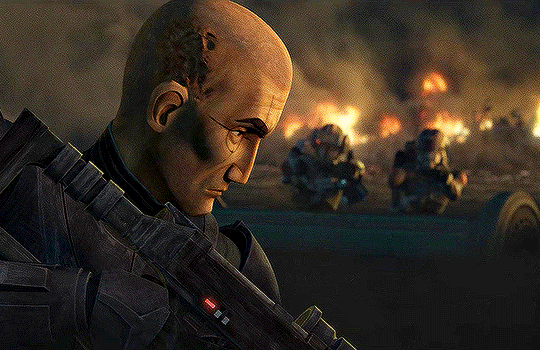
Fortunately, all hope is not lost for Crosshair. We know that nature is both generative and destructive, just like Poseidon who can bring life and fertility, or death and destruction. After a natural disaster, given the time and space, nature heals itself and the survivors of the disaster become stronger. With that, it is possible for Crosshair to return – we just need to give him time and space. Omega understands this well, thanks to her Persephone archetype. Persephone is the symbol of spring, representing new life appearing after a brutal winter. Before Omega leaves with the Bad Batch, she tells Crosshair that he is still their brother and that he is her brother too. She holds onto hope that he will return, but it must be done according to his time – nobody can force him to come back now.

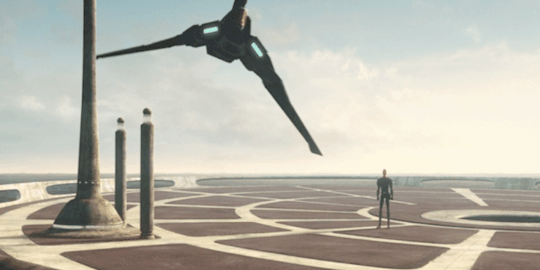
Although Crosshair is still angry at them, he is saddened to see them leave him on the Kamino platform. Throughout season 1, Crosshair laments how Hunter has thrown away their past achievements and missions. Those memories are of great importance to him and he finds it difficult to let go. People who are like Poseidon are more focused on the past and present, and accompanied with their intense emotions, they may replay their memories constantly or become entranced by what is happening right now. It is likely that Crosshair contemplates his memories with the Bad Batch as he waits for 32 rotations for the Empire to rescue him. With Tipoca City, the home of the clones, have sunk into the ocean, all the memories the clones share have become part of the collective emotional realm. Crosshair likely takes on the archetype of the deep-sea diver as he ventures into the collective emotional realm and reminisces about his time with the Bad Batch.

In the collective emotional realm, Crosshair probably replays all the good and bad times they have shared, including the times where his emotions got the better of him and everyone had to clean up the mess he had caused. There might have been bitter feelings, but they all learned from their mistakes and moved on. Perhaps from here, Crosshair finally understands Hunter’s actions and feelings. He may realize that Hunter feels awful for leaving him behind, and that he blames himself for losing him. After losing Crosshair to the Empire, Hunter is determined to keep the remaining teammates safe, and becomes overprotective towards them (which is motivated by the negative Demeter anima). This may explain why they never try to go after him and get him back. Moreover, Crosshair may also realize that his intense rage has influenced Hunter’s overprotective tendencies. Hunter thinks that Crosshair is trying to kill them, which causes him to prioritize in rescuing his remaining teammates from Crosshair’s wrath. When the Bad Batch and Crosshair reunite in Bracca, Crosshair’s wrath remains intense, which causes the Bad Batch to run away again and attempt to hide.
Furthermore, Crosshair may come to understand why Hunter refuses to accept that he willingly joins the Empire. Hunter wants to believe that Crosshair is being “held captive” by the Empire (like Persephone being held captive in the Underworld) and that they can free him by removing his inhibitor chip. When that belief turns out to be untrue, Hunter’s overprotective tendencies return. He believes that this is his only chance to get Crosshair back, and he is determined to do anything to achieve that. He keeps trying to reason with Crosshair but to no avail. He offers Crosshair a chance to return but this requires Crosshair to give up the Empire and the soldier’s life. Crosshair is disappointed that his love has become conditional, thus, he rejects the offer.
As Crosshair comes to see things from Hunter’s perspective, he learns to understand why Hunter has acted this way, even though he does not agree with him (like Tech’s quote “Understanding you does not mean that I agree with you.”) This helps Crosshair to let go of his rage towards Hunter and the rest of the Bad Batch. He also comes to take responsibility for his actions and emotions. After he gets rescued by the Empire, he lies in his report that Clone Force 99 have perished in the bombardment because his loyalty to his teammates remains strong and he wants to protect them from afar. I do believe that Crosshair still holds onto some hope that he can still reconcile with the Bad Batch despite his belief that they will not come back for him. He probably still believes the unconditional love they gave to him in the past is real, and it can happen again. This is hinted in “Tipping Point” when Crosshair sends Plan 88 to tell the Bad Batch to hide as the Empire is after Omega. His message is then discovered by Tech when he checks the team’s old comm channels. If Crosshair believes that the Bad Batch has given up on him and there is no possibility of reconciliation, he will not have sent Plan 88 using his old code and expect that they will find it.
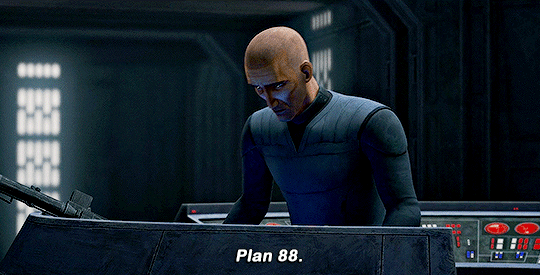

In “The Solitary Clone”, Crosshair seems to have calmed down and becomes slightly mellow. He even tries to join the regular clone troopers for breakfast, which is something the old Crosshair will not do. This change of behaviour makes me believe that Crosshair has made contact with the collective human emotional depth during the 32 rotations on the Kamino platform. However, the Empire rejects the values of Poseidon, and Rampart even taunts the clones for having these values. Crosshair feels unappreciated and lonely, and to make matters worse, Cody does not take his loyalty well. Many people believe that Crosshair only carries out Governor Grotton’s order to execute Tawni Ames because Governor Grotton threatens Cody with the consequences of not carrying out his order, and Crosshair wants to protect Cody. Just like his action of saving Omega was met with hostility from the Bad Batch, Crosshair’s action upsets Cody and causes him to desert the Empire. Losing Cody may have worsened Crosshair’s loneliness and the feeling of being unappreciated, and this causes him to shut himself off from everyone, which is represented by him putting on his helmet and walking away by the end of the episode. His shields are up, and he becomes emotionally detached. By doing so, he is actively ignoring and suppressing his emotions. He loses his connection with his innate archetype until he meets Mayday in “The Outpost”. Mayday’s kindness opens the floodgates and helps Crosshair to truly be himself once more.
After “The Outpost”, I find myself relate to Crosshair immensely, especially on the emotional level. That episode helps me to discover that Poseidon is my main animus, which is the unconscious masculine side of a woman. I am emotional and sensitive. I like to go to museums and learn about history and geography. I am always fascinated by marine life and underwater beauty (especially coral reefs). I have always been drawn to natural disasters because I am fascinated by their destructive forces and the aftermath (a hint of my intense yet destructive emotions). My anger or sadness tend to hold on much longer. I used to hold grudges and they could last for years (I try not to do that anymore). Since I am the only emotional one in the family, I constantly get criticized for expressing my emotions – when I laugh loudly, I am “impolite”; when I start yelling angrily, I am “rude”; when I burst into tears or scream out of fear, I am “weak” and “pathetic”. My family expects me to be level-headed, and every time my intense emotions leak out, I am told that “I cannot survive in this society”. My aunts prioritize being level-headed so much that they cannot comprehend real people and fictional characters acting on their emotions, even going so far as to calling them “stupid” for letting their emotions to flood their rationality. I also do not find comfort in school as I constantly get bullied by others. I remember crying a lot, but nobody came to help me or comfort me. Until one day, I snapped and resorted to anger to defend myself from the bullies. Since then, I became hot-tempered and this is something I am not proud of (genetics may have played a part because my maternal grandfather and mother are both hot-tempered). I remember one teacher described me as “manipulative” because “I constantly cry to get people’s attention”, and I end up feeling that it would be best if nobody cares about my venting so as to not being labelled as “an attention seeker”.
The constant criticisms and judgements received have caused me to develop a habit of bottling up my emotions. I keep ignoring and repressing my emotions until I can no longer hold back. My intense emotions get unleashed in a destructive manner, which hurts everyone, including myself. This has damaged my friendships and relationships. Even some of my friends who allow me to express my feelings and vent my troubles are taken aback by my intensity. Once, they have to remove me from the friend group temporarily and give me a timeout. I do take responsibility for my actions and appreciate the second chance they have given me. To stop myself from further damaging my relationships, I decide to shut myself off from everyone when I find my emotions have become unstable. However, this causes some people to inquire my emotional state and pressure me to tell them. When I refuse to share my feelings, they call me “ungrateful”, “rude” or “selfish”. But when I share my feelings, thus, unleashing its intensity and destructive force, they are taken aback and get hurt. They either become distant and cold towards me or judge me harshly for being emotional. This only make me feel that it is best that I keep my emotions and troubles away from other people, and that I should not share my burdens with others since they usually do not understand me. I isolate myself further from people and resort to carry a heavy burden on my shoulders. I can’t help but to internalize these criticisms and judgements. I feel ashamed to be emotional and I tend to judge myself harshly when I show emotions. I have been rejecting my Poseidon animus until I finally see myself in Crosshair. I am learning to accept that “this is who I am” like Crosshair. I also find it heart-warming that Crosshair is surrounded by people who love and accept him despite his intense emotions. I would love to be part of the Bad Batch because I would feel safe to express my emotions and be myself.
Since Poseidon people are susceptible to be taken over by strong emotions, they need to develop abilities to observe, reflect and think objectively. One method is to develop an observing ego. In Jungian psychological terms, the ego is the consistent, observing, remembering, and deciding element in the psyche—what you mean when you say, “I.” A complex is an archetypal pattern that has become charged with emotion. When an emotional complex has more power or energy than the ego, it can temporarily “take over” or “possess” the personality. For example, a father may become “like a man possessed” and bent on vengeance when his child is hurt. He may become like Poseidon in relentless pursuit of Odysseus – he is so consumed with rage and revenge that he is not available to support or comfort and help heal his child. This same complex may be activated by the same situation in another man with a stronger ego. He may have vivid fantasies of retribution, but realizes that he must struggle with the hatred that threatens him, knowing that his child’s wellbeing is of greater importance.
When an emotional complex takes over, the “I” is put out of commission. The Poseidon person may be unconscious or blind to what is happening, while people around them react in different ways. They may be humoured, avoided, or feared. The emotional complex they are possessed with may provoke an equivalent unconscious complex in others. The Poseidon person may also struggle with the complex, feeling themselves overreacting or behaving in ways that are “out of character”. By learning to observe a complex, the focus and energy are shifted from the complex to the ego. The “I” sees what is happening and resists being taken over by the complex. The complex loses energy and influence, and it recedes. During this process, the Poseidon person and their relationships can grow in depth when compassion is given to themselves and to others who are affected by the complex. Two archetypes can be developed to help Poseidon people to deserve an observing ego, which are the Zeus archetype that enables them to see circumstances objectively and dispassionately (which is an archetype Hunter has), and the Hades archetype that enables them to recognize that their emotions are often connected to archetypal images, which are patterns that exist in the collective unconscious (which is Tech’s innate archetype).
Instead of expressing their emotions in a destructive manner, Poseidon people can channel their emotional depth and intensity into creative work such as drama, poetry, literature, music and art. With that, the Hermes archetype (which is an archetype Tech has) must be developed. As the Messenger God and Guide of Souls, the Hermes archetype can bring forth the potentially disruptive emotions hidden in the depths and turn them into emotionally expressive works. Besides Hermes, the Hephaestus archetype (which is Echo’s innate archetype) can also help Poseidon people to transform their emotions into creative work. Hephaestus, the God of the Forge, is a rejected god; but instead of erupting like a volcano, he channels his intense emotions to create beautiful and useful objects. He expresses his emotions in a creative manner. This difference is shown in how Echo and Crosshair react to the Empire’s mistreatment to the clones. Echo channels his anger through constructive means by joining Rex’s resistance network, rescuing the clones from the Empire, and turning Trace Martez’s repair shop into a refuge for the rescued clones. On the other hand, Crosshair channels his anger through destructive means by killing Lieutenant Nolan to avenge Mayday’s death.
It is important for Poseidon people to learn how to dilute the effects of this powerful archetype. The first method involves them to give up the need to dominate and learn from the “Dolphin” as previously stated. The second method involves the development of other archetypes, specifically those that have the ability to think of the consequences, to become objective, and to achieve some distance. Zeus and Athena are the archetypes commonly developed to dilute Poseidon’s effect, but the most common archetype to be developed is Apollo, which serves as Crosshair’s other main archetype.
#star wars#star wars the bad batch#the bad batch#tbb#sw the bad batch#sw tbb#the bad batch analysis#tbb analysis#the bad batch meta#tbb meta#star wars clone wars#star wars the clone wars#sw the clone wars#sw clone wars#the clone wars#clone wars#star wars tcw#sw tcw#the bad batch crosshair#tbb crosshair#crosshair bad batch#crosshair tbb#crosshair the bad batch#bad batch crosshair#clone force 99#archetypal psychology#archetypes#gods in everyman
71 notes
·
View notes
Text
Vice Admiral Rampart horoscope, and a Rampart and Crosshair analysis
✧ sun in gemini (air, mutable)
Geminis are perceptive, analytical and quick-witted. Being very versatile, they adapt easily to new situations and are comfortable being quiet or talkative, depending on the energy in the room. They're great at communicating, which is something we often see with Rampart — he knows just what to say and when to say it, and always looks pleased with himself when it gets him the exact expected reaction. He easily sees through people, swiftly sizes them up and knows when he's being lied to. Geminis are also known for being funny and, although Rampart's humour is mostly mean-spirited, he has some amusing moments.
They possess sharp tongues and are often the first to start fights, and also the last to back down. Their perceptiveness makes arguments easy for them; they know what to say to make it hurt and are relentless and merciless in their verbal attacks. Rampart doesn't shy away from using people's words against them; “Is that so? Then please enlighten me, who is responsible?” When it comes to verbal altercations, geminis are merciless and will say about anything to win and hurt.
I like that Rampart's gemini mirrors Crosshair's scorpio in this aspect — both of them look for weak points and then dig their fingers into open wounds; “I think you're letting your personal feelings get in the way because you left him for dead at the citadel. [...] Oh, I don't blame you. I would have left him for dead, too. Besides, he's just another reg.”, vs. “Clone loyalty does not seem to be as advertised anymore. Funny, isn't it? How these clones around you keep disappearing.” They're similar in that way, and even though scorpio usually tries to keep its emotions secret, Crosshair, left by his squad, by Cody, and an outcast amongst regular clones, is an open book to Rampart's perceptiveness. In a way, Rampart takes on Crosshair's role in season 7 of The Clone Wars — he's purposefully antagonising and wants to provoke a fight; the cooed “Problem?” dares Crosshair to retaliate, either verbally or even physically. I don't doubt Rampart would willingly take a punch to have "won" that argument. Taking this even further, Crosshair uses the exact same wording when confronting a subordinate.
Rampart and Crosshair also are direct opposites to each other in the aspect of loyalty. Geminis are unpredictable, flighty and easily bored; they're elusive and know how to get out of uncomfortable situations, and they struggle with emotional commitments. While romance isn't a topic brought up with Rampart, we can instead see his commitment to different organisations and groups — the Bad Batch, the Empire — as his "relationships". Geminis are often so quick to abandon ship that they end up having multiple relationships in a short period of time, usually with very different people. He agrees to help the Bad Batch out when it benefits him, then promptly betrays them the second he sees an opportunity to gain his power back, and he doesn't feel guilty about it, even though the Bad Batch, despite not having been particularly friendly, took care of him and saved his life multiple times. His loyalty lies with himself most of all. Crosshair is the complete opposite. He's conflicted and plagued by guilt most of the time, and he stays with the Empire even though he's treated more than badly. His scorpio stellium contrasts strongly with Rampart's gemini stellium; scorpio is a fixed sign while gemini is mutable. Crosshair is, in the words of Tech, severe and unyielding — he struggles with change and adaptability. His squad leaving and his trust and loyalty being broken means the end of the world to him, which is why he's that intent on revenge; he's been hurt greatly and doesn't know how to get over it, and thinks revenge might be the only way for him to feel whole again. Rampart adapts easily, like it's second nature; when uncomfortable topics get brought up, he makes up lies on the spot and gets away with them, and he joins forces with the enemy when it benefits him, while Crosshair preferred to nearly starve to death rather than to even let his former squad drop him off on another planet. Crosshairt thinks in black and white, while for Rampart, it's all muddled greys. Crosshair is stuck in an endless cycle of hurt, and Rampart gets over things quickly; scorpios grieve and brood endlessly, with gemini, it's more of a “Well, that happened. Anyway —”. They discuss this, too, in one of my favourite conversations in the entire show:
"Remind me, how long were you left stranded on that Kaminoan platform before being recovered?"
— "Thirty two rotations."
"Mhm. All that time. Left for dead, and yet you still came back. Hah—, why?”
— "I'm a soldier of the empire.”
"I see. Your loyalty and determination are commendable."
Rampart not even trying to hide the condescending tone in his voice is both hilarious and agonising; it's him mocking Crosshair for his unwavering loyalty even when having been treated terribly. For a fixed sign like Crosshair, being a soldier of the Empire is everything he has, it's his identity and purpose, and even though he wants his former squad back together, he doesn't fully realise that leaving the Empire is even an option. It's who he is, at this point, and he has no choice but to accept and bear however the Empire sees fit to treat him. All that only comes to a breaking point with Mayday once multiple people have had enough of an impact on that belief, on his resignation to his fate, to shatter it and set him free. Rampart, in this conversation, is, in my opinion, the most honest and genuine we've ever seen him. He huffs out a laugh when asking why Crosshair would return — not only to mock, though that's certainly a part of it, but also because he finds it genuinely puzzling. He can't empathise with Crosshair's attitude, and even though he then praises the traits he finds laughable, it's obvious he means "stupidity" rather than "loyalty". Rampart's curious gemini mind is constantly looking for new opportunities to profit, and he wouldn't ever find himself in a position like Crosshair's.
An article on geminis also mentioned this; "When Geminis do decide to call things off, they won’t do it directly. Instead, they’ll get their partner to confront them first. They’ll give their partner a reason to break up with them. Then they’ll act like a victim who had no control over the situation. It will be as if they were passive observers, rather than active participants.” If we think about it, this basically is what Rampart does, too — when Crosshair betrays his squad to give Hunter, Wrecker and Tech the opportunity to join him, Rampart doesn't confront him about it. Instead of chasing for excuses or apologies from Crosshair, he originally plans for him to die alongside the rest of Clone Force 99 and, when that doesn't work out and Crosshair survives, he leaves him on the platform on Kamino for 32 rotations — hoping for him to either still die, or to betray the Empire. When Crosshair returns and, against all odds, is still loyal, he doesn't get it, but he can make that work for him, too, by acting casual and like it wasn't his order that was meant to doom Crosshair in the first place; like he didn't took active part in Crosshair's suffering.
✧ moon in gemini (air, mutable)
I imagine Rampart with a stellium in gemini (probably with mercury. but i don't want to elaborate.), and his moon only adds to his general intellect and his skills when it comes to communication. They like to be intellectually challenged and often require mental stimulation at all times — there's not an endless amount of proof for this, not compared to Tech, who's also a gemini moon and constantly fiddling with an invention, datapad, technology that needs fixing, but when Crosshair enters his office, he's reading the cargo unit check list on his datapad, and since this is my analysis, I say that counts.
With his sun and moon being the same, he gets the advantage of having very little internal conflict; his mind and soul are the same. We notice in the show that he seems content when things go his way, in comparison to Crosshair, who's often torn and mourns his own past decisions. Rampart lacks that kind of self-doubt.
Funnily enough, when comparing his gemini moon to Tech's, they don't seem all that different. Tech has a lot of other positive aspects and different zodiac placements going for him, but in the logical, analytical and quick-witted aspects, they're rather similar.
I don't want to paraphrase all of this, but another fact about geminis and their determination is being described well here: “The most important thing geminis need to realize is that there is no final destination to be found at the end of the road. They can’t run forever. At some point they’re going to have to stop and look around. To take responsibility for the environment they find themselves in. They’re going to have to look at the world that they’ve built for themselves and decide if it’s really what they want. The gemini mind is an endless race track. They’re constantly scanning under the surface of their current reality for something that they haven’t seen before.” Rampart is eager for success and power. His end goal depends on just how high his opinion of himself is, but he certainly sees himself as someone in a high position of power, perhaps taking over Tarkin's rank one day. He's already proud of his current position, and demands respect; “That's 'do your thing, sir'.” I don't think he feels the need to take responsibility for the clones he has harmed or killed, or for the destruction of Kamino; a means to an end, after all.
✧ rising in leo (fire, cardinal)
With his rising sign in leo, Rampart is confident, charismatic, a born leader, extremely prideful and a good conversationalist. I don't think there's a necessity to mention any examples here — all of his scenes radiate this exact vibe; perhaps minus the "born leader" part, but we'll come back to that in a bit. Leo risings have a sort of regal bearing with natural grace and poise, and have a flair for dramatics, which we clearly see in Rampart. He enjoys holding power over others and revels in attention. Appearance-wise, leos are known for having luxurious hair, which arguably works for Rampart, especially in season 3. He's vain, too; “I didn't just make it to Vice Admiral on looks alone."
There's a good opportunity here to compare his rising sign to Hunter's. I gave both of them a leo ascendant, but while Hunter's is a mainly positive and healthy one, Rampart displays all of its unhealthy traits. He lacks the warmth and generosity that come with being a leo and are very prominent in Hunter; people naturally feel drawn to and safe around Hunter. Rampart, in comparison, is arrogant, boastful, domineering and self-centered. He doesn't shy away from purposefully hurting others. This is where the discussion about him being a "born leader" comes in, too — Rampart certainly has the confidence and intelligence to lead, but he'd never risk his own life for others and doesn't care about his subordinates, which sets him apart from Hunter and his style of leading.
· · ────── · ✦ · ────── · ·
i don't want to think about mars, mercury and venus for him so this ends here. HAHSHSHHSH it already got long.
#✧ bad batch#Bad Batch#the bad batch#tbb#tbb crosshair#tbb rampart#Vice admiral rampart#the bad batch crosshair#Crosshair#clone trooper crosshair#❥ crosshair#admiral rampart#edmon rampart#clone force 99#sw the clone wars#Star wars#the bad batch analysis#star wars analysis#hunter tbb#wrecker tbb#tech tbb#echo tbb#cx 2#tbb season 3#tbb spoilers#tbb s3#tbb hunter#omega tbb#Tbb echo#star wars
2 notes
·
View notes
Text
youtube
This is about Omega's Jungian Shadow, Dr. Emerie Karr!!!
#the bad batch#emerie karr#tbb omega#The bad batch analysis#the bad batch mega#the bad batch meta#Youtube
12 notes
·
View notes
Text
Imagine Omega and the others escaped Tantiss’base, while the boys are trying to go save her 😭😭😭
#tbb#tbb crosshair#tbb hunter#tbb omega#tbb spoilers#tbb tech#tbb x reader#the bad batch#the bad batch crosshair#the bad batch echo#the bad batch wrecker#the bad batch tech#the bad batch analysis#the bad batch fanfiction#the bad batch x reader#the bad batch spoilers#the bad batch hunter#hunter bad batch#bad batch#tbb x oc#sw tbb#tbb wrecker#tbb season 3#tbb echo#season 3#the bad batch season three spoilers#tbb season three#the bad batch x you#the bad batch x oc#bad batch echo
139 notes
·
View notes
Text

I wanna talk about Crosshair 😣
First, I think Hemlock was the one to tell him about Tech's death. Making sure Crosshair knew that his brother died trying to get to him. Planting the seed that it was Crosshair fault. Had he never sent that message, non of this would have happened.
That's what started the tremor on Cross' hand...The torture that followed only made it worse, yet part of Crosshair felt like he deserved all of it. Because Tech died trying to save him, despite the shitty thing Cross' did to his brothers.
On another scale, I believe Crosshair suffered some sort of derealization or depersonalization between the event of The Clone Wars (the rescue of Echo on Skako Minor) and The Bad Batch.
He seems more playful with his brothers in TCW. He's sassy and grumpy but there's a hint of fun in his behavior, I think.

Whereas in the first episode of TBB he seems to have lost that. And sure, there's the whole inhibitor chip issue going on and the fact that he's got a black or white type of thinking, but what if there's more to it?
What if too many mission with too little rest, his inability to deal with his feelings and tendency to turn everything into anger have slowly dragged him into a dark place his brain couldn't deal with?
Burning out is never an option for an elite trooper so I think his brain switched into derealization mode even before the order 66 was proclaimed. I think that's one of the reasons it took him so long to accept he was wrong about the Empire and to reunite with his brothers. And even then, because of the PTSD and Omega being captured again, his brain didn't switched out of that mode.
I'm sure he'll eventually get back to his real self at some point. With Omega's help and his brother's, the soothing power of long fishing errands and self-forgiveness ❤️
#The bad batch#Hemlock is an a-hole#Crosshair suffers from derealization#the bad batch headcanon#crosshair the bad batch#the bad batch analysis#El's stuff#el's art#El's Star Wars fanart#el's chatter#star wars chatter
17 notes
·
View notes
Text
I think this scene is from episode 1 (possibly close to the ending) because Omega is still sporting her season 2 hair. It is different from the one shown in the Celebration Europe Trailer because that scene has Omega sporting a longer hair - I suspect that scene is from episode 3.
It seems that Omega has worked all day on Mount Tantiss, observing her surroundings in the meantime. It also seems that Crosshair and Omega have separated cells. Hence, she probably has to sneak around to meet him or ask permission to do so (which is difficult because there are too many guards watching her), which explains why Crosshair tells her that she shouldn't be down here.
Although Omega has been recently captured, she remains hopeful that they can find a way to escape. After all, every stronghold has a weak point. Crosshair denies that they are a team, and he does not believe that they can escape because he has tried before. Omega thinks that she can convince Emerie to help them (using deception - typical Persephone trait). Crosshair warns her that not every clone is her ally, and that she trusts too easily. Omega tells him (with a small smile) that maybe he doesn't trust enough. This kind of fits my prediction that Crosshair learns to be vulnerable in this season as his character arc.
Of course, months will pass, and Omega becomes more tired and depressed - like what happens to Persephone when she was trapped in the Underworld. However, the Celebration Europe Trailer shows that she is telling Crosshair that she is not giving up, and she is not letting him give up. I suspect that Omega may have noticed something odd - maybe Emerie started to act differently, or an odd transmission? This could serve as a breadcrumb that Tech is alive. Omega then regains hope, and tells Crosshair about it, but he is too hopeless to believe her.
so i think a promotional sneak peak from season 3 accidentally got posted early? i opened instagram and this was posted to the rotten tomatoes account with the wrong caption
im literally gonna vomit oh my god crosshair and omega 😭💖
#the bad batch#tbb#the bad batch season 3#the bad batch leak#tbb leak#tbb season 3#the bad batch omega#tbb omega#the bad batch crosshair#tbb crosshair#the bad batch analysis#tbb analysis#the bad batch spoilers#tbb spoilers
1K notes
·
View notes
Text
The Bad Batch arc in Clone Wars is deeper than you think!
I have seen many fans saying that the Bad Batch arc in the Clone Wars is fun and enjoyable, but it lacks depth. I disagree with that statement because I find this arc to be an important arc for Captain Rex, one of the protagonists in the Clone Wars. I will be referring to “Goddesses in Everywoman” and “Gods in Everyman” by Jean Shinoda Bolen for my analysis of the Bad Batch arc.
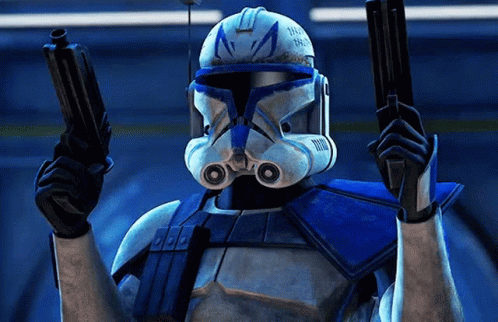
A Bright Soldier of the Republic
At the beginning of the Clone Wars, Captain Rex starts off like any other clone trooper – a soldier that is loyal to the Republic and follows orders. However, as the Clone Wars progresses, Rex starts to see past the illusion of an ideal Republic.
youtube
The YouTube video above has listed down five defining events that make him question everything. These five events are Slick’s betrayal, meeting Cut the clone deserter, the Umbara arc, Ahsoka being framed and hunted down, and Fives’ death. Surprisingly, these events evoke the archetypes each Bad Batch member has.
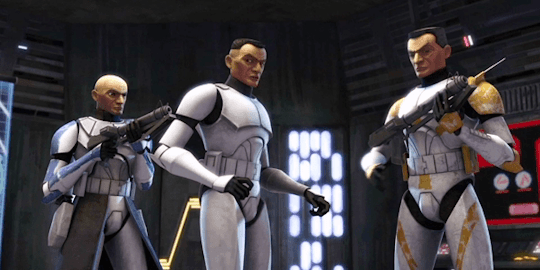
Event 1: Slick’s betrayal
In “The Hidden Enemy”, Captain Rex and Commander Cody are tasked to uncover a spy in their ranks, which turns out to be a clone trooper named Slick. The archetypes evoke from this event are Hades, Hermes and Athena – which are Tech’s archetypes.
When Rex and Cody spot someone running off, they chase him through dark corridors but they lose him amongst other clone troopers in the mess hall. The chase scene gives the feeling that Rex and Cody are in a maze, chasing down someone who bears a similar face as theirs. This feeling evokes the imagery of the Underworld, the realm where Hades rules over.
Slick takes on the Hermes archetype, though he leans more towards its negative aspects. Slick is angry that his clone brothers are being enslaved by the Jedi, and he is fighting for their freedom. He becomes a spy, exposing the Republic’s plans to Ventress, which helps the Separatists to take the Republic forces by surprise. He is able to think ahead of others as he blows up most of the Republic weapons before Rex and Cody can stop him, and he quickly hides in the command center.
To catch Slick, Rex and Cody have to take on the Hermes archetype. They guess that Slick is hiding in the vents and they act out a scene: Cody leaves his blaster on the table while Rex goes to “secure the lockdown”. Slick comes out of the vents and grabs Cody’s blaster. He has fallen into their trap as the blaster is empty and Rex comes up from behind him.
After Rex and Cody manage to apprehend Slick, they bring him to Anakin and Obi-Wan. Slick explains that the Jedi has enslaved his brothers and he is fighting for their freedom. Rex and Cody understand Slick’s intention, but they also point out that he has put his brothers in danger, and that he will not have done that if he truly cared for them. Rex and Cody both take on the Athena archetype as they are loyal to their generals Anakin and Obi-Wan. Although they understand Slick’s intention, they still choose to arrest him for treason.
The moral of this episode is "Truth enlightens the mind, but won't always bring happiness to your heart." Slick, who has a strong Hermes archetype, is able to see the dark truth of the clones. It is said that truth can bring enlightenment, but it does not guarantee happiness. It is possible that Slick feels like he is trapped in the Underworld when he discovers the truth. This leads him to take on the negative Hermes archetype of the trickster.
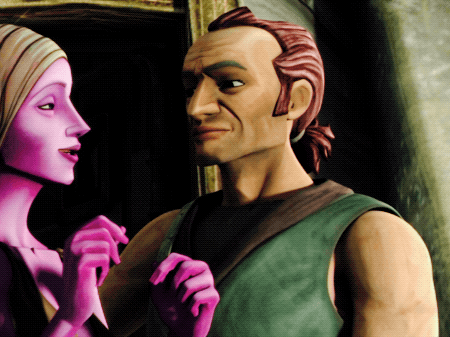
Event 2: Meeting Cut the clone deserter
In “The Deserter”, two surviving commando droids use a sniper rifle to critically wound Rex. To better treat his wound, Kix, Jesse and Hardcase relocate him to a farm that belongs to Suu and her children. Rex then meets Suu’s husband, who turns out to be a clone named Cut Lawquane. The archetypes evoke from this event are Dionysus, Zeus and Demeter – which are Hunter’s archetypes.
Cut takes on the Dionysus archetype. After the First Battle of Geonosis, his transport was shot down and his brothers onboard were slaughtered. Realizing that there was nothing to be done, he ran away and deserted the Republic. The experience still haunts him and he does not want to kill for a living. Cut probably feels that his purpose is lost in that traumatic incident, and he may have wandered around aimlessly until he meets Suu. Dionysus evokes the divine child archetype, which gives a sense of specialness to a person, evoking the personal feeling that “my” life has a sacred meaning. This archetype helps Cut to view all clones as unique individuals, and that they should have a choice in choosing the life they want. His viewpoint is supported by the fact that clones have names to make them feel unique in an army where everyone looks and sounds the same. Moreover, Cut tells Shaeeah that she can do whatever she wants with her life, which shows that his supports his children’s individuality – a Dionysus trait.
Cut also takes on the Zeus and Demeter archetypes. Zeus is associated with oath keepers, and Cut has sworn an oath to his family. Demeter is associated with agriculture, and Cut chooses to be a simple farmer. Cut also serves dinner to his family and Rex, which evokes the Demeter archetype as the food provider. When a platoon of damaged but still-functional commando droids begin to attack the farm, Cut goes on to defend his family, upholding his oath to them.
As Rex prepares to leave, he chooses not to report Cut as a deserter as he respects Cut’s choice for a peaceful life. His decision means that he starts to appreciate the divine child archetype within every clone, even though he still sees the soldier’s life is meant for him.
The moral of this episode is "It is the quest for honor that makes one honorable." Upon first meeting, Rex accuses Cut of being a deserter as he thinks that clones do not have a choice beyond a soldier’s life. To Rex, the quest for honor can only be found in being a soldier. However, after learning what Cut has gone through and hearing his side of the argument, Rex begins to expand his mindset. Upon seeing how Cut is willing to do anything to protect his family from danger, Rex sees Cut being a family man deserves the same honor as any soldier do. Hence, Rex no longer views Cut as a coward for deserting the army, and lets him live in peace with his family.
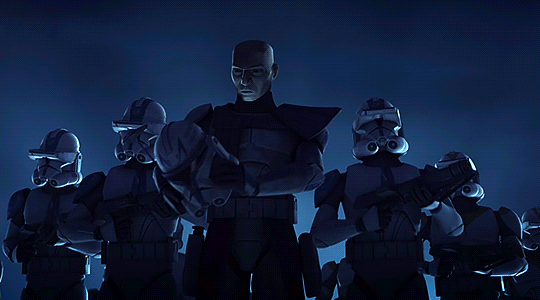
Event 3: The Umbara Arc
In the Umbara Arc, the clones have to deal with General Krell, who mistreats and dehumanizes them. The clones are outraged and seek Rex for guidance. Rex insists on respecting the chain of command as he is hesitant to speak against the Jedi General. However, once the clones find out that Krell is a traitor to the Republic, and he has staged a battle that causes the clones to unknowingly kill each other, Rex then leads the clones to arrest him. This incident causes Rex to realize that people with authority are not always good people, and he learns to trust more of his instincts instead of blindly following orders. The archetypes evoke from this event are Poseidon, Apollo, Artemis and Hera – which are Crosshair’s archetypes.
The clones are fighting on Umbara, a planet that has aggressive wildlife and murky conditions. The undomesticated wilderness of Umbara is associated with Poseidon and Artemis. Throughout the battle, the clones uphold their values of brotherhood and loyalty, which aligns with the Poseidon archetype. The creative aspect of the Poseidon archetype is demonstrated by the clones, most specifically Fives, Jesse, Hardcase and Tup. For example, Tup lures Krell to the carnivorous vixus plant, which causes Krell to be shaken down by the creature and stunned by Tup.
Throughout the arc, Rex keeps insisting the clones to obey Krell’s command despite the Jedi General is mistreating them, which evokes the Apollo archetype. Dogma greatly takes on the Apollo archetype as he follows orders without question. His tendency to follow orders is so great that he has no problem of executing Fives and Jesse for their insubordination, and he tries to stop Rex and the others from pursuing Krell.
On the other hand, Fives takes on the Artemis archetype as he openly and boldly voices his outrage at Krell’s mistreatment towards the clones. He is confident of his identity, saying that he is more than just a number, and that applies to all clones. He carries out his plans without the approval of Krell because he follows his instincts – an Artemis trait.
When Dogma realizes that Krell has betrayed the Republic and the Jedi General has taken advantage of his blind loyalty, Dogma takes on the spurned Hera archetype. He finds that all his loyalty and sacrifice have meant nothing to Krell, and he ends up killing Krell out of revenge (this also evokes the Poseidon archetype as the implacable enemy). Thankfully, as Dogma is taken into custody, he receives a nod of affirmation from Rex for his act.
There are four morals for the four-episodes arc.
"The first step toward loyalty is trust." – Loyalty means everything to the clones, which is also valued by Poseidon, Apollo, Artemis and Hera.
"The path of ignorance is guided by fear." – Rex is afraid of speaking against Krell and he tells the clones to obey his commands. His fear has led him to be ignorant of Krell’s true intentions.
"The wise man leads, the strong man follows." – Apollo is more of a follower, and he needs a wise man to lead him. The clones all take on the Apollo archetype, and they are in need of a wise general to lead them (and Krell is not that person).
"Our actions define our legacy." – There are times where our actions define our legacy, so we must make the right decision. When Fives and Jesse are ordered to be executed, the clones intentionally miss, indicating that they choose brotherhood over following orders that are clearly wrong, and they trust their instincts (positive Poseidon and Artemis traits). When Dogma realizes that Krell has taken advantage of his blind loyalty and has fooled him into killing his own brothers, he kills Krell as an act of revenge (negative Poseidon and Artemis traits).
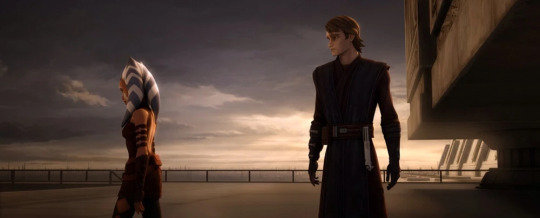
Event 4: Ahsoka being framed and hunted down
When numerous acts of terrorism against the Jedi Temple on Coruscant have been committed, Ahsoka is being accused for those attacks. Ahsoka is in fact innocent and wants a chance to prove her innocence, but the Republic is unwilling to give her that chance. Ahsoka then flees to the Coruscant undercity, and the clone troopers pursue her and they are given shoot-to-kill orders. Rex and Anakin know that this is not right as they trust Ahsoka, and they do everything to bring her in alive. Rex realizes that everyone is disposable in the eyes of the Republic for they only care about the results. When Ahsoka is eventually proven to be innocent, it only reinforces Rex’s belief that the Republic does not care about its people. The archetypes evoke from this event are Ares and Aphrodite – which are Wrecker’s archetypes.
Anakin is very protective of his Padawan Ahsoka, and he is willing to do anything to defend her and prove her innocence, which is similar to how protective Ares is to his children in Greek mythology. Anakin seeks out Ventress for information, and warns her that he will kill her if she is lying. Then, he finds out that Barriss Offee is behind the attacks, and he manages to arrest her and prove that Ahsoka is innocent. Besides Anakin, Rex also believes that Ahsoka is innocent. He disregards the shoot-to-kill orders, and does everything in his power to bring her in alive. His protectiveness towards Ahsoka is an Ares trait.
In this four-episodes arc, Ahsoka takes on a heroine’s journey that is similar to Psyche, who mainly has the Aphrodite archetype. The Psyche myth serves a metaphor for the psychological growth that a heroine may go through. In this myth, Psyche was a pregnant mortal woman who wanted to be reunited with her husband Eros, God of Love and Aphrodite’s son. The four tasks that Aphrodite gave to Psyche symbolize specific skills that a heroine must develop, especially if they are more emotionally and instinctively connected to others.
The first task Aphrodite gave to Psyche was to sort each kind of seed or grain into its own pile before evening. This task involved an enormous pile of seeds jumbled together, and it seemed impossible until the ants came to help. The task of “sorting the seeds” symbolizes a person’s need to turn inward and sift through their emotions, values and motives to find what is important to them. When Ahsoka is framed for the bombing at the Jedi Temple and for Letta Turmond's death, she flees the scene, knowing that almost everyone will not believe in her innocence. She escapes to the Coruscant underworld to sort out her problems by herself. The moral "Sometimes even the smallest doubt can shake the greatest belief" points to Ahsoka’s growing doubts of a confusing situation where she is framed for the crimes she has not committed. Her doubts shake her beliefs in the Republic and the Jedi Council. Hence, Ahsoka must learn to “sort the seeds” in order to gain clarity of the situation.
The second task Aphrodite gave to Psyche was to acquire some golden fleece from the terrible rams of the sun. A green reed advised Psyche to wait until sundown, when the rams would sleep. Then, she could safely pick strands of golden fleece off the brambles against which the rams had brushed. This task symbolizes a person’s need to acquire power without destroying themselves. Even though Ahsoka knows that the Republic and the Jedi Council have turned against her, she still remains compassionate. She helps a child to escape from a falling elevator. She is able to convince Ventress to help her prove her innocence instead of turning her in for the bounty on her head. She chooses not to kill a squad of clones led by Commander Wolffe despite knowing that they are here to arrest her. The moral "Courage begins by trusting oneself" points to Ahsoka’s trust on herself has given her the courage to face the harsh reality, and she does not become hardened or cynical by it (not “trampled underfoot by the rams”).
The third task Aphrodite gave to Psyche was to fill a crystal flask with water from a forbidding stream, which was etched deeply into a jagged cliff and guarded by dragons. An eagle came to her aid, symbolizing a person’s need to develop some emotional distance on their relationships. Ahsoka makes contact with her friend Barriss Offee, hoping that she can help her to prove her innocence. Barriss tells Ahsoka about a warehouse where the nano-droids are stored, which are used to bomb the Jedi Temple. Ahsoka heads to the warehouse to investigate, not knowing that she has fallen into a trap that Barriss has set up to frame her for the bombing at the Jedi Temple. When Barriss is arrested by Anakin and she confesses her crimes, Ahsoka is shocked at the betrayal. The moral "Never become desperate enough to trust the untrustworthy" becomes important to Ahsoka as she must learn to establish some emotional distance on her relationships – this includes her friendship with Barriss, and her temporary alliance with Ventress.
The fourth and final task Aphrodite gave to Psyche was to descend into the Underworld with a small box for Persephone to fill with beauty ointment. A far-seeing tower warned Psyche that she would encounter people who would ask her for help, and three times she would have to ignore their pleas and continue on with her journey. If she failed to do so, she would get stuck in the Underworld forever. This task symbolizes a person’s need to exercise choice by learning to say “no”. After Ahsoka is proven innocent, the charges against her are dropped, and the Jedi Council apologized for their actions. The Council asks Ahsoka to rejoin the Jedi Order, claiming that this was her "great trial", making her a true Jedi. Ahsoka exercises her choice by refusing their offer and leaving the Jedi Temple. She knows that she cannot go back, knowing that the people she trusted have failed her. No matter how much Anakin pleads for her to reconsider, Ahsoka chooses to stand firm with her decision, saying that this is something she must work through on her own. By leaving the Jedi Order, Ahsoka can finally determine her own life course. Although the future seems bleak for Ahsoka, the moral "Never give up hope, no matter how dark things seem" indicates that she has made the right decision, and that she will be alright in the future.
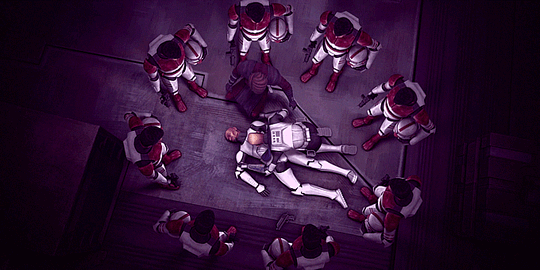
Event 5: Fives’ death
When Tup succumbs to a mysterious mental disorder that results in the death of a Jedi Master, Fives is determined to uncover the truth. His investigations lead him to discover a conspiracy regarding the inhibitor chip hidden in the brains of clone troopers. Nala Se claims that the chip is meant to restrain the clones from violent, unpredictable action. Fives does not believe her, and he manages to convince Jedi Master Shaak Ti to allow him to plead his case directly to Supreme Chancellor Palpatine on Coruscant. However, his plan falls apart when he is accused of attacking the Chancellor. Fives informs Anakin and Rex about the plot against the Jedi, in which the inhibitor chip in every clone will be used to force the clones to kill their Jedi Generals. However, Anakin and Rex struggle to believe in him. Fives is then shot and he dies in Rex’s arms. The archetypes evoke from this event are Hephaestus, Hestia and Persephone – which are Echo’s archetypes.
When Tup's results come back negative for a virus, Shaak Ti wants an atomic brain scan to be done on Tup. However, Nala Se want to terminate the clone and do an autopsy. Fives is determined to find out the truth and he needs AZI to perform an atomic-level brain scan on Tup. AZI tells Fives that he cannot do that because it is against Nala Se’s orders. Fives then informs AZI that as a medical droid, his duty of saving a patient's life overrides all orders. Fives’ reasoning manages to convince AZI and he does an atomic-level brain scan on Tup. This is how they discover a tumour in Tup’s brain, which later turns out to be an inhibitor chip. Fives’ ability to convince AZI to disregard Nala Se’s order shows that Fives knows the protocol of medical droids very well and can find loopholes to break the system, which is something Echo does as it is a trait of the Hephaestus archetype.
When Fives discovers from AZI that he is about to get his memory erased, he quickly escapes from the clone security guards. He puts on a disguise as he sneaks into Kamino’s Genetic Records Hall and then the embryo room to discover the truth. Right now, Fives takes on the Persephone archetype, disguising himself as a regular clone trooper to gain access to certain rooms, and even finding alternate routes to evade capture.
Even though the whole world is against him, Fives is determined to expose the truth about the inhibitor chip to Anakin and Rex. Right now, Fives takes on the Hestia archetype as he firmly believes that what he is doing is the right thing to do, even if he gets killed or that nobody believes in him. The morals "The truth about yourself is always the hardest to accept", "The wise benefit from a second opinion", "When in doubt, go to the source", and "The popular belief isn't always the correct one" are all associated with Hestia – the need to turn inward, seek the “Self” for advice, and stay firm in one’s values and beliefs. Fives is able to do all of these until he dies.
Due to the effects of the inhibitor chip, Tup is experiencing Order 66 as a “nightmarish mission” and he claims that he is free from it upon his death. It seems that upon activation, the inhibitor chip sends Tup into a dark place (or the Underworld), turning him insane and eventually claiming his life. When Fives digs deeper into the truth about the inhibitor chip, he ends up “descending into Underworld” as the conspiracy begins to haunt him. Fives is treated like a mad person when he tries to tell Anakin and Rex about the truth, as if he has slipped into psychosis – in which Persephone people are susceptible to. As Fives dies in Rex’s arms, he claims that his missions and nightmares are finally over – as if his soul now descends into the Underworld and resides there – just like what has happened to Echo.
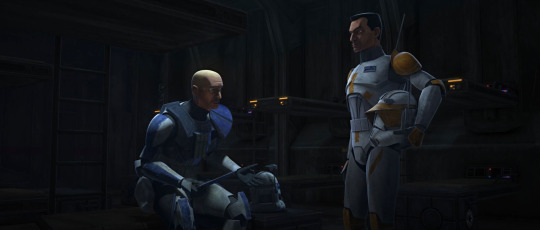
Slipping into Depression
Fives’ death is the last straw for Rex. He tries to send a grievance report about Fives but upon realizing that the truth does not matter, he encrypts the report instead. His idealized viewpoint of the Republic has been shattered. The losses add up and now he slips into depression, feeling that his duty as a soldier is meaningless.
Rex means “king”, and now the king is wounded. In myths and legends, as long as the king’s wound remains unhealed, his kingdom will stay as a desert wasteland where nothing grows or thrives. The effect of Rex’s emotional wound can be seen during the Battle of Anaxes. Anaxes is one of the Republic's largest shipyards, and it is under attack from Separatist forces led by Admiral Trench. After weeks of heated battle and mounting losses, the Republic is losing its grip on Anaxes. The situation gets worse when the Separatists captures the main production facility for the Republic's battle fleet, impairing the generativity of the Republic forces. Captain Rex suspects that the battle droids are learning his strategy to the point that the Separatists can perform specific counterattacks. Commander Cody fears that the Republic could suffer more severe losses if the Separatists have figured out how to counter Rex, who is one the most talented officers the Republic has. Rex is suffering from a lack of creativity as he struggles to lead the Republic to victory.
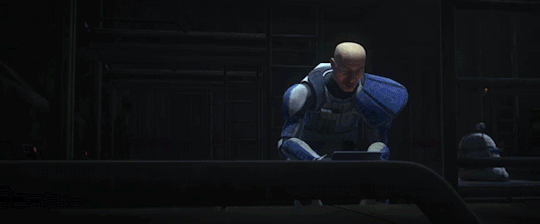
Moreover, Rex retreats in the barracks and stares at an old picture of him, Cody and the two ARC Troopers Echo and Fives. He laments their deaths and the losses suffered by the Republic forces. Rex views all of their sacrifices and loyalty mean nothing, and he is depressed. Although he has a feeling that Echo is alive, he does not want to tell the Jedi since they may think that he is crazy. Even Anakin notices that Rex has something else in his mind, but Rex refuses to say. He is isolating himself from others.
Cody is aware of Rex’s emotional wound and he understands how Rex feels. Cody calls in Clone Force 99, believing that their unique skills and their 100 percent success rate will be helpful for Rex in the Battle of Anaxes. I interpret this scene as a friend or a loved one introducing you to professional help.
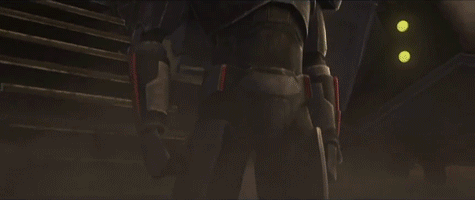
The Bad Batch Arc: Rex’s Healing Journey
At first, Rex is hesitant to meet Clone Force 99 because he has heard of their aggressive and unorthodox ways of completing their missions. However, as he embarks on a journey with them, he ends up appreciating them and viewing them as one of the finest soldiers he has ever met. I interpret the Bad Batch acting as guides or therapists to Rex, sending him on a path of individuation that will heal him.
The Geography of Rex’s Journey
Throughout the four-episodes arc, there are a few places that serve as a metaphor for the mind. Fort Anaxes, where the Jedi Generals and the clones discuss their plans, represents the conscious realm, where logic and willpower rule over. The wilderness of Anaxes represents the realm of emotions, instincts and memories – one part of the unconscious realm. Skako Minor represents the Underworld for Echo and Rex – the personal unconscious realm. Admiral Trench’s fleet above Anaxes represents another Underworld – the collective unconscious realm.
“The Bad Batch”: Remembering Oneself
Based on my interpretation, when Rex meets the Bad Batch, he is reminded of the events that have made him question everything: Tech reminds him of Slick’s betrayal; Hunter reminds him of Cut the clone deserter; Crosshair reminds him of the Umbara Arc; Wrecker reminds him of the time Ahsoka was framed and hunted down. Echo is not present because Fives’ death is a traumatic event that Rex has repressed it – just like Echo is trapped on Skako Minor.
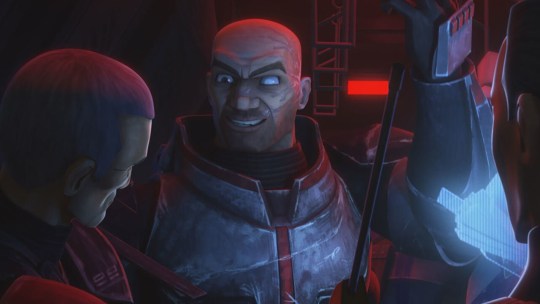
Wrecker, who has the Aphrodite archetype, helps to make the Bad Batch look less intimidating to Rex, Jesse and Kix. He is the first one to take off his helmet, creating an engaging and charming impression of the team. I imagine Wrecker being a therapist will involve getting you to meet new people for engagement, or getting you to do some creative work. In this four-episodes arc, Wrecker is helping Rex to engage with the Bad Batch, which allows him to expand his horizons and to see the Bad Batch as who they truly are.
As the clones depart for the Cyber Center, they have to travel through the wilderness of Anaxes because their gunship has been shot down by battle droids. They have to leave Fort Anaxes, which symbolizes leaving the conscious realm and entering the unconscious realm. Since the wilderness represents the realm of emotions, instincts and memories, this means that the Bad Batch’s aggressive tactics are more useful in battle. Moreover, this realm is associated with Poseidon, Artemis, Ares and Aphrodite because these archetypes are motivated by emotions. These archetypes are associated with Crosshair and Wrecker, and they play a major role in guiding Rex on this leg of journey. Hunter, who has the Dionysus archetype, is also associated with the wilderness, which allows him to bring the clones to the Cyber Center. Tech, who has the Hermes archetype, acts as a guide that helps the clones to move between realms.
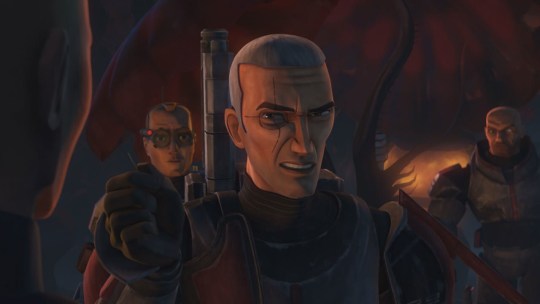
With Cody injured and unable to continue on, Rex decides to take charge of the mission. This leads Crosshair to point out why Cody has to call the Bad Batch in for this mission if Rex’s plans are so good. Crosshair has the Apollo archetype, which grants him the clear-sightedness to see through the blind spots that Rex is unaware of. Although Crosshair sounds rude to Rex, he is being blunt and brutally honest. In fact, Crosshair is helping Rex to recognize that something is wrong with him, which will enable him to start his healing process. I imagine Crosshair being a therapist will bluntly point out all your blind spots, so you can become aware of your problems and start healing.
Of course, being in the realm of emotions and instincts also means having a risk of being overwhelmed by those intense emotions. Soon enough, tension rises between Wrecker, Crosshair, Jesse and Kix, which almost escalates into a fight. Fortunately, Hunter, who has a Zeus archetype, is able to think above his emotions. He stops the fight and reminds everyone that they are all on the same side. He then lets Rex take charge of the mission.
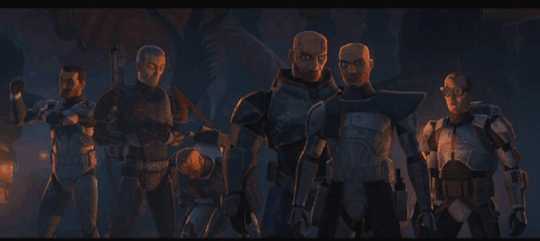
Thanks to Crosshair’s Apollo archetype, Rex recognizes his lack of creativity has become a major problem for the Republic’s forces in the Battle of Anaxes. For healing to take place, Rex must encounter new experiences with the openness of a child and the ineptness of an amateur. Inspired by Wrecker’s Aphrodite archetype, Rex’s experiences with the Bad Batch help him to regain and improve his creative skills. When Rex plans to take over a Separatist outpost, he takes a page from the Bad Batch’s strategy, which helps the clones to quickly overwhelm the droids and capture its command and communication center. This aggressive strategy is also implemented in capturing the Cyber Center. These victories show that Rex is starting to “find his harmony and bliss” as he is now on the right path. He is expressing his gifts as an experienced clone captain in a manner that is consistent to his personal values – to help the people he cares about. He is “finding his own myth”. The moral "Embrace others for their differences, for that makes you whole" becomes important for Rex in his path to individuation. Only when he is able to embrace the Bad Batch for their differences can he achieve “wholeness of the Self”. This moral is prevalent throughout the four-episodes arc.
As Rex continues on his journey of self-discovery, he begins to delve deeper into his unconscious, where he finds “whomever” he has buried and split off from his conscious awareness and left in the past is still alive. This dismembered “whomever” is Echo. When the clones take over the Cyber Center, Tech hacks into the computer system and discovers Rex’s algorithm. Strangely, it is not stored inside the center's memory banks but is instead being broadcast from another planet called Skako Minor. Tech, who takes on Hermes the guide of souls, digs deeper and receives an audio signal which sounds like a human voice. He drops the voice masking and it turns out to be the voice of a clone trooper. The voice responds “CT-1409” repeatedly, and Rex realizes that it is Echo’s identification number, which means Echo is alive.
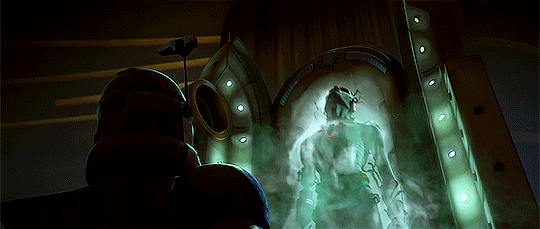
Rex is glad to know Echo is alive, but he feels guilty for leaving Echo for dead in the Citadel. The guilt he feels from that specific memory must have been repressed in his unconscious for so long. According to Jean Shinoda Bolen, whatever is dismembered and buried through repression is “buried alive”, so when it is uncovered, it exists as it was. Echo is currently trapped in a stasis chamber – as if he is “buried alive”. When Echo is released, he does not remember much and he does not know how he has gotten to Skako Minor. The memory that keeps repeating in his head is his last mission to the Citadel – a traumatic memory that is still fresh in his mind. As Rex is starting to uncover his feelings and remember who he once was, Echo’s voice calling out to him is like “whomever” is “buried alive” in Rex’s unconscious is begging to be “heard” and be “resurrected”. For Rex to heal himself, he must rescue Echo and “bring him back to life”.
Whatever is found in the unconscious must be brought into the consciousness to be known, this means Rex must the startling discovery that Echo is alive back to the Jedi Generals at Fort Anaxes. The clones are forced back into the Cyber Center as the heavy droid reinforcements begin to overwhelm them, which can serve as a metaphor of overwhelming emotions are starting to engulf Rex’s mind. This makes sense because Rex is so shocked to find that Echo is alive that he briefly ignores Hunter telling him they need to leave. Thankfully, Crosshair has secured a speeder craft and he is able to bring all the clones out of there. Right here, Crosshair is like Poseidon driving his golden chariot drawn by white horses over the waves, which stops the storms. His action of bringing the clones out of the Cyber Center can be interpreted as “bringing calmness and peace to them”. Besides the Poseidon archetype, Crosshair is also acting like Apollo, who has a connection to the distant realm of the Hyperboreans, as he brings the clones back to Fort Anaxes, which is a metaphor of the conscious mind (where Apollo resides).
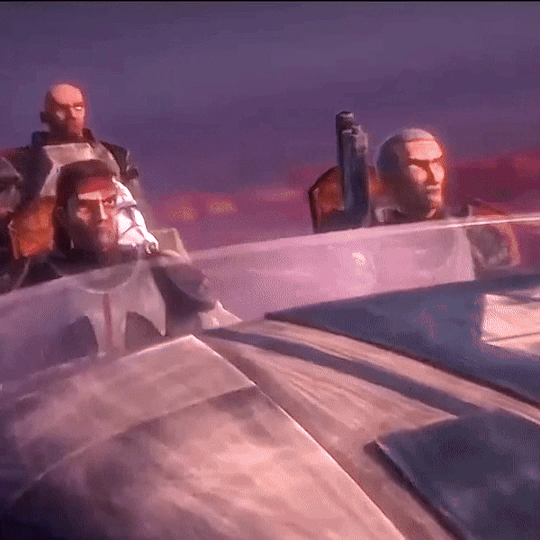
“A Distant Echo” and “On the Wings of Keeradaks”: Rescuing What was Lost
At Fort Anaxes, Anakin, Rex and Hunter are waiting for permission from the Jedi Council to embark on a rescue mission to Skako Minor in search of Echo. However, the Jedi Council denies the permission, which serves as a metaphor of the consciousness denying any access to the unconscious realm. This makes sense because we have been made to be afraid of our unconsciousness, where our repressed thoughts and feelings, traumatic memories, parts of us that we are ashamed of or being deemed as unacceptable, and untapped potentials reside. In a patriarchal society where its culture and identity align with Zeus and other sky gods (the consciousness), the unconsciousness (or the Underworld) is depicted as a fearful, hellish place rather than a source of riches (like Hades as Plouton or Pluto, the rich one).
Rex is insistent that if they are going to get permission, they should leave immediately. Even though they do not get the permission, they still proceed with the mission. At this moment, Rex is committed to follow his instincts and heart because he truly believes that Echo is alive. It takes courage to act upon what is true for you, no matter how risky it will be. By leaving the board road that has been travelled by others, which is being a good soldier that follows orders, Rex is living his own personal myth. This is also supported by a deleted scene where Obi-Wan points out to Rex that it is unusual for him to disregard authority.
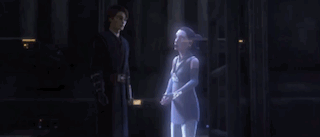
Anakin is worried that Rex is letting his personal feelings drive him too much on the rescue mission. Not knowing what to do, Anakin seeks out advise from his secret wife Padme Amidala, who serves as a metaphor of the anima, the unconscious feminine side of a man (which is devalued in the patriarchy). Carl Jung believes that a man’s anima affects his moods, emotional bonds, and how he perceives women. Anakin explains the situation to Padme, and she points out that Rex may have learned from Anakin to let his emotions be his motivator. She advises Anakin that he should support Rex's instincts on this mission, since Rex has always done the same for him. Anakin respects Padme’s wisdom, and he decides to proceed the mission even though Obi-Wan has come to report that the Jedi Council has denied permission to go forward with it.
It is worth noting that Echo has a Persephone archetype, which serves as the anima to all clone troopers. However, Echo is currently confined on Skako Minor, just like Persephone is trapped in the Underworld. In the Greek myth, winter comes when Persephone is in the Underworld. This myth serves as a metaphor for Rex’s current status – he is experiencing the lack of vitality as he is in his “winter” period. The anima can be described as “the soul” that brings vitality to a person’s life. For Rex to revitalize himself, he must bring Echo out of Skako Minor, which mirrors the myth where Hermes brings Persephone out of the Underworld and restores her to her mother Demeter.
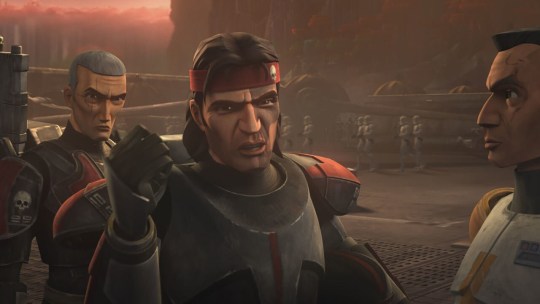
Although Hunter thinks that Skako Minor could be a trap, he is willing to lead the Bad Batch to help Rex and Anakin, mainly to ensure that they will be able to leave safely if the mission goes wrong. Hunter, who has the Dionysus archetype, encourages Rex to disobey orders and continue on with the mission. After all, this journey to Skako Minor can help Rex to become a hero – breaking away from his designated role as a soldier of the Republic. I imagine Hunter being a therapist will encourage you to follow your heart and break free, even if that means going against expectations that weigh you down, or leaving behind your stale life. Furthermore, by accompanying Rex on this mission, Hunter (who has a Demeter archetype) has initiated Rex into the Eleusinian Mysteries, which were rituals that celebrated the return of Persephone (Demeter’s daughter) from the Underworld, leading to spring. This initiation into the Eleusinian Mysteries ensures Rex will have a safe return from Skako Minor.
Rex, Anakin and the Bad Batch head to Skako Minor, which serves as a metaphor of a voluntary descent into the Underworld – an essential part of a hero’s journey. Tech, who has the Hermes archetype, becomes the guide of souls and the rescuer of the child. Moreover, Tech has the Hades archetype, which means he is familiar with the Underworld, and he can help Rex to discover riches from this journey. As the guide of souls, Tech safely lands the Marauder on the planet’s surface. They encounter the native inhabitants called the Poletecs, who choose to cut away from the outside world for they do not want to be involved in the Clone Wars. They are like the inhabitants of the Underworld, separated from the outside world. Since the Poletecs only speak in their own language, Tech acts as Hermes the god of speech, and becomes a translator.
The Poletec chief leads Rex, Anakin and the Bad Batch to Wat Tambor’s city Purkoll (which contains many rooms and corridors like a maze – an imagery of the Underworld). During the journey, Tech loses Echo’s signal, leading almost everyone to fear that Echo is actually dead and the Separatists are using him to lure them into a trap. While Rex is confident that Echo is alive, Anakin advises him that they should be ready for a possibility that Echo is dead. Rex understands Anakin’s concerns, but he refuses to give up hope. Since Tech also does not believe that Echo is dead, it is possible that he is affirming Rex’s belief. This makes sense because Hermes is described as the “inner guide”, “inner voice” or “inner self-helper”. This archetype plays an important role in one’s individuation journey as it helps a person to dive deep into their unconscious mind and find the pieces of themselves to be brought back to light (or the conscious mind). Since Hermes is the rescuer of the child, this archetype is tasked to find what was personally repressed in a person, and to resurrect archetypes that have been culturally buried. I imagine Tech being a therapist will involve helping you to recover the parts of you that have been repressed or lost, so you can feel whole again and that your life has meaning once more.
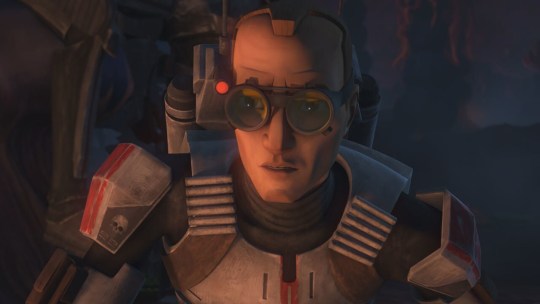
The moral "The search for truth begins with belief" is taken up by Rex. He strongly believes that Echo is alive, which leads him to search for the truth. The search for truth is an essential part of the individuation journey for it leads a person to experience harmony and bliss as their actions begin to align with their personal values. Rex, who has lost so many of his brothers, finds hope when he discovers that Echo is alive, and he is not going to leave Echo behind (unlike that time in the Citadel). His determination to rescue Echo and keep holding onto hope eventually pay off when he and Tech manage to safely release Echo from the statis chamber and the computers.
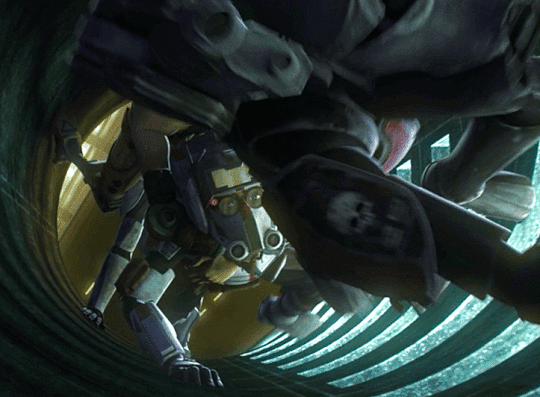
However, Rex, Anakin, Echo and the Bad Batch are not out of the woods yet. They are now surrounded by battle droids and they cannot call for reinforcements because their mission is unsanctioned. Just like the heroes need to leave the Underworld and return to the living world, a person cannot stay too long in the unconscious mind or they may not return to reality (the conscious mind). The moral "Survival is one step on the path to living" is important to Rex, Anakin, Echo and the Bad Batch. They must survive Skako Minor (the Underworld) if they have any hope of returning to Anaxes (the living world).
Fortunately, Echo, who has the Hestia archetype, is able to spend his unchosen solitude to gain access to the Techno Union’s database while they are using his memories to counter the Republic’s forces. With that, Echo leads Rex, Anakin and the Bad Batch through an exhaust pipe above the chamber to escape. He also brings the team to a long narrow pipe that leads to a building with a landing pad as a means to escape. Echo’s ability to guide Rex, Anakin and the Bad Batch across Purkoll indicates that his Persephone archetype has transitioned from Kore (nameless maiden) to Queen of the Underworld. He becomes their guide to the Underworld for he is no longer afraid of this dark realm they are in.
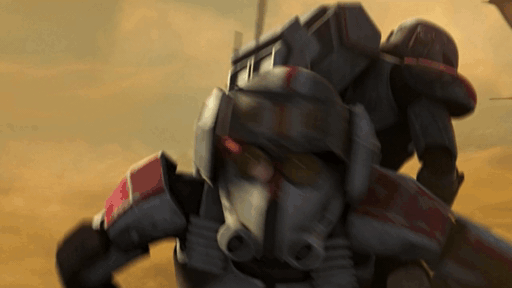
As Rex, Anakin, Echo and the Bad Batch try to cross the pipe, they are trapped by D-wing droids on both sides. Crosshair loses his balance and nearly falls, but Wrecker pushes past his fear of heights to save him – which is a good sign because heroes have to face their fears in the Underworld, and they can leave the Underworld if they succeed. Tech takes on Hermes the alchemist as he uses a recording to summon several keeradaks, allowing all of them to escape. They return to the Poletec village they have encountered earlier in their journey. The Poletec chief is impressed that they have managed to tame the Keeradaks but is displeased that they have returned to his village, bringing the war with them. Rex apologizes for breaking their promise and he gives a speech denouncing the Techno Union. He even shows them the cybernetic prosthetics that the Techno Union have inflicted on Echo. Rex’s inspiring speech manages to convince the Poletecs to join forces with them to fend off the Separatists, which can be seen as a gift of Hermes (considering that Tech acts as a translator between both parties). Besides Hermes, Rex establishing an alliance with the Poletecs can be seen as a gift of Athena, which is one of Tech’s archetypes. It can be interpreted that Tech is helping Rex to heal and return as a great leader.
The clones, Anakin and the Poletecs successfully defeat the droid army, which means the heroes can now safely leave Skako Minor (or the Underworld). Rex tells Echo that when they get back it will be just like "old times", but Echo doubts it. After all, Echo has been turned into a cyborg and he has been tortured by the Separatists – his body and mind have gone through unspeakable horrors. Yet, his soul remains intact, and he holds a glint of hope for the future.
“Unfinished Business”: Integration and Homecoming
In ancient times, a traveller might visit the temple of a god or goddess to ask for help or to pay respects to the deity. On our life journey, we will encounter archetypes that take on various forms. As we enter the “temple” of a particular archetype, an unseen archetype is present too – which is Hestia. Hestia is the Goddess of the Hearth and Temple. She was the fire at the centre of a round hearth – resembling an image of a mandala that symbolizes the archetype of the Self, which Carl Jung described as the centre of our personality that brings wholeness and meaning. When you are doing something that gives you a sense of meaning, in which you feel a deep connection to who you really are, an archetype will be activated in you, and it will relate to the Self. This helps you to live an authentic life because you are consciously aware of your relationships to one or more activated archetypes, and yet, you feel centered like Hestia, who provides clarity and certainty that there is a sacred dimension in your life.
Echo is now brought back to Fort Anaxes, where he undergoes healing. His return serves as a metaphor of whatever is from the unconscious has been brought into the light or the consciousness. Since anything from the unconscious has been made to be supressed, it is natural for the conscious mind to be wary of their presence in the consciousness. However, healing can only take place when the conscious and the unconscious are integrated. Due to Echo’s horrifying experiences in the hands of the Separatists, it is natural to have lingering questions of his true loyalty and uncertain future. The Bad Batch, or more specifically, Hunter and Tech, do not trust Echo. However, Rex has known Echo for a long time, and he can see that Echo’s spirit remains intact despite the horrific experiences. Hence, Rex trusts Echo, which serves as a metaphor for a person to trust their unconscious mind, believing that it does care for their wellbeing.
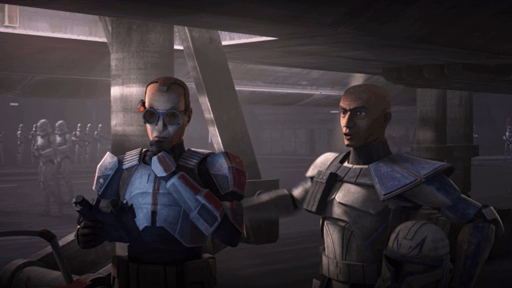
In Jungian psychology, it is believed that self-sabotage is a result of your unconscious trying to inform your consciousness that what you really need is not what you think. For example, perhaps you are saving money to buy a place far away from everyone so you can live in solitude, but every time you want to purchase a house, you find that you have self-sabotaged your plans. This may be a sign that your unconscious mind is telling you that you actually yearn to have connection with people. If you want to stop the self-sabotage, you must stand in between your consciousness and your unconscious – taking on the archetype of the Self. You must understand why your unconscious or Shadow is doing this to you, while not letting it consume you (with your consciousness or Ego acting as a guard). By integrating your consciousness and your unconscious, you can set out a solution that is personally satisfying for all parts of you, which by referring to the above example, it would be to buy a house that surrounds you with nature (the desire for solitude) but still provides a short distance for you to connect with other people (the desire for connection).
The moral "Trust placed in another is trust earned" is taken by Rex. Echo has earned Rex’s trust through his work, dedication and integrity back when he was on the 501st. Hence, Rex places his trust on Echo, believing that his fellow brother can secure a Republic victory on the Battle of Anaxes even though he has not fully recovered yet. Echo, who has the Hephaestus archetype, channels his pain and trauma into helping the Republic to win against the Separatists. Echo is aware that the Republic’s production of battle fleets has been wounded by the Separatists, just like how the Separatists have wounded him. Just like Hephaestus the crippled craftsman, Echo is motivated to do the right thing, because if he can help the Republic to reclaim Anaxes and get the production facilities running again, then he can heal himself too.
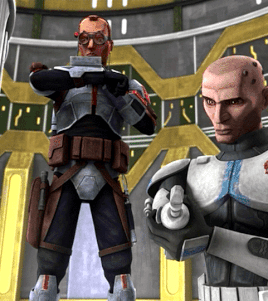
Rex, Anakin, Echo and the Bad Batch depart Anaxes and fly to the Separatist fleet, it serves as a metaphor for them entering the Underworld. Skako Minor is the personal Underworld, while Admiral Trench’s fleet above Anaxes is the collective Underworld. Taking on the Hermes archetype, Echo is able to trick the battle droids to allow them to dock with the Separatist dreadnought, where Admiral Trench is located. Once the heroes board the main ship, they infiltrate the dreadnought's interface unit. Unaware of the recent events on Skako Minor, Admiral Trench orders his tactical droid to contact Skako Minor for Echo's algorithm. Echo plugs into the interface unit just in time when the tactical droid makes contact on Skako Minor. Admiral Trench is currently above Anaxes, as if he rules over the sky domain, which represents the consciousness. He gets the algorithm from Skako Minor, which represents the unconscious. The interface unit where Echo plugs into is a round shape, resembling the round hearth of Hestia. Right now, Echo is taking on the Hestia archetype, representing the Self that stands in between Admiral Trench’s fleet (the consciousness) and Skako Minor (the unconscious). Echo tricks the Admiral to mobilize all troops to the assembly plant and then he issues a feedback pulse that shuts down all of the Separatist droids, leading the Republic to victory.
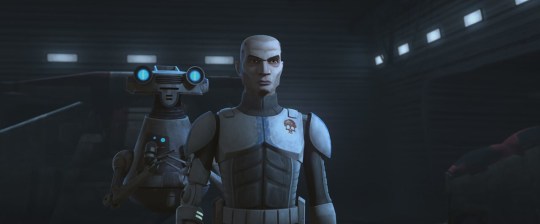
To connect with the Self and hold onto one’s centre, one must learn not to succumb to the intellectual and emotional forces, just like the myth where Hestia resisted the advances from Apollo and Poseidon, and took an oath of eternal chastity. For Echo, he faces Rex dissuading him from joining the battle due to his poor physical condition, the distrust from Hunter and Tech, and the trauma caused by the Techno Union. However, he is not affected by these things as he seeks to uphold his personal value to help others, keeping his centre intact. I imagine Echo being a therapist will encourage you to discover your personal values and act upon them, for you will find personal satisfaction, wholeness and meaning in life.
Admiral Trench and Anakin Skywalker are examples of how one can stray away from the Hestia archetype. Admiral Trench is arrogant as he trusts too much on the algorithm to lead him to victory. He leans too much on the intellectual forces, which are represented by Apollo. His overconfidence leads to his downfall when he does not expect the algorithm to fail. Unwilling to admit defeat, he activates a bomb in the assembly plant's fusion generator, which will blow up most of the planet and lead to many deaths. On the other hand, Anakin Skywalker confronts Admiral Trench and demands the final number in the sequence to disarm the bomb. Admiral Trench taunts Anakin, thinking that he won’t hurt or kill him because the Jedi are noble, in which the Admiral views it as a weakness. Anakin responds by severing the Admiral’s left set of arms, and claims that he has no such weakness like nobility. Anakin’s actions are emotionally driven, and it gets to the point of disregarding the values of the Jedi. The emotional forces, represented by Poseidon, has overtaken Anakin.
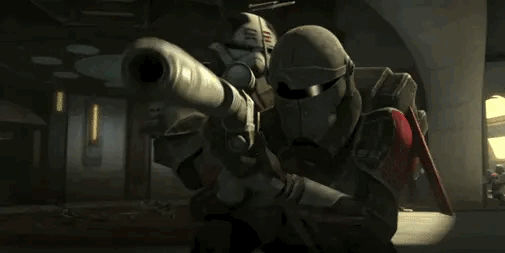
Wrecker and Crosshair are examples of how one can stay true to themselves while doing their job. Wrecker takes on the Ares archetype as he charges at the droids and manages to rip them into pieces. Wrecker is more emotionally inclined and this is evident in his cheering and shouts as he takes down the droids. He feels true to himself in that battle – as if Hestia is present with his Ares archetype. As for Crosshair, he takes on the Apollo archetype as he places reflecting mirrors on the wall to make a perfect trickshot to mow down a platoon of battle droids. Crosshair is more intellectually inclined with his sharpshooting expertise. He feels true to himself when he pulls off the trickshot perfectly – as if Hestia is present with his Apollo archetype.
Having accomplished the mission, Rex, Anakin, Echo and the Bad Batch leave on the Marauder. Anakin gives Wrecker a remote detonator to blow up Admiral Trench’s fleet. The colourful explosions may be a symbolism of wholeness, which is the end goal of this journey of individuation. No matter how far this journey has been taken, every traveller looks forward to an eventual homecoming. Back in Ancient Greece, home was made sacred by Hestia’s presence in the fire at the centre of the round hearth. The fire was lit up to welcome a returning family member or a newborn. This ritual of acknowledgment and welcome—of homecoming—consciously recognizes new life as part of the whole. In psychological terms, “home” is where we connect with a spiritual centre – a sacred place of homecoming due to Hestia’s presence.
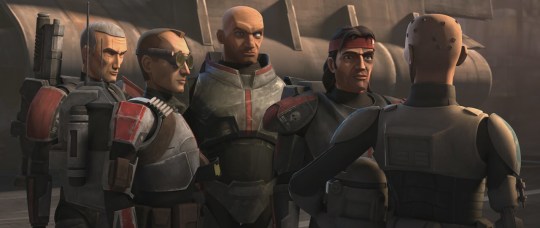
Upon returning to Anaxes, Rex, Echo and the Bad Batch are praised for their courage and skills. The Jedi also tell the clones that they will be awarded with medals on the ceremony. However, the Bad Batch does not want to attend the ceremony because recognition and achievements are not their thing. In fact, they just enjoy the thrill of the adventure and they just want to help people. Hunter sees that Echo has a different path like theirs, and offers him to join the Bad Batch if he does not feel like he fits in with the regular clones anymore. Rex acknowledges the Bad Batch’s individuality, and Echo’s too. Rex encourages Echo to go with the Bad Batch because he respects his individuality. With that, the fire at the centre of the round hearth has been lit, indicating a homecoming. For Rex, his homecoming is Echo’s return. For Echo, his homecoming is being welcomed into the Bad Batch. As Rex turns around, he sees Echo and the Bad Batch salute, which serves as a metaphor of Rex finally achieving “wholeness” with all archetypes finally integrated into one. Now, Rex finally sees himself resembling the five members of the Bad Batch – a great leader like Hunter, a creative strategist like Tech, a passionate fighter like Wrecker, a loyal brother like Crosshair, and a wise sage like Echo.
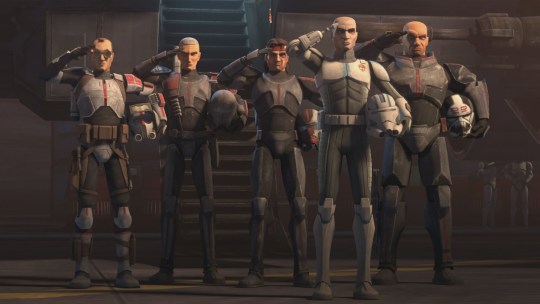
Surviving Order 66
Thanks to the Bad Batch, Rex returns to who he really is, while breaking free from his identity as “just a soldier of the Republic”. He regains his vitality and creativity. He continues to uphold his personal values like loyalty, brotherhood and justice. Since Rex has gone through the individuation journey, he is able to survive Order 66. When the inhibitor chip gets activated, Rex is able to resist its effect for a few seconds. He warns Ahsoka to stay back and tells her to "find him… Fives… find him!" Rex is able to briefly remember who he is before losing the fight to the inhibitor chip.
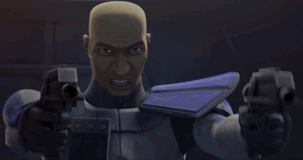
Ahsoka has gone through the same individuation journey as Rex. She starts off as a bright Padawan of Anakin Skywalker, but she eventually comes to realize that the Republic and the Jedi Council do not care about her. She then leaves the Jedi Order to follow her own path. Although she no longer identifies as a Jedi, she continues to uphold the values of a Jedi – an indication that she has returned to who she really is, while breaking free from her identity as a Jedi. Rex is probably confident that Ahsoka will find a way to help him, which explains why he tells her to “find Fives”.
With the help of the astromechs, Ahsoka is able to retrieve files regarding Fives, Tup, the inhibitor chip and Rex’s encrypted grievance report. This serves as a metaphor of Ahsoka seeking answers in the Underworld, which are brought into the light. Then, Ahsoka and the droids manage to knock Rex out. Ahsoka then brings Rex to the medical bay. The medical droid does a scan on Rex but it finds no anomaly. Ahsoka puts her hands on Rex's head and recites the Guardian's Mantra: "I am one with the Force and the Force is with me," with the unconscious Rex joining in. The Guardian’s Mantra evokes the Hestia archetype as the Self is what we experience inwardly when we feel a relationship to oneness that connects us to the essence of everything outside of us – where “connecting” and “detachment” are paradoxically the same. Basically, to be connected with the Force is to be connected with the Self. By connecting with Hestia, Ahsoka is able to detect the inhibitor chip inside Rex’s head. A surgery is performed to remove it, finally freeing Rex from its brainwashing effects. Since Rex and Ahsoka have gone through their individuation journeys, they are able to avoid the fates that befall on the Jedi and the clones – death and the loss of identity. They have indeed broken free from their designated roles, and they are free to live out their personal myths.
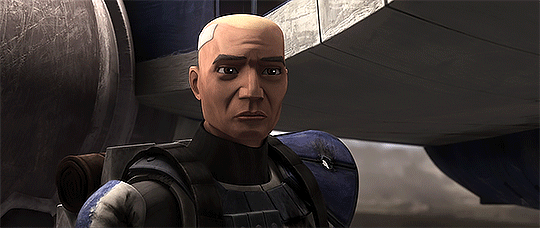
Conclusion
What seems to be a fun Clone wars arc turns out to be a story about the individuation journey, which is significant to our lives. The Bad Batch, which consists of Hunter, Tech, Wrecker and Crosshair, are born to be different. They never feel that they belong with the mainstream society, so they shape their own identities. They follow their heart, which is how they find harmony and bliss. They choose to live out their personal myths, and become guides to Rex during his lowest moment in life. Echo joining the Bad Batch adds a few more archetypes into the group, and connects them with the regular clone troopers. Later, Omega becomes part of the Bad Batch, and I imagine Omega being a therapist will teach you to be kind to yourself.
So, whenever you feel that your life has become dull and meaningless, or that you do not know where you are heading with your life, remember to have courage to take on the individuation journey. You are not alone on this journey, and I hope that one day, you will find wholeness, harmony and bliss – where you can be true to yourself.
#star wars#the bad batch#tbb#star wars the bad batch#sw the bad batch#sw tbb#the bad batch analysis#tbb analysis#archetypal psychology#archetypes#the bad batch meta#tbb meta#gods in everyman#goddesses in everywoman#star wars clone wars#star wars the clone wars#sw the clone wars#sw clone wars#the clone wars#clone wars#star wars tcw#sw tcw#captain rex#clone force 99#Youtube
28 notes
·
View notes
Text
The Bad Batch S3 Theory
—————
I rewatched the Bad Batch S3 tonight, and all I can say is that I have the feeling it can’t be finished yet. There are so many things we still don’t know, so many things to say and reveal. And only one episode left? I won’t be surprised (and I hope with all my heart) if after this last episode, we have another series coming, not with the Batch, but following clones, and maybe why not Omega? What’s scares me too is that if it is correct, there might be people who will die in this last episode, which would explain why this series with our Boys ends, and another one maybe set years later???
Ps: Rampart is a drama queen in the last episode and I am here for it

#tbb#the bad batch star wars#star wars the bad batch#the bad batch#the bad batch wrecker#the bad batch crosshair#the bad batch analysis#the bad batch tech#the bad batch fanfiction#the bad batch spoilers#the bad batch hunter#the bad batch echo#tbb x reader#tbb crosshair#tbb echo#tbb omega#tbb wrecker#tbb hunter#tbb tech#sw tbb#tbb spoilers#tbb season 3#tbb emerie#tbb theory#tbb thoughts#hunter bad batch#the bad batch x reader#bad batch
22 notes
·
View notes
Text
Not good. Not good at all. I feel like Rampart when Wrecker shoved him away. I fear it’s gonna get worse.
We’re roughly 76 hrs away from the final episode of The Bad Batch - how we doin?
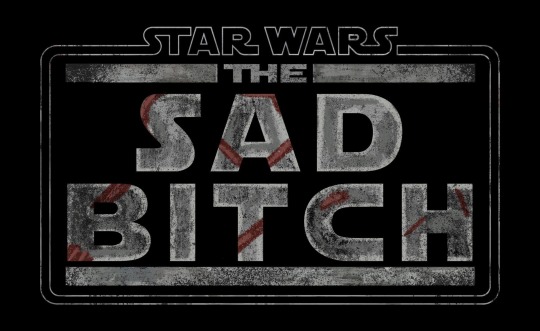
#star wars the bad batch#the bad batch wrecker#because i am not doing well#the bad batch crosshair#simply passing away when it airs#the bad batch analysis#the bad batch tech#the bad batch fanfiction#the bad batch x reader#the bad batch spoilers#the bad batch hunter#the bad batch echo#hunter bad batch#the bad batch#bad batch#tbb x reader#tbb echo#tbb omega#tbb crosshair#tbb wrecker#tbb hunter#tbb tech#sw tbb#tbb spoilers#tbb#tbb season 3#star wars tbb#the bad batch omega#omega x
474 notes
·
View notes
Text
About Crosshair's absence
I read someone claiming TBB writers made a bad job at showing the impact of Crosshair's absence in the squad despite the fact that he was supposedly a vital member of the team.(see post here !)
I desagree with that statement. See my ramble under the cut.
First, is Crosshair so vital for the team in a non-war situation?
He's a sniper-an exceptionally skilled one-so he was super valuable on the battle field to provide cover for his brothers. I mean if 3 (then 4 with Echo) guys barged into a battalion of droid without this kind of support, they'd probably last 10 minutes before being shot in the back.
So he was essential to the team for this kind of missions. I'm not saying that's all he can do, but this was clearly something he was the only one able to provide.
But is that skill so vital when you go on the type of missions Cid send our boys to? I don't think so. It'll help, sure, but they can manage without it.
So skill-wise, and in terms of completing the missions, Crosshair's absence is manageable for the squad, in my opinion. Which isn't to say some of their fuck-ups couldn't have been avoided if Crosshair was there...
Then there's the supposedly lack of depiction of mourning and this is where the neurodivergence headcanon kicks in.
Well first, we are talking about soldiers that have been trained their whole life to deal with death. They are trained to keep going whatever happens. They are trained to not allow their feelings to stop them from completing a mission.
Do they miss him? He'll yes! Do they show it? Nope. Is it healthy? Of course not, but do they even know how to deal with this?
I mean, in a way death would be easier to cope with. Their brother chose to go his separate way and TRIED TO KILL THEM.
Can you imagine the mixed feelings? They were taught to diffuse bombs, not that kind of stuff!
I think Wrecker is so confused about it his brain puts it all in a box to protect him. He misses his brother, he'll cry is out against Lula some nights, but he's not thinking about why Crosshair is acting like that or if he'll ever come back. His brain is like "we'll deal with that later". Later happens on Pabu. One day as he's helping a fisherman, Wrecker finds out the man lost his brother at sea. They spend hours talking about it, and it helps.
With Tech, I think it's always been out of sight out of mind. He can't help it, it's how his brain works. So most of the times, he doesn't realizes Crosshair isn't here. Until something random sparks a memory of his brother and it hits him hard. He'll stay up late, crippled with the sudden urge to talk to his brother but not being able to. He knows there's no reasoning with Cross, so he doesn't waste energy looking for a way to bring him back. All he can do is hope that his brother will change his mind and realizes he chose the wrong side. When it happens, when Tech receives that message sent from Tantiss, he doesn't hesitate one second. There's no hard feelings, no resentment. Time has come to bring Crosshair back and he'll do anything to do so. Any-fucking-thing! I think he knew all along the odds were against them. I think he knew for sure they were screwed when they encountered Saw Guerrera. (I'm gonna go cry a minute...)
Echo is maybe the one who's having the hardest time forgiving Crosshair. You don't turn against your brothers. It's his number one rule. Plus, he's got so many losses to cope with already, he can't add another one. It's easier for him to blame Cross for his bad decisions. It's a sort of denial, obviously. One of many reasons that pushes him away from the batch and back with Rex. Thanks to that, he encounters more clones who had their inhibitor chips activated and begins to understand that it really wasn't Cross' fault, at least not entirely. It doesn't take much convincing to get him on board to rescue Crosshair. He's not gonna leave a brother behind.
And lastly, Hunter... Hunter who's so angry and hurt and GUILTY that he pours his heart and soul into Omega. She becomes an hyperfixation. Because let's be honest, his decision to keep her with the squad was a little bit selfish. Of course she wanted to stay, but she's a kid who's offered adventure after spending her whole life in a lab! The sensible thing to do was to leave her with Tuc and Sue until the squad settled in a more adequate situation to raise a child. Keeping her with him and taking her to mission was Hunter's unconscious way to fill the void left by Crosshair. He wants her to take Cross' place so bad that he even forgets she's not here when he grounds her for that mission to retrieve a Separatist governor. He makes some bad decisions too because he can't think straight when she's involved. It takes Pabu and seeing her with Lyana for him to remember she really is just a kid and he's not giving her what she needs. Then the unthinkable happens. But that's for another post.
Aaaaand again this is way too fucking long. I'm sorry. Thank you if you read it this far. I'd live to hear your thoughts on this.
7 notes
·
View notes
Text
Crosshair's Innate Archetype (Part 2)
This is the sixth instalment of my Bad Batch analysis. This character analysis has two parts: innate archetypes and anima. I will be referring to “Gods in Everyman” by Jean Shinoda Bolen for this first part analysis. This innate archetype analysis is split into two parts.
Part 1 | Part 2

Apollo is the God of the Sun, and he is second only to Zeus as the most important Greek god. The Romans called him “Apollo” like the Greeks, or “Phoebus”, which means “bright, shining, pure”. He is also the god of the arts (especially of music, dance and poetry), prophecy and archery. He is the lawgiver and punisher of wrongs, the protector of herdsmen, and the patron of medicine, who can also bring plagues. He is often depicted with a bow and a lyre, and the laurel is his sacred plant. His two famous precepts, “Know thyself” and “Nothing in excess” are inscribed on his temple at Delphi. Although he is noted for clarity and form, he has a lesser-known darker aspect, with both light and dark reflected in his symbols. Apollo is known as the pure, holy and cleansing god, which are all associated with the sun, his most important symbol. Swans are Apollo’s sacred birds, but so do crows and ravens, which represent his dark side. Snakes and wolves are also associated with Apollo. As a punisher of wrongs, Apollo is known to be cruel and can act vindictively.
The Apollo archetype is the most common archetype found in real people and in fictional characters. The clones have a strong Apollo archetype due to their military training and genetic modifications that cause them to be more inclined in following orders. This archetype is further enhanced during Order 66 as the inhibitor chip causes the clones to carry out orders without question. Crosshair has an enhanced Apollo archetype due to his genetic modification that grants him enhanced eyesight.
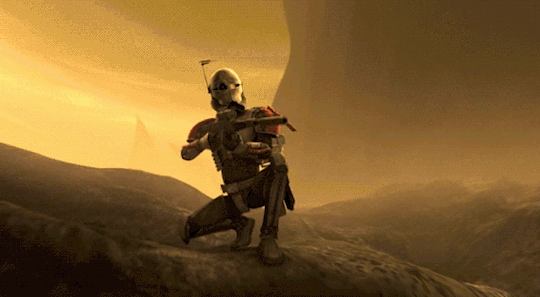
Apollo is an archer. His bow and arrow shafts are golden like the sun. It takes will, skill and practice to be an archer. An accomplished archer can aim for a distant target and be confident of hitting it, which comes naturally for people with strong Apollo archetype. People who identify as Apollo are logical and can easily relate to objective reality. They know what they want and have the will to accomplish their goal. They have a sense of future time, which enables them to plan ahead and set goals (like aiming at a target). Their targets are realistic, require effort to achieve it, and grant recognition. Crosshair is an accomplished sniper who is confident of hitting his targets from afar, even when the surroundings are a blur. In the Hyperspace Stories #10, Crosshair warns Wrecker that he can blast a flea off his back from 200 meters away in the pouring rain, and that he can do the same thing to Wrecker’s new toy. This indicates that Crosshair will do anything to accomplish his goals regardless of how difficult his goals are. Adding to his severe and unyielding personality, he has a very strong will to achieve his goals. Moreover, his goals are realistic for they are tangible and objective (for example, taking down a platoon of battle droids is a tangible goal). Like an archer, Crosshair has an excellent sense of future time, which enables him to plan out his trickshots perfectly as he knows where to place the reflecting mirrors and when to shoot to make those trickshots.

Apollo is the Greek god of prophecy, even though he himself does not prophesize. He gained this title by killing a great dragon or serpent named Python and taking over the oracle of Delphi as his temple, a site with a long history of prophetic divination. Through this myth, he was called Pythian Apollo and his priestess was Pythia. Apollo’s mediums were all women and their psychic divinations came from their communion with him. When people came to Apollo’s temple to consult with his oracle, the Pythia would enter a trance state and the priest would put questions to her and take down her words. The response would be turned over to another priest, who usually put it into the rhythm of poetry, though the meaning of the words was often obscure and ambiguous. Apollo as the god of prophecy fits his future-mindedness, like an archer who aims for a faraway target.

Crosshair has shown to exhibit some traits of Apollo as the god of prophecy, but it is usually limited to his ability to plan trickshots. He expertly places the reflecting mirrors on the surfaces as he has already predicted the movements of his targets. He also knows when to make the shot, which enables him to wipe out his targets with one precise shot. In “Return to Kamino”, Tech notices that Crosshair has placed the reflecting mirrors on the walls of the training ground. The placement of mirrors allows Crosshair to take down all four Imperial troopers in one shot, while leaving the Bad Batch unscathed. Crosshair only makes the trickshot when the Imperial troopers refuse to stand down. This indicates that he has foreseen that the Imperial troopers will disobey his order, and that he has planned their deaths. Moreover, the placement of mirrors also indicates that he has foreseen the positions of the Imperial troopers and the Bad Batch will take once they are in the training ground, and he ensures that his trickshot will take down all the Imperial troopers but not harm the Bad Batch.

@wwheeljack has shared this link that explains the observation training taken by military snipers. In this exercise, the snipers observe the various given objects for a short period of time. Then, they need to remember and describe what they have seen – they are not allowed to say the names of the objects. This exercise reminds me of how the oracle of Delphi is sought out by the Ancient Greeks, which evokes the Apollo archetype. It does feel that Crosshair’s enhanced eyesight and sniper training have enhanced his Apollo archetype.
As the goal-oriented archer and the god of the sun and prophecy, Apollo is the far-distant one. He can live in the future, always planning ahead. He can rise above the situation or “go skyward” to see everything objectively or to see his experiences as spiritual lessons. People who are like Apollo response to emotional pain by distancing themselves from these feelings and rise above their emotions through intellectual understanding, a mindful spiritual practice, or repeating their own principles to themselves. In the myths, Apollo had a connection to the mysterious realm of the Hyperboreans, and taking his chariot pulled by swans, he went there during the winter months. The realm of the Hyperboreans was the “northerly realm beyond the mountains”, and on a psychological level, this realm was depicted as a distant place of retreat, a starry world, another dimension, an Underworld or an enlightened world. Regardless of its depictions, the Hyperborean aspect of Apollo leads to feelings of isolation from others and the tendency to occasionally disappearing from this world into another.
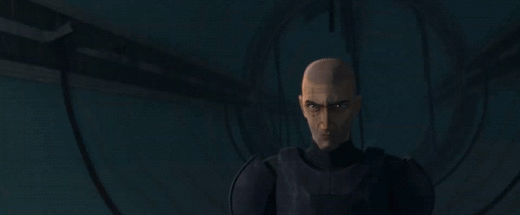
As the far-distant one, Crosshair has the tendency to see the bigger picture. Throughout season 1, Crosshair explains his reasonings why he joins the Empire willingly, and keeps accusing Hunter that he cannot see the bigger picture. Moreover, Crosshair prefers to stay above his emotions when chaos breaks out. For example, when the food fight breaks out between the Bad Batch and the regular clone troopers, Crosshair chooses to ignore the commotion and continue to eat until his meal gets ruined. Interestingly, his transfer to the snowy planet of Barton IV can be interpreted as his travels to the realm of the Hyperboreans, despite the realm is not necessarily located in the Arctic Region by the Ancient Greeks. Though, the need to keep his helmet on can be Crosshair’s Hyperborean aspect of Apollo.
As the god of the sun, nothing hides from Apollo, like light shines through the darkness to expose every hidden thing. The Apollo’s clear-sightedness enables a person to see through lies, ulterior motives and hidden information. In the myths, on the day Hermes was born, he proceeded to steal cows from his half-brother Apollo. He hid his tracks by tying branches to his feet, and he laid down a false trail by having the cows walk backwards. When Apollo discovered his cattle were stolen, he noticed tracks that seemed to lead in the opposite direction, and he was not fooled. When Apollo demanded Hermes to reveal where his stolen cows were hidden, Hermes lied and tried to pass himself off as an innocent infant, in which Apollo did not buy into any of his lies. Helios, the god who personifies the sun in Greek mythology and who shares the same title as God of the Sun with Apollo, also exhibits the same clear-sightedness. In the myths, Helios was the one who tells Demeter that her daughter Persephone had been abducted by Hades, and Zeus had permitted it to happen. Helios was also the one who told Hephaestus that his wife Aphrodite had been cheating on him with Ares.

We have seen how Crosshair can easily see through lies and anything hidden from plain sight. In “A Distant Echo”, Crosshair quickly figures out why Rex strongly believes that Echo is alive and is adamant of rescuing him because Rex feels guilty for leaving Echo for dead at the Citadel. His deductions are based on his observations of Rex’s body language and changes to his voice tone. In “On the Wings of Keeradaks”, Crosshair uses his helmet scanner to see through the walls, and reports that their enemies and many droids are approaching them. In “Aftermath”, Crosshair is not convinced that Hunter has stunned Caleb, which caused the Padawan to fall to his death in the waterfall. He even inspects the surroundings and the bottom of the waterfall using his helmet scanner to confirm his suspicions. Then, he points out that Hunter should look down not across when he sees someone falls, showing his understanding of body language and how observant he is. In “Reunion”, an Elite Squad Trooper reported that he cannot detect any life signs aboard the Jedi cruiser because the scanner is not working due to atmospheric interferences. However, Crosshair immediately knows that Tech has jammed their sensors and that Clone Force 99 is still onboard the ship. He also manages to predict that Tech has tapped into their comms to track down their movements. In “Return to Kamino”, Crosshair immediately catches on Wrecker’s lie that they did not bring Omega with them. We know that our pupils dilate when we lie, and I am sure that Crosshair can see that even when we wear sunglasses or helmets with dark visor. I am also sure that Crosshair would never be impressed by magic tricks since they involve misdirection, deception and illusions. He is so observant that he can easily debunk the magic tricks. If you are hiding something, both Hunter and Crosshair will catch on quickly but with different methods – Hunter can sense it while Crosshair can observe it.


Crosshair’s Apollo archetype balances out his Poseidon archetype. When Crosshair unleashes his emotions, they are depicted as storms. The sun only comes out when the storms subside, indicating that he has finally calmed down and he now can see the truth. This motif is shown twice, which are in “Kamino Lost” and “The Outpost”. In “Kamino Lost”, the raging storm on Kamino has subsided by the time the Bad Batch reaches the landing platform at daybreak. The sun comes out, which is a rare occurrence in Kamino. At this moment, Crosshair’s anger, disappointment and sadness towards his teammates have returned to stable conditions after all the explosive arguments they have. When Hunter offers him a chance to rejoin the team, Crosshair turns it down because he sees through Hunter’s intentions. Hunter wants Crosshair to give up his life as a soldier and his allegiance with the Empire, which makes his offer conditional. This contradicts Hunter’s unconditional love towards his teammates (including Crosshair), and if Crosshair chooses to rejoin the team, it will mean that he chooses to sacrifice his values and live in the lie that everyone is fine with him (which is clearly not true because Tech, Wrecker and Echo aim their blasters at Crosshair, thinking that he is going to shoot Hunter). Crosshair can see through this inconsistency and he refuses to return.

In “The Outpost”, Crosshair and the injured Mayday endure the freezing conditions as they return to the Imperial base. Once they arrive there, the snow has stopped falling and the winds have ceased. The sun is hanging above the base as Crosshair begs Lieutenant Nolan to send a medic to save Mayday’s life. Nolan refuses, claiming that it will be a waste of the Empire’s resources. As Mayday succumbs to his injuries, Crosshair finally sees the truth – the Empire never cares about the clones because they are expendable, including him. The sun shining above Crosshair symbolizes his light side as the Empire’s cruelty towards the clones has been exposed in broad daylight. The Ice Vulture circling above Crosshair represents his dark side as Crosshair makes the decision to kill Lieutenant Nolan. The mountains behind Crosshair are positioned to look like the wings of the Ice Vulture – as if Crosshair has become the Ice Vulture. I interpret the Ice Vulture as the equivalent of the raven, Apollo’s sacred bird that represents his dark side. In the Greek myth, the raven was once white, and Apollo assigned it to keep an eye on his mortal wife Coronis, who was pregnant with his child. The bird reported to the god that she was cheating on him. Apollo responded by turning the raven’s feathers from white to black, and he killed Coronis, which he later regretted it. However, he managed to save his unborn son from her body, and gave him to Chiron the centaur to raise. This son was Asclepius, who became the god of healing and medicine. Surprisingly, Apollo’s sacred birds – swans, crows and ravens – are known for their loyalty, and the same goes for vultures. These birds fit Crosshair well as loyalty is important to him.

Apollo is the favourite son of Zeus, and he is the second most important Greek god (the first being Zeus). From his birth, Apollo proclaims that his life mission is to carry out his father’s will. As the favourite son, Apollo people are likely to be basked in parental love, approval and praises, especially from traditional parents, as if there is a brightness cast about them. They are the success in the making, a positive reflection on their parents, and an achiever in a culture that values accomplishments. If they do not have a biological father, they will seek out the approval of other people who resemble Zeus. Crosshair has this archetypal affinity to excel and to please, and he constantly seeks out approval from Hunter, who has the Zeus archetype. This is hinted in “The Bad Batch” when Crosshair smirks as Hunter praises his sharpshooting skills. Crosshair also looks up to Commander Cody and Commander Mayday, who both have higher authority than him.

When Anakin (who has the higher authority as he is a Jedi General) leads the Bad Batch and Rex to rescue Echo, Crosshair is seen following and aiding him. In “A Distant Echo”, Anakin is seen checking out Crosshair’s rifle, and Crosshair is fine with it (possibly even feeling proud that he is being noticed by a Jedi General). When Anakin is snatched away by a keeradak, Crosshair shoots a grappling line towards the flying reptile so Hunter can use it to track down Anakin. When the Bad Batch and Rex find Anakin has been pinned down by the creature and is surrounded by the Poletecs, Hunter commands Wrecker and Crosshair to carry out Plan “Rockslide”. Wrecker proceeds to push a boulder down to distract the Poletecs while Crosshair shoots an electric dart at the leg of the keeradak, forcing it to release Anakin. When Anakin tells them to split up so they can find Echo easier, Crosshair follows Anakin and saves him from almost being cornered by battle droids. Crosshair is also seen fighting alongside Anakin and Echo in the episode “On the Wings of Keeradaks”. In “Unfinished Business”, although Crosshair tells the rest of the Bad Batch and Rex to go as he helps them to buy some time, they stay back to see him performing impressive trickshots. I am sure that by staying back to watch his performance boosts Crosshair’s ego because he loves showing off and all eyes are on him. Crosshair is probably more determined to impress Anakin when he is present to witness his impressive trickshot where he destroys a group of battle droids with only one shot. Some fans jokingly say that Crosshair is disappointed that he does not receive praises from Anakin after that trickshot, so he feels the need to bring down Wrecker by jumping in to say that “he won’t top him next time”.
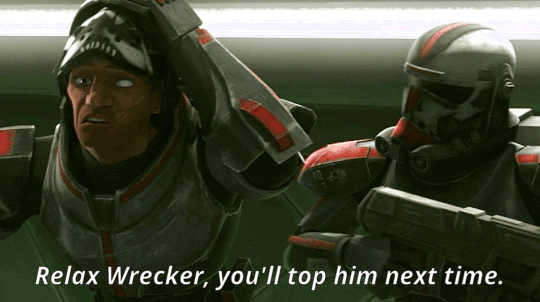
Apollo is the lawgiver as he provides cities their legal institutions and a structure for communities to work together and settle disputes. He also interprets law, and he supports order and moderation. He is uncomfortable with chaos, turbulence or passionate intensity. He intends to bring form and provide order through rules, laws, measure and time. As the upholders of law and order, Apollo people have a strong conviction that they know what is right and good for everyone. They may be idealists who envision a time when all people may live peacefully under the rule of law that will guarantee justice and fairness. All clones have the Apollo archetype as they follow orders without much questioning. Although the Bad Batch has a tendency to deviate from standard protocol, they still mostly follow orders. When Order 66 is issued, the inhibitor chips enhance the Apollo archetype to the point that the clones mercilessly execute their Jedi Generals that they have been working together for years.
Crosshair takes on the law-and-order aspect of Apollo strongly, even taking the saying “good soldiers follow orders” seriously. In “Aftermath”, Crosshair is somehow affected by the inhibitor chip, and tries to shoot Caleb Dume down despite Hunter keeps telling him to stand down. Crosshair later gets angry at Hunter for helping Caleb to escape and lying that the Padawan has been eliminated. To him, an order is an order, and Hunter should have completed the mission objective without considering the morality of the given order. When the Bad Batch refuses to execute Saw Gerrera and his people, Crosshair grumbles about the need to debate about morality, and states that they need to complete the mission. He believes that Saw Gerrera and his people are enemies of the Empire, and they should be eliminated. He even blames Hunter for making the team disobey orders, which causes them to be branded as traitors to the Empire.

With the effects of his inhibitor chip get amplified, Crosshair leaves the Bad Batch and joins the Empire. He carries out orders without hesitation. In “Replacements”, Crosshair orders his Elite Squad to execute the civilians associated with Saw Gerrera, and he even executes one of the members of his Elite Squad for refusing to obey his order. In “Devil’s Deal”, he follows Rampart’s order and shoots one of Senator Taa’s lekku, which allows Rampart to arrest General Cham Syndulla, his wife and other insurgents for the attempted assassination of the Senator. In “The Solitary Clone”, he carries out Governor Grotton’s order to execute Tawni Ames when Commander Cody fails to do so. In “Return to Kamino”, Crosshair reveals that he already has his inhibitor chip removed, and that he willingly pledges his loyalty to the Empire. This shocks the Bad Batch and Hunter refuses to believe it, but Crosshair says that this is who he is. It is not out of character for Crosshair to stay loyal with the Empire even without the effects of the inhibitor chip because of his strong Apollo archetype. He even chooses to return to the Empire despite he is left on the Kaminoan platform for 32 rotations because he is a soldier of the Empire. When Commander Cody talks about the rumour that more Clone Troopers have been questioning Order 66, which explains the increasing number of their desertion, Crosshair describes them as traitors like the Jedi.

Moreover, Crosshair is shown to have a strong conviction of what he thinks it is right and good for himself, the Bad Batch and Omega. In “Aftermath”, he strongly believes that the Bad Batch should have obeyed orders like good soldiers because he does not want the team to get into trouble with the higher-ups. In “Return to Kamino”, He believes that he and the rest of the Bad Batch are meant to be soldiers as this is their purpose. This is why he tells them to stop running and join the Empire because the Empire cannot protect the galaxy without strength, and he hopes to be a part of it. In addition, he tries to take Omega away from the Bad Batch and intends to send her on a shuttle offworld. He claims that this is for her own good and theirs as well. He tells Hunter that Omega is in constant danger from living among fugitives like the Bad Batch (which he has a valid point there), and that Hunter should let her go to protect her.
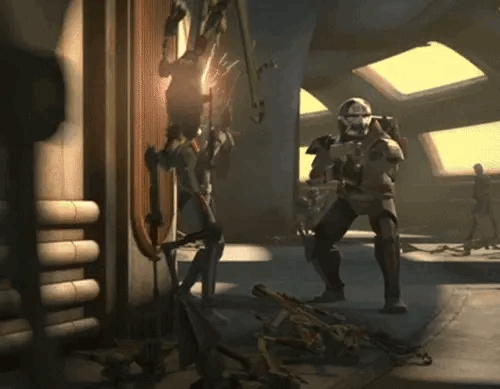


In Greek mythology, Apollo is known to have sibling rivalry and friendship with his younger half-brother Hermes, the Messenger God, and with his older twin sister, Artemis, Goddess of the Hunt and Moon. Competition emerged between Apollo and Hermes when Hermes stole Apollo’s cattle, and from whom Apollo received the lyre. Shortly after Artemis was born, she helped her mother Leto during her prolonged labour with Apollo. There was one myth where Apollo and Artemis were called upon by their mother Leto to avenge Niobe’s insult. In a myth about Artemis and Orion, Apollo was jealous of her love towards the hunter, so he created a challenge for Artemis, causing her to unknowingly kill Orion. As an archetype of the sibling and favoured older brother, Apollo people can easily become part of a team effort. They are also competitors, and they do it well thanks to their emotional distance. Though, they may not win the top position because they appear cautious and do not inspire others to see them as leaders. They also lack the drive to amass either power or money, the vision, decisiveness, or ruthlessness of a Zeus archetype. Crosshair has a brotherly relationship with members of Clone Force 99, and he works well with them. In the episodes “On the Wings of Keeradaks” and “Unfinished Business”, he and Wrecker have a sibling rivalry where they compete each other on who can take down the most droids. Though, Crosshair does not work well with regular clone troopers with the exceptions of Commander Cody, Commander Mayday and Captain Rex (at the later part of the Clone Wars arc).
Apollo values prudence, avoids physical danger, is emotionally distant, and prefers being an observer. This makes him a side-liner, not a hero. During the Trojan War, Poseidon challenged Apollo to a duel. Apollo turned it down and explained that he was not going to fight for insignificant, short-lived mortals. He still refused to be drawn into combat even when his sister Artemis called him a coward (and somehow Hera gave her a beating for that). Furthermore, Apollo was shown to actively dislike heroes. He refused the help from Heracles through the Pythian Oracle. He also opposed Achilles during the Trojan War. Achilles died when he was struck in the heel by an arrow, which was a vulnerable spot as that had not been bathed in the river Styx. In some versions, it was Apollo who killed Achilles, but in other versions, he was the one who guided Paris to take the shot. Apollo’s action is not a heroic act – he shoots an arrow from a distance instead of getting involved in direct combat.
Crosshair is shown to have traits of the non-hero. As stated in “Star Wars: The Clone Wars: Character Encyclopedia - Join the Battle!” book, Crosshair can be cynical and bitter about the war. He is not like Wrecker, who enjoys the thrill of being on the battlefield and engaging physical combat like a hero. He is a sniper who carefully takes down his targets from afar and without revealing his position. Although he carries out his duty as a soldier seriously, he does not like being in the battlefield. The book also states that Crosshair has little regard for regular clone troopers because he views them as expendables. This aligns with Crosshair telling Captain Rex that he would have left Echo for dead because he is “just another reg”.
Apollo is the archetype of the musician. The bow and the lyre are the two stringed instruments belonging to Apollo. He uses the bow to release arrows, while he plucks the lyre to bring forth music. As the most alert Greek god, he produces music that leads people to a clearly seen truth. Apollonian music expresses clarity and purity that bring harmony and lift spirits up. Moderation and beauty are the essence and the effect of his music, which helps to charm beasts and soothe the tormented mind. Aside from music, dance and poetry are also associated with Apollo. Apollonian art is associated with order, reason, harmony, clarity and structure, which is the opposite of Dionysian art (from Dionysus the god of wine and ecstasy), which is associated with chaos, ecstasy, turbulence, emotional conflicts and passion.
I have seen headcanons of Crosshair being a musical expert – he can sing well, he can write songs, and he can play musical instruments (like the piano and bass guitar). He is likely into classical music and ambient music. He also likes songs with poetic lyrics. There are also headcanons that Crosshair is into other music genres like rock, blues, alternative, rap, and heavy metal. I accept these headcanons because Apollonian and Dionysian are the opposites of the same coin. It will be in character for Crosshair to be drawn to chaos, irrationality, intense emotions and passion. In this YouTube video between 17:00 to 19:00, Dee Bradley Baker, who voices the Bad Batch, comes up with the idea of Crosshair singing “The Time Warp” from “The Rocky Horror Picture Show” (someone even made a short animatic about it in this link). The song talks about madness, chaos, sexual freedom, sensations, and being in the present, which are Dionysian values. Crosshair may be drawn to these opposite values. Aside from music, there are headcanons that Crosshair is a great dancer (mostly ballet), he writes poetry (perhaps to express his cynicism and bitterness towards the war), and he is into calligraphy, literature and aesthetic art, which align with Apollonian values.
People like Apollo tend to live in their heads, rather than in their bodies, emotions or imagination. Hence, Apollo men are not lovers. Their single-minded focus means that they are not easily distracted by attractive partners. Their relationships with women usually lack passion and emotional depth, which lead to both parties having a brother-sister relationship instead. With this arrangement, Apollo men tend to work best with Artemis and/or Athena women because these women are independent, competent and competitive, just like Apollo men. Though, Apollo men can be attracted to their opposites, which is shown in the myths where Apollo is in love with Sybil and Cassandra, who are psychic women – emotional, irrational, impractical and often unimpressed with him. Most Apollo men find these women fascinating, frustrating and unpredictable, and they may try to control them.
Although Apollo is handsome, virtuous and dependable, he is unsuccessful in love as he is rejected by Daphne, Cassandra, Sybil and Marpessa. Even his love for Hyacinth ends in tragedy when he accidentally kills Hyacinth in a discus-throwing contest. Jean Shinoda Bolen interpreted the women Apollo desires but gets rejected by them as the same women who also may reject Apollo men. These women reject Apollo because he lacks depth and intensity, emotional closeness and expressiveness, or sexual spontaneity. Some women reject an Apollo man because they sense that he is too attached to appearances.
Marpessa was loved by Apollo and a mortal man named Idas. Zeus allowed her to choose her lover between the two. Marpessa wisely chose Idas because she was aware that Apollo would desert her when she became old and grey. This myth can serve as a metaphor of choosing a “human” relationship that has the potential to grow and change over time, rather than a relationship with the unchanging Apollo.
When it comes to his relationships with Sybil and Cassandra, Apollo mistakenly assumes that love can be given in exchange for what he can provide. Apollo granted Sybil the gift of prophecy (which was how the famous Sybilline oracles came about) but she rejected him. Apollo taught Cassandra the art of prophecy on the condition that she became his lover, but she did not keep her word. Apollo got his revenge by cursing her that nobody would believe her. With the onset of the Trojan War, Cassandra continuously tried to warn everyone about the future calamities but she was shut away as a mad woman.
Although an Apollo man is cut away from his instinctual, sexual, and sensual thoughts, these thoughts may arise occasionally. His ability to focus on goals combining with his sexual desire may cause him to pursue the person he loves with great enthusiasm and passion. This is similar to the myth where Apollo was struck by an arrow shot by Eros (also known as Amor or Cupid), causing him to fall in love with Daphne and he actively pursued her. If the woman has not fallen in love with him, like Daphne in this myth, she is unlikely to relate to the intensity of his feelings due to the lack of intimacy and communication in the early stages of the relationship. She may feel like a pursued Daphne and may flee from him, as she feels more like an object he wants to possess than a woman being wooed. The myth of Apollo and Daphne ended with Daphne turning into a laurel tree to escape from the god overtaking her. Apollo still loved her, and the laurel became his sacred tree, with her leaves being made into wreaths that adorned his hair.
Even if an Apollo man manages to win a woman’s heart, she may become disappointed at him with his tendency to “go away” as a lover. She may even be unfaithful in his “absence” like the myth of Apollo and Coronis as stated earlier. If a woman desires substance rather than form, needs emotional depth rather than the security of an enduring relationship, or her nature is passionate, intense and in the moment (like Aphrodite the Goddess of Love and Beauty), she will be unhappy with her relationship with an Apollo man. This is because an Apollo man often does not see the importance of sexual attraction, physical affection and intimate verbal communication. When facing relationship difficulties, the Apollo man often withdraws as he does not see them as his problems. He can stay comfortably in a relationship or a marriage marked by emotional distance and lack of passion. His partner may feel lonely because of his lack of emotional and communication depth. She may become more like Apollo and start to cut herself off from her emotions, or she may become more irrational or hysterical in an unsuccessful attempt to get him to react emotionally.
Fortunately, Crosshair has the Poseidon archetype to balance out his Apollo archetype. This means that he is “handsome, virtuous and dependable” like Apollo, while also capable of depth and intensity, emotional closeness and expressiveness, intimacy, and sexual spontaneity like Poseidon. This archetype combination may make him an ideal partner, but with Poseidon’s relentless passion combining Apollo’s single-mindedness, he risks mirroring the myth of Apollo and Daphne if his desired partner does not reciprocate his feelings. Moreover, there is a tendency that he may occasionally sway too far into one archetype if he is unbalanced. This is because Apollo and Poseidon are the opposites – Apollo is associated with emotional distance, while Poseidon is associated with overwhelming emotions. If Crosshair chooses to distance himself emotionally, he may go too far to the point of inadvertently pushing people away and becoming lonely. However, if he chooses to give into his intense emotions, he may carry out his actions too far and inadvertently hurt other people, which can cause them to become terrified of him. Hence, it is important for Crosshair to find his centre or “Self” so he can take on the best aspects of both archetypes while reducing the risk of being “taken over” by either of them. This is possible if his “Self” is strong, which is associated with Hestia, the main archetype of Echo.
Since Apollo is “above it all” due to being the sun god, he is emotionally distant. This causes him to communicate about his emotions indirectly. When people seek his advice about something that he does not clearly understand, Apollo speaks through the Delphic Oracle, which contains ambiguous messages that require interpretation. People around an Apollo person often have to interpret the cryptic words that hint at their feelings. The Apollo person will withdraw further if they get the meaning wrong or if they try to draw them out. It is ironic that Apollo, the god of clarity who can make a person speak so precisely and clearly about an impersonal subject, is unable to make a person express themselves clearly. Furthermore, Apollo’s emotional distance also means the tendency to avoid emotional conflict, like the god refusing to respond to Poseidon’s challenge to fight during the Trojan War. He prefers to assess or judge the situation or the person from a distance. He is unwilling to “get close up” – be vulnerable and empathic – in order to truly know someone else.

It is clear that Crosshair struggles to express himself and his emotions through words – he prefers to express it through action. In “The Bad Batch”, Jesse gets angry at Crosshair because he interprets his words as insulting the regular clone troopers and disrespecting Captain Rex. In “A Distant Echo”, Rex interprets Crosshair’s words as he does not care about Echo, which causes him to angrily punch Crosshair. In these occasions, Hunter does not call out Crosshair or intervene when Rex punches Crosshair, possibly because he knows that Crosshair does not mean it. In “Aftermath”, Crosshair’s inhibitor chip is somehow activated, which causes him to become adamant about following orders. Crosshair does not understand what is wrong with himself, and his inability to properly communicate his issues with his teammates only worsens with the effects of the inhibitor chip. To make matters worse, Hunter, Tech, Wrecker and Echo do not understand what is wrong with Crosshair. They are confused of his behavioural change since they never have an issue with disobeying orders as they do it all the time. In addition, they are more focused on trying to escape the makeshift prison then dealing with Crosshair’s antics. Crosshair feels frustrated that they do not understand him and he withdraws from the team. He withdraws further when Omega tries to draw him out. In “Return to Kamino”, Crosshair offers the Bad Batch to join the Empire so they can have a purpose again. Hunter counters that Crosshair does not get who they are. Crosshair feels hurt that they do not understand his intentions and feelings towards them, and warns them not to make the same mistake twice and become his enemy. Hunter tells him that they never are enemies. Throughout “Kamino Lost”, Crosshair keeps on explaining why he chooses to join the Empire willingly, but the Bad Batch does not get him and they struggle to accept that he does this without the influence of the inhibitor chip. This causes Crosshair to withdraw himself further to the point of refusing to rejoin the Bad Batch.
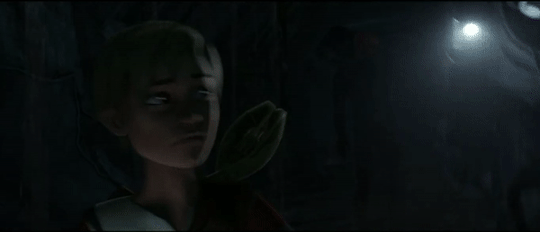
People who identify as Apollo are influenced by their innate characteristics, culture and family of origin. If their family discourages emotional expression and perception, as well as enforcing a culture that disapproves vulnerability, encourages competition, and rewards acquiring power, the Apollo person, especially if they are intelligent and good-looking, may become narcissistic. This negative aspect may be worsened if they have narcissistic parents. These parents are likely to make the Apollo child to become an extension of themselves. They feel better about themselves when their Apollo child “wins” and demand that their child reflects well on them. This child feels the need to win in order to retain the conditional love of their parents, which can lead to anxiety and they end up performing worse.
An Apollo person whose life is full of successes may become arrogant. Their sense of self may become inflated, as if they identify with the god or the archetype. They may forget that they are human, and may assume that they can take on much more that they are able. This can lead to disastrous results, just like what happens to Phaëthon, the son of Helios. In this myth, Phaëthon was told by his mother that he was the son of Helios, and the young man boosted about it. When he was not believed in, he set forth to find Helios to confirm the truth. Helios acknowledged his paternity, and to assure Phaëthon further, he promised to grant him any favour he wished. Phaëthon requested to drive the sun chariot across the sky for one day. At daybreak, Phaëthon put on his father’s sun crown and climbed into the chariot. The great horses of the sun felt his unfamiliar and inexperienced hand on the reins and left the usual path taken by the sun. Phaëthon lacked the strength or experience to check their flight, and the blazing heat of the sun scorched the earth. To save the earth from further damage, Zeus struck Phaëthon down with a lightning bolt. Helios, distraught over the loss of his son, allowed the earth to go without light for one whole day, before once more putting the sun chariot on its regular course. Jean Shinoda Bolen interprets Phaëthon’s assumption that he could drive Apollo’s chariot as “an ego trip” that hurts others and causes him to be struck down.
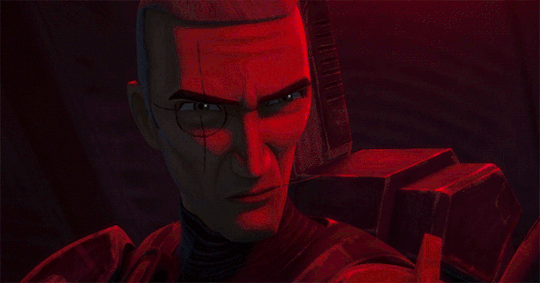
The Bad Batch consists of Hunter, Tech, Wrecker and Crosshair, who are all enhanced clones. Crosshair views himself and his squad as more superior than the regular clone troopers or ‘regs’. In “The Bad Batch”, Crosshair sneers at Jesse and tells him that they usually do not work with regs. In “A Distant Echo”, Crosshair says that he would have left Echo for dead too because he is “just a reg” (though his actions say otherwise). In “Return to Kamino”, Hunter realizes that Tipoca City is being decommissioned, which is not a good sign because he has been informed that the Empire is phasing out clones next. Crosshair is unconcerned of it because he thinks that his loyalty to the Empire, his exceptional sharpshooting skills and his superiority will mean that he gets to keep his position. Moreover, he tries to convince the Bad Batch to join the Empire as they are superior to the “regulars” and their strength can help the Empire to protect the galaxy. When the Bad Batch refuses his offer, he tells them that Kamino, the regular clones, and the Galactic Republic's time are over. He claims that the Empire will control the entire galaxy and he hopes to be a part of it. Crosshair’s assumption that he would be important to the Empire is his “ego trip” which hurts the Bad Batch, and it eventually causes him to be “struck down” when he realizes that he is disposable in the eyes of the Empire in spite of his skills, abilities and loyalty.
Apollo is known to be cruel and punitive, especially when he has been humiliated and dominated by someone else. He does not show mercy when he defeats a rival or when he enacts his revenge. In one myth, Marsyas the Satyr challenged Apollo to a musical contest, with the agreement that the victor could do whatever he liked to the loser. There were many variations of the contest, but the most notable one was that Apollo won the contest because he could play the lyre upside down, but Marsyas could not do it with his flute. As punishment for his hubris to challenge a deity, Apollo had Marsyas tied to a tree and stripped his skin off alive, which is inhumane and cruel. In another myth, after Cassandra did not keep her word, Apollo allowed her to keep the gift of prophecy, but he proclaimed that nobody would believe in her. This punishment is both creative and cruel as Cassandra suffers both for knowing the horrible future and living through it.

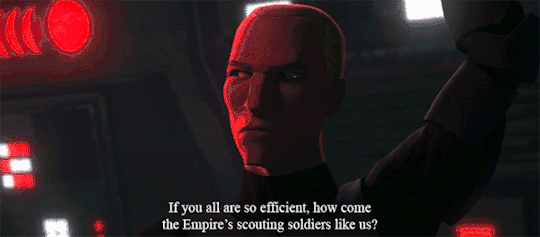
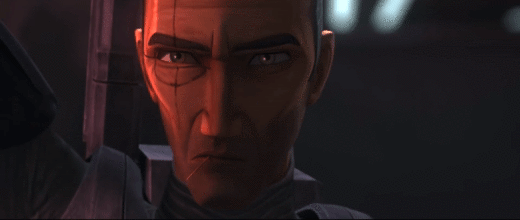
Crosshair has been shown to be capable of cruelty, especially towards those who disobeys his orders. In “Replacements”, ES-01 questions Crosshair’s leadership and the efficiency of the clones. He also tells Crosshair that the Empire is currently hiring human recruits, which means Crosshair may soon be replaced. This must have been humiliating to Crosshair, and with his emotional intensity, he is not going to let it slide so easily. When Crosshair decides to execute the civilians in compliance with the order to wipe out Saw Gerrera’s camp, ES-01 refuses to comply because he feels that the order is wrong. He takes over leadership as he tells the squad to ignore Crosshair and they should bring the civilians in for questioning. Crosshair coldly reminds ES-01 that the reason he is put in charge is because he is willing to do whatever it needs to be done. Crosshair then shoots ES-01 in the chest and in front of the squad as a punishment of his insubordination. Although not as cruel as Apollo flaying Marsyas alive, it is enough to cause the rest of the squad to obey his command and execute the civilians.
In “Reunion”, Crosshair hunts down the Bad Batch for being traitors to the Empire. He and his troops surround them at the end of the ion engine chamber, and he orders one of his troops to activate the engine. His plan is to trap the Bad Batch within the ion engine and force them to surrender as to avoid being burned by the engine flare. However, the Bad Batch manages to outsmart Crosshair and escape from being incinerated, while Crosshair gets burned by the ion engine. In “Return to Kamino”, when the Elite Squad Troopers reject Crosshair’s order to stand down, he makes a creative trickshot to execute all four of them at once.
Although Apollo is known for his clarity, moderation and healing abilities, the Ancient Greeks also believed that his poisoned arrows brought pestilence and sudden deaths to mortals. Jean Shinoda Bolen interpreted these poisoned arrows as “venomous words” uttered by an Apollo person. When a moderate, rational Apollo person unleashes his fury, he unleashes his repressed emotions that are primitive, undeveloped and irrational. The Apollo person becomes a venomous snake that harms others with words. His hostile words are often directed towards his loved or respected ones who have hurt him, humiliated him, or did not live up to his expectations. Though, his own positive self is the major casualty. Dee Bradley Baker describes Crosshair’s voice as “a coiled snake”, and his words are “deliberate and ready to strike” – resembling the dark aspects of Apollo. We have seen how his venomous words have wounded many people around him. In “The Bad Batch”, Crosshair’s words have incited Jesse’s anger, which causes a conflict between the regular clone troopers and the Bad Batch to break out. In “A Distant Echo”, Rex is wounded by Crosshair’s words and he punches the sniper in a fit of rage.
Throughout Season 1, Crosshair accuses Hunter’s failed leadership as the reason the squad is in trouble, which causes Hunter to start questioning his leadership skills, and he blames himself for leaving Crosshair behind. In “Kamino Lost”, Wrecker is hurt by Crosshair’s mocking his intelligence, and he points out that Crosshair never once tried to reunite with his teammates by his own volition, and that they would have accepted him back. In the same episode, Omega tells Crosshair that she wants to believe that the inhibitor chip has made him like this but she is wrong, indicating that she is hurt by his claim that he already has the chip removed and he willingly joins the Empire.
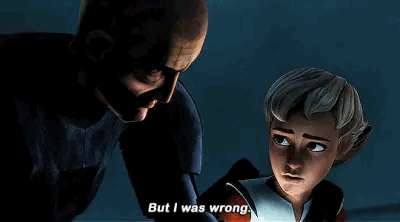
Since an Apollo person tends to live in their heads and uphold their values, they are often ruled by an idea of what it should be. They care greatly about their appearances, and they want order to their own worlds. They are unlikely to make choices based on their heart, emotions and instincts because these are devalued within them. As a result, an Apollo person can remain in a boring and meaningless job, an empty marriage, or a study course they are not interested in, despite knowing that something better exists out there. With their tendency to emotionally distance themselves, they are able to appear unaffected by the loss.
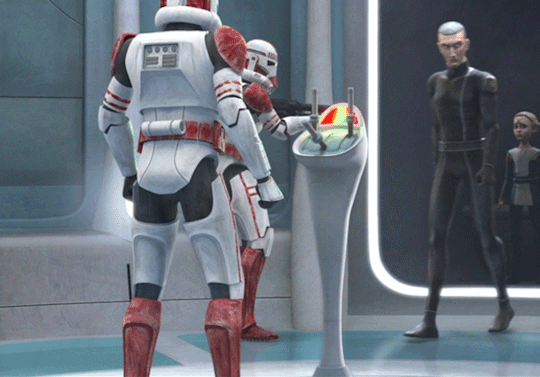
Crosshair is a sniper, which means he only takes the shot when he is absolutely certain that he can hit his target. Any slight miscalculation will give away his position and possibly compromise the mission. With that, I can see that Crosshair is a risk-averse person. This is evident when Omega suddenly shoots the rifle out of Crosshair’s hand, taking him by surprise. When she starts spraying several blaster bolts in his direction, Crosshair chooses to retreat as he cannot predict her movements, let alone predicting that she can use a blaster well.
We know that Crosshair is proud of being part of Clone Force 99 for they are known for their 100 percent success rate. This makes Crosshair believe that they deserve challenging missions as seen in the Hyperspace Stories #10 when he initially complains that the mission to investigate battle droids can be done by regular clone troopers. Being part of Clone Force 99 also means that Crosshair sees himself and his teammates as the more superior one. In “The Bad Batch”, when Rex takes charge of the mission to the Cyber Center, Crosshair challenges his authority because Clone Force 99 has been called in to help Rex, which means they (or more specifically, Hunter) should be in charge, not Rex.
With the rise of the Empire, the Bad Batch decides to defect because they do not agree with the Empire’s orders. They become mercenaries while also taking care of Omega. On the other hand, Crosshair doubles down on what he is made for and what he is always good at – as a soldier. He believes that the Bad Batch is made to be superior soldiers, and that the Empire will benefit from their skills and abilities. In “Return to Kamino”, Crosshair offers the Bad Batch to stop running and join the Empire to have a purpose again. To him, being a soldier is all that matters, and it does not matter that his allegiance is to the Republic or to the Empire. He is angry that Hunter chooses to throw away the squad’s legacy and defect. He feels that Hunter has brought chaos to his ideal world and has tarnished the squad’s reputation. He even tells Hunter to let Omega go and stop pretending to be something that he is not – a father figure to Omega. He also looks down at Omega because she is a child, despite that she has proven many times that she is a helpful ally, and she even saves him from drowning.

Even if Crosshair knows that the Empire is bad news, he is unwilling to break away from his values and his ideal world. He tries to justify the Empire’s action of destroying Tipoca City, saying that the Clone Wars is over and now the Empire will expand their control across the galaxy. Although he is left stranded on Kamino for 32 rotations, he still chooses to return because he is a soldier of the Empire. Since Crosshair cannot see what lies ahead if he chooses to give up being a soldier, he is unwilling to take the risk and run away. He stays with the Empire because they can bring structure and stability to his life, like providing him food, weapons, clothing, shelter and payment. He even scoffs at the thought of being more than a soldier as he sneers at the Bad Batch for scavenging like rats in “Reunion”. He also calls the clones that are questioning the Empire’s orders as traitors like the Jedi in “The Solitary Clone”. His tendency to live in his head and his decision to choose order above all else have made him physically and emotionally distant from everyone. The more detached he becomes, the lonelier he gets, which is shown throughout Season 2.
It is necessary for an Apollo person to grow beyond their rational and logical mind, and be in touch with their heart and body. Jean Shinoda Bolen has proposed four methods to grow beyond the Apollo archetype. The first method is to make room for Dionysus in the psyche. Apollo shared his temple at Delphi with Dionysus. Inside the temple, there was a grave of Dionysus, and the cult of Dionysus celebrated his death as an adult god and his reincarnation as a new-born infant. During the three winter months, Dionysus was worshipped and celebrated there, while Apollo went away to the realm of the Hyperboreans. Jean Shinoda Bolen interprets it as the Apollo person must realize the need to live in the moment, and to be absorbed in sensation, feeling, inner imagery, or outer experience, which will allow Dionysus to be present.
Many Apollo people can gain access to the Dionysus archetype through Dionysian music and dance. Dionysian music and dance are perceived as a bodily experience that invites people to dance spontaneously and without self-consciousness. They respond to the music instinctively, letting their bodies move with the flow of the music. In romance, Apollo people are goal-oriented and technique minded. They tend to stay aware of the clock and they may be self-conscious in how they express their love. By allowing Dionysus to take over the romantic aspects, the person becomes more focused in the present and becomes less conscious of their sensuality and methods of expressing love. The relationship will feel like a soulful communion or an emotional merger. I have seen fans describing Crosshair being critical of his appearance and becoming anxious in pleasuring his partner, and I think these are true to his Apollo character. With that, he must learn to let Dionysus in his romantic life, and this can be done with encouragements from his partner.

Hunter is innately Dionysus while Crosshair is more like Apollo. They are the opposites and they balance each other out. When Hunter focuses too much on his body or other people, Crosshair likely helps to shift his focus. For example, in “Aftermath”, Crosshair wants Hunter to focus on the mission and stop being bothered by Omega. It is possible when Crosshair stays in his head for too long, Hunter encourages him to let go and live in the moment. I have mentioned that Dee Bradley Baker once proposed the idea of Crosshair singing “The Time Warp”, which evokes the Dionysus archetype. Dee Bradley Baker once joked that Crosshair would be the one that sits in the back of the classroom eating a bottle of glue (link here), which also evokes the Dionysus archetype. This means that it is possible for Crosshair to move his Apollo archetype aside for the Dionysus archetype.
One of Apollo’s principles is “Keep the woman under rule”, and Jean Shinoda Bolen interprets as an Apollo man’s tendency to suppress his anima, the unconscious feminine of a man. Carl Jung views the anima or inner woman as the realm of emotions and relatedness, which is linked to the man’s emotionality and capacity for closeness and receptivity, which is usually undeveloped. With that, the second method to grow beyond the Apollo archetype will require one to liberate the anima or inner woman. This liberation means to have a positive regard for “feminine” values, which allows one to honour their own feelings and the feelings of others. This method helps an Apollo person to get out of their head and into their heart or body, which enables them to feel connected to nature and all living beings. According to Jean Shinoda Bolen, most Apollo men gradually develop their anima through loving women who do not live in their heads and who can speak for their feelings. An Apollo person often hurts other people’s feelings unconsciously or due to their self-centered attitude. The Apollo person must be willing to listen and learn about feelings so they can be more caring towards others and not wanting to offend others.
Although Crosshair is surrounded by his brothers, he is free to liberate his anima (which is discussed in this link) under the encouragement of his brothers. Hunter has a strong Demeter anima, which is the mother archetype. Wrecker has a strong Aphrodite anima, which is the lover and creative woman archetype. Echo has a strong Persephone anima, or more specifically Persephone Queen of the Underworld. Demeter, Aphrodite and Persephone are associated with emotions, instincts and connectedness with others, which can help Crosshair to develop some positive regards for these values. Echo also has a strong Hestia anima, which is the wise maiden aunt archetype. This wise maiden aunt archetype can encourage Crosshair to follow his heart. Like Echo, Omega has a strong Persephone archetype, but it is more towards Persephone the Kore, which is the maiden archetype. This maiden archetype can encourage Crosshair to have a hopeful outlook in life, to be willing to trust others, and to be kind and compassionate. Even though Tech has a strong Athena anima, which is a feminine archetype that leans more towards living in one’s head and becoming detached from the heart and body, he has the Hermes archetype to counter it. Since Hermes is known to be an alchemist, a guide of souls and the rescuer of the child, he has the ability to unite masculinity and femininity, which is extremely helpful for Crosshair. By surrounding with people who view emotions, instincts, sensuality, and connectedness with others as positive values, Crosshair can learn to listen and be more considerate of other people’s feelings.
When a person is a sun-blessed Apollo, they begin life with a favoured status and with some advantages that help them to succeed in this world. The successful Apollo person usually takes credit for their accomplishments and assumes that their success is well deserved, leading them to become prideful. They may also blame others for not succeeding, without considering other factors such as circumstances, status quo, personality or intelligence. Hence, the third method to grow beyond the Apollo archetype will require one to learn humility. An Apollo person may need to actually be in someone’s shoes, or to suffer loss and feel grief, before they realize how arrogant they were and how much they did not know or appreciate. They may need to make a terrible mistake and be forgiven to experience humility. They may need to grow older and go through humbling experiences to become wiser.

The events of “The Outpost” finally gives Crosshair the hard lesson of humility. By working alongside Commander Mayday, Crosshair is able to actually feel the fit of a different pair of shoes. Although Mayday is a regular clone trooper, he is highly experienced, confident without a hint of hubris, and caring towards others. Yet, Lieutenant Nolan looks down at him for being a clone. After Crosshair and Mayday realize that the stolen cargo that they are sent to retrieved contain Stormtrooper gear, Mayday gets upset that they and their fellow brothers are thrown aside despite their combat service, sacrifice and loyalty. From here, Crosshair finally sees and feels himself in the same position as Mayday – the Empire still chooses to cast him aside despite his loyalty, exceptional skills and his supposed superiority as an enhanced clone. Later, Crosshair loses Mayday and he feels immense grief over his death. He is furious at Lieutenant Nolan for refusing to provide medical attention to Mayday. Lieutenant Nolan represents the worst aspects of an Apollo person – arrogant, cruel, thinking he is above everyone else despite lacking of command experience, and disregarding others who are below him. Upon witnessing and experiencing Nolan’s cruelty and hubris, Crosshair finally realizes how arrogant he was in the past. He also finally realizes that he did not appreciate the Republic, the Jedi, the Bad Batch, regular clones like Rex and Cody, and Omega, who are all better than how the Empire treats him and other clones. Crosshair’s decision to kill Lieutenant Nolan represents his decision to kill off his arrogant self and choose to become humble.
An Apollo person has a tendency to always do what is expected of them, without questioning whether they really want to do it. Since young, they gain love and approval for conforming to the rules, which is not difficult for them based on their archetypal nature. It often takes around the time when a mid-life crisis hits to make them start questioning their life. The fourth method to grow beyond the Apollo archetype requires one to make decisions based on love instead of logic. Once an Apollo person starts following their heart, they step out of the boundaries of their “known” rational world. They become human: they know that they are now vulnerable and they may make mistakes, but they are willing to take risks. They also give up the emotional distance that both protect them and keep them isolated.

Crosshair has a natural tendency to do what is expected of him, and he does it without questioning. He gains love and approval for being a good soldier that follows orders. His self-worth is based on what he is good at – as a soldier and as a sharpshooter. As a result, he does not see himself being more than a soldier and a sharpshooter. However, throughout the series, we are seeing Crosshair starts to follow his heart. In “Reunion”, Admiral Rampart orders Crosshair to execute Clone Force 99 for their desertion have made them traitors to the Empire. However, Crosshair reveals that he never intended to kill them in “Return to Kamino”, which means he is going against the Empire’s orders. Moreover, in “Rescue on Ryloth”, when Howzer chooses to stand up to the Empire and helps the rebels to escape, Crosshair does not choose to execute him for treason or for going against orders, which he has done previously to ES-01 in “Replacements”. Furthermore, in “Kamino Lost”, Crosshair chooses to save Omega from drowning even though his action does not fully regain his brothers’ trust. Although Crosshair is disappointed that the Bad Batch refuses his offer to join the Empire, he still chooses to protect them, lying in his report that they have perished in the bombardment of Tipoca City. In “The Outpost”, Crosshair gives up the mission to retrieve the stolen cargo, and chooses to bring Mayday back to the Imperial base in hopes that he will get medical treatment. In “Tipping Point”, Crosshair shoots the Stormtroopers but he chooses to stun Emerie Karr instead. He does this because Emerie has been at least kind to him, and it is possible that he knows that she is a female clone like Omega. When he attempts to escape, he sends Plan 88 to the Bad Batch, warning them to hide as the Empire is after Omega. He puts his brothers and sister above his need to be rescued. Of course, this journey won’t be easy for Crosshair, but as long as he continues to put an effort to let love be his motivator, he would gradually see himself as more than a soldier and a sharpshooter, and realize that his self-worth is not determined by people with authority. He would also learn to be vulnerable and be willing to take a leap of faith into the unknown.
I have the Apollo archetype as my animus. I was born into a well-off family that prioritizes education. I was able to earn very good grades and show off my various talents. With that, I was treated as “the golden child” in the family, receiving many praises from my family, relatives, teachers and even strangers. Many of my uncles and aunts would compare me with my cousins, saying how I was better than them in every way. I have to admit that all the love and approval had made me arrogant and judgmental. During my college and university years, I went to study law under my family’s suggestion. The reason was that I could work in the legal firms owned by my uncle and aunt. Besides, being a lawyer meant that I could gain a higher status in society and I could protect myself from people who wanted to take advantage of me.
I thought I have a clear future path ahead of me. However, the day after I took my first examination to become a lawyer, I had a terrible realization: my father would have never recognized me as his daughter if I wasn’t smart or talented. My parents separated since I was three, and my father had pretended that I never existed in his life. That all changed when I started to perform well in school, and he started introducing me to his business partners and workers. He was proud of my achievements and boosted about how he was a great father to me, when in reality, he was rarely there for me emotionally throughout my childhood. This realization devastated me. I almost lost sense of my identity. I did not know myself beyond my intelligence, skills and talents. I found myself only being held in high esteem based on what I could give to my family – excellent grades, high status, the perfect image of a family that raises a child to be a successful woman, etc. I was lost, not knowing where to go – this was not the life I wanted.
Then, I was denied by my uncle and aunt to work in their legal firms. I also failed my examination, which shocked my family because I always passed my examinations in my first attempt. They pressured me to retake the exams in hopes that I could pass and become a lawyer. They wanted me to earn the high status and get a stable job. Though, I had lost the motivation to become a lawyer, and I failed my retake. Since then, I became “the black sheep” in the family, and now my family threw various words to berate me. I also failed in my first relationship, which hurt me immensely. I wandered around aimlessly, unable to find a job because I could not find one that piqued my interest. I slipped into depression once more as my future became bleak and uncertain.
When I watched “The Outpost” and saw what Crosshair was going through, I saw myself in him. I saw a proud child, doing everything in their power to please those with authority, only to find that their efforts mean nothing to them, and they get casted aside instead. I was touched by the episode, and I had compassion towards Crosshair. As I saw him starting to move beyond his Apollo archetype, I found myself doing the same. Currently, I am studying a Master’s Degree in the field of education, which I have found a passion for it. My father has apologized for causing so much childhood trauma on me and he is willing to make amends, which strengthens our father-daughter bond. He now tells me that I can be whoever I want to be, and that I am more than my intelligence, skills and talents. I start to become more in touch with my instincts and emotions. I learn to be humble and less judgmental. I learn to embrace the positive and negative traits of Apollo, while choosing to move beyond this archetype. I hope to see Crosshair continuing this journey, just as I am doing now.
#star wars#star wars the bad batch#the bad batch#tbb#sw the bad batch#sw tbb#the bad batch analysis#tbb analysis#the bad batch meta#tbb meta#star wars clone wars#star wars the clone wars#sw the clone wars#sw clone wars#the clone wars#clone wars#star wars tcw#sw tcw#the bad batch crosshair#tbb crosshair#crosshair bad batch#crosshair tbb#crosshair the bad batch#bad batch crosshair#clone force 99#archetypal psychology#archetypes#gods in everyman
37 notes
·
View notes
Text
I really appreciate the nuance and depth that you are exploring this debate with. This might be the most comprehensive post on the "Hunter vs. Crosshair's views of their actions in season 1" that I've ever seen.
I resonate with both of them as characters and while I would probably be considered on Hunter's "side" more than not in this, I also very much agree with everything you are positing about Crosshair's perspective as well, going all the way back to his underlying feelings of worth and position in the squad up through the influence of the chip and then the reactions of his brothers to what he thinks are reasonable goals and ideals through the season 1 finale.
I also agree that there's a bit of both the characters' choices themselves and also the writing choices the team made that play a part in this dynamic. I do wish we had a more direct delineation of how the team was feeling about Crosshair past episode 3, and that we had a scene of them at least discussing what could be done about Crosshair's chip--maybe tied in with the Bracca episode, like "oh so this is what was happening to Crosshair before he turned on us--is there anything we can do to help?"
I think storyline wise it's impossible for them to do anything before Bracca, and I think that the conversations they have in episode 3 are very key to understanding their underlying feelings, Hunter especially. You've brought up all of the dialogue that takes place.
"It seems Hunter and the others took a very passive approach. They told Crosshair about the chip when they had the chance, hoped he would "wake up" on his own, and would've accepted him back if he had. But, Crosshair feels they should've taken a more active approach. He's hurt that they never came back for him, whether to save him or to join him."
Something that I think people often miss with Hunter is just how subtle his emotions and perspectives are handled by the writers (sometimes too subtly, because the audience seems to miss it quite often):
When Omega asks about learning to track like Hunter can in episode 3, he brings up Wrecker and Tech's specialties as well, but not Crosshair's. Omega has to bring Crosshair up and then Hunter sighs and tells her that he doesn't blame Crosshair, he blames himself. That they don't leave their own behind. I want to tie this in to season 3 episode 2, when Deke is leading Hunter and Wrecker through the jungle. He mentions "at least you're loyal" in talking about the differences between the Batch and the rest of the clones. Hunter visibly stiffens, glances back, and then continues silently onward, but he has obviously been bothered by Deke's choice of wording, and I think it's the bookend to those initial (lack of) conversations about Crosshair in season 1.
In both instances, Hunter is unwilling to say Crosshair's name or discuss him. It takes other characters to do so. But that isn't for lack of caring. Hunter is carrying the weight of EVERYTHING that the Batch goes through--including his own guilt. To me, an aspect of his character that gets overlooked is just how paralyzed this can make him, especially for most of season 1 and 2. He cares deeply about Crosshair--I think that headcanons that they were closest before their split are true based on both Hunter's extreme reaction during their time apart, and how close they become again after Crosshair's return. Regardless of the source behind Crosshair's shift in personality and allegiance, his actions are extremely hurtful, and he's not the only person Hunter has to look out for. Between Aftermath and Bracca, there is no time or extra bandwidth for the Batch to even consider retrieving him, and they don't know how the chips work or to what extent they are influencing the rest of the clones. And Hunter is already so deeply hurt that he is reacting by shoving even Crosshair's name to the side as often as possible because he doesn't have the mental strength to try and figure it out yet.
After Bracca, well, chip or not, Crosshair genuinely tried to destroy them in that moment. No matter how much rational thought they could throw at that situation thinking it was all the chip, I think it would have taken a lot for Hunter to consider a rescue plan for Crosshair at that point. Someone that you once considered family going all out to hurt you, even if you know it's not truly their fault, isn't easy to get over. Again, the writers chose to make the storyline chaotic enough that it wasn't very feasible, and Hunter's continued avoidance is driving the dynamic as well. And of course the nail in the coffin for him is then Crosshair's revelation about his chip being out and his doubling down on staying with the Empire. Both brothers feel like their bond is being placed second to an ideal--and both of them lose in the process.
Hunter's leadership usually manifests as overprotectiveness more often than not. He doesn't want to rescue Gregor, Echo is the one who pushes for that. He doesn't want to go to Coruscant to investigate Rampart's schemes in season 2. He wants to settle down somewhere safe and hide out. He doesn't really want to be working for Cid but basically gets bullied into it by her, and is driven by the fact that they have no other good options for awhile. I'm not defending this passive aspect of his character. It can just as easily be used for the "but he should have done more" argument in the equation. But I think it's precisely why he not only doesn't but CAN'T do more than he already does. He's juggling the entire upending of their world as they know it, he loses his home, his job, his closest team member, and his initial purpose, all in one fell swoop--and it breaks him a bit. The effects of this get even worse in season 2, and even I was frustrated at him by his unwillingness to go after Crosshair even after they had confirmed that Crosshair had landed in an Imperial prison.
But it's a core, key part of his temperament--that his attempts to balance and protect his team and shoulder the burdens of their fate end up overwhelming him to the point that he compartmentalizes, can't handle everything at one time, and goes into kind of an exhausted, depressed, tunnel vision funk that starts drawing lines between what is and isn't his priority anymore. From his perspective, by the end of season 1 Crosshair had firmly placed himself outside of that priority (and of course from Crosshair's perspective he was shoved there). And he has to carry on with what energy he has left. It's extremely realistic and relatable from my perspective, and I do really appreciate that the writers gave us such nuanced characters that we can have these debates and both Crosshair and Hunter as characters and our interpretations of them all end up having merit because, honestly, that is very true to real life. Should they have been more blatant about everyone's stances and reasons before the finales of each season? Yeah, they should have. But I think what they did give us is very insightful for each character both in content and delivery.
Again, thank you for taking the time to detail all of this out and approach it from such a nuanced perspective!
"You Weren't Loyal To Me": How Crosshair's Brothers Absolutely Failed Him in "The Bad Batch" Season 1
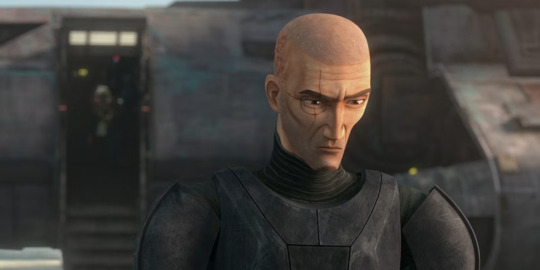
I know I'm not the first person to make these arguments, but after recently rewatching "The Bad Batch" Season 1, I feel compelled to play Devil's Advocate and assert that Crosshair's brothers absolutely failed him in Season 1.
Now, don't mistake me. I don't believe Crosshair was 100% in the right. Once he regained his free will -- whether he actually removed his inhibitor chip, or whether his injury on Bracca deactivated it or lessened its impacts -- he definitely should've left the Empire the first chance he had.
I imagine he was trying to make the best of a bad situation, but I don't see why he would stay with an organization hijacked his mind and ordered him to kill his family, civilians and other people who were trying to do the right thing.
But, I don't think his brothers -- I'm excluding Omega because she's a child and was following everyone else's lead -- are 100% in the right either.
I believe Crosshair's brothers basically abandoned him.
CROSSHAIR'S GREAT INSECURITY?
Now, I understand that they didn't initially plan to abandon Crosshair. But, once they knew he was being mind-controlled and especially once they knew how to undo its effects, they never even considered going back for him.
We never see them debate trying to save Crosshair. They don't discuss whether it's feasible, whether it's worth the risk, how they would even attempt it, etc.
I think this was a much-needed moment that we never get to see. In fact, as others have pointed out, we don't really get much discussion about Crosshair at all.
He's their brother. He's been by their side from infancy through their time as cadets through dozens of missions. Why aren't they more upset about him turning against them? Or being mind-controlled by the Empire?
They seem so blasé about it. Like it's more of an inconvenience than a tragedy, especially by 1.12 "Rescue on Ryloth." Like "Ope, Crosshair's here. I bet he's gonna try to kill us again."
As I'll discuss more later, Hunter gets captured on Daro, and Omega loses her frickin' mind. Even Echo, Wrecker and Tech seemed distressed too, even if the show didn't focus on their reactions as much.
But, Crosshair's mind and body get hijacked by the Empire, and nobody seems to give a shit.
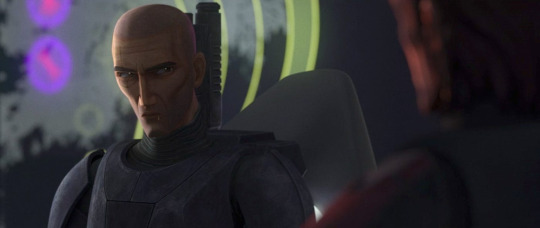
No wonder why Crosshair felt so betrayed and said everything he does in 1.15 and 1.16. It probably confirmed something he always felt, or always feared:
That he was the odd man out in his squad -- the last to be included and the first to be excluded.
That they never cared about him as much as he cared about them.
Based on experiences in my own life, with friends and coworkers, I do wonder if Crosshair was always insecure about his standing within the group. This makes sense given that he's likely the youngest of the four original brothers, and that as a sniper, he isn't always in the middle of the action like they are. His personality doesn't really help either, but his brothers seem to be able to navigate it just fine in their "The Clone Wars" Season 7 arc.
Maybe this is partly why he seemed OK with Echo joining the squad at the end of TCW arc: because he felt like Echo would become the new 'odd man' considering that he didn't grow up with the Bad Batch and wouldn't know Crosshair's brothers like he does.
It's been a while since I watched TCW Season 7, so maybe I'm wrong.
But, I definitely think this is partly why he resents Omega so much in Season 1:
The Bad Batch -- mainly Hunter -- decided to risk their lives and their freedom to go back to Kamino for Omega. She might've been their "little sister," but they'd known her all of one day and Hunter still decided it was worth going back for her.
Yet they never went back for him.
Hell, as far as we the audience know, they never even considered it.
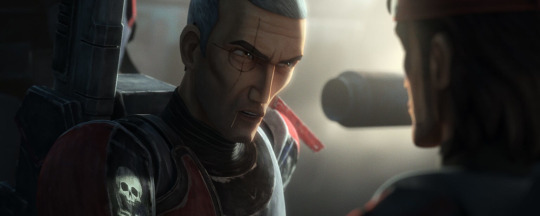
I'm not saying it would have been easy or risk-free. They also now have Omega in their care, and trying to extract Crosshair from Imperial custody while all parties involved would be trying to kill or capture them isn't an easy undertaking.
But, as I'll talk about more later, these guys do rescue and extraction missions all the time. They put their lives on the line for complete strangers several times in Season 1 to save them from Imperial custody, slavery, etc.
And I'm not saying they were wrong to do those things. It was objectively good that the Bad Batch saved the people they did.
But, I can absolutely understand why Crosshair would be infuriated that his brothers take on all these missions to help complete strangers but never bother to help him...
ANALYZING THE BATCH'S DECISIONS BASED ON THE SEASON 1 TIMELINE
I understand that, before he confronts them in the hangar in 1.01 "Aftermath," that they were planning to go back for him. And that they were forced to leave him behind because he was literally gunning for them. And -- as far as his brothers knew -- he was doing it of his own free will.
However, in 1.02 "Cut and Run," Omega tells them about the inhibitor chips, implying that that's how Crosshair is being controlled.
Then in 1.03 "The Replacements," we see that Tech is building a device to locate their inhibitor chips, and Omega tries to tell the Batch and specifically emphasizes to Hunter that Crosshair has no control over his actions. Hunter admits that he's angry at himself for leaving Crosshair behind, and Omega reassures him that they'll get him back someday.
So, it seems like -- at least in Omega's eyes -- the Batch was planning to save Crosshair at some point. And, Hunter at minimum feels guilty for leaving Crosshair on Kamino, even though they didn't really have much of a choice at the time.
However, the Batch gets sidetracked in 1.04 and 1.05. First, they need supplies; then bounty hunters are after Omega; then they need intel on who's after her and why.
Then, by the events of 1.07 "Battle Scars," we see that they've fallen into a routine of doing jobs for Cid. It's safe to assume they've done -- or at least attempted -- a dozen jobs for her at this point, based on Wrecker and Omega's 20 orders of Mantell Mix.
And then Rex shows up and tells them point-blank that the clones can't fight the inhibitor chip's effects, re-emphasizing Omega's earlier point that Crosshair had no control over his actions.
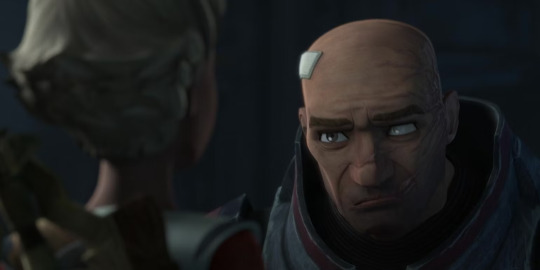
The Batch then experiences this firsthand with Wrecker, whose chip activates before they can extract it. We see that, even with Wrecker fighting the chip's effects with all his might, he endangers his brothers and was *this* close to killing Omega, before Rex stunned him.
Now, we have confirmation based on both Rex and Wrecker's experiences that removing an active chip restores a clone's free will.
Thus, by the end of 1.07 "Battle Scars," the Batch definitively knows:
Crosshair is being controlled by an inhibitor chip and is being forced to do the Empire's bidding;
How to remove an inhibitor chip; and
That removing a clone's active inhibitor chip will restore his free will
And yet, despite all this knowledge, the only effort they make to save Crosshair is to tell him about the inhibitor chip.
They don't attempt or even discuss possibly stunning him on the artillery deck and taking him with them.
But, admittedly, this isn't the best time to attempt a rescue, as they're outnumbered and essentially trapped aboard the Jedi Cruiser. And then Omega gets captured by Cad Bane and Hunter gets shot, and the others are desperately trying to get off Bracca before Crosshair & co. shoot them down. Fine. Getting off Bracca safely and then trying to find Omega should be their priority.
But, once they recover Omega on Bora Vio, and their lives aren't in immediate danger anymore... this would've been the perfect time to at least debate going back for Crosshair.
Again, they have all the information needed at this point.
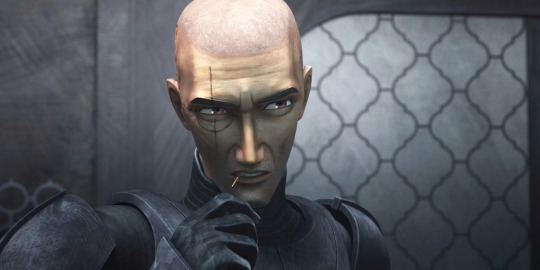
As for how they find him, well, I'm sure they could get the information somehow. Or they could just cause a stir somewhere so he'd show up to arrest them again, like he did on Bracca.
But, no, they just continue doing jobs for Cid in 1.10-1.13. They don't bring him up at all until they see him on Ryloth in 1.12 "Rescue on Ryloth," and again, the tone is like, "Well, Crosshair is here. That's annoying."
If not being able to locate him was the only reason they didn't try to save him after 1.08/1.09, that argument doesn't apply to 1.12 "Rescue on Ryloth." He's there. They know he's there. They're already there doing an extraction job anyway... why don't they just grab him too???
Yes, there would be additional risks, but YOUR BROTHER HAS BEEN KIDNAPPED BY THE EMPIRE AND FORCED TO DO ITS BIDDING, AND YOU DON'T SEEM TO GIVE A SHIT!!!
Which brings us nicely to:
THE DOUBLE STANDARD
Throughout Season 1, but especially in the latter half, we see The Batch putting themselves in harm's way for complete strangers, or at most, friends-of-friends.
They rescue Muchi the Rancor and other people from enslavers; they extract the former Separatist Senator from Raxus; they extract the Syndullas from Ryloth; they break Gregor out of the Imperial base on Daro.
In the latter three cases, the Batch went to Imperial-occupied planets and an Imperial base, despite all the risks involved. And, especially when they saved Gregor, they had very little information going in and basically just winged the entire thing.

It just feels like, when you look at all these cases, any argument the Batch could make for not saving Crosshair just falls apart.
"We didn't know where he was." He was on Ryloth -- grab him then.
"We didn't have enough information." You didn't on Daro, and you still snuck into a heavily fortified Imperial base to rescue Gregor.
"Everyone there would've been trying to kill us." You literally extract/rescue people from Imperial forces for a living...
"It would've endangered Omega." Well, buddy, have I got a story for you...
You see, when Hunter falls on Daro and gets captured, the Batch still comes to his rescue despite knowing it's a trap AND THEY BRING OMEGA WITH THEM!!!
Every excuse they could've made for not saving Crosshair sooner is gone. The Batch will literally run into a trap for Hunter, and they constantly throw themselves into danger to save Omega, but they never do the same for Crosshair.
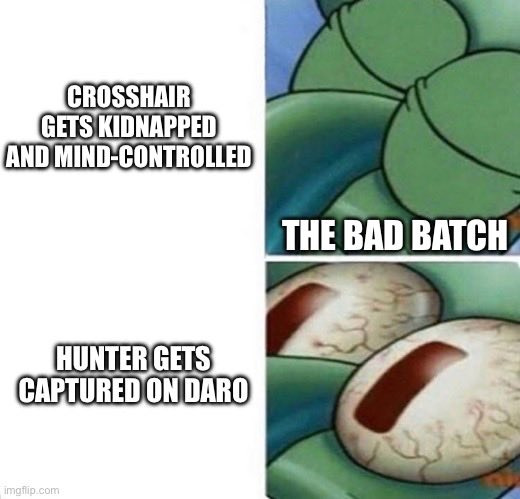
It really feels like such a double standard.
They seem to care about everyone BUT him.
Plus, sadly, there's one more parallel I can draw. One more instance where the Bad Batch put themselves in harm's way to save a fellow clone who was being mind-controlled by their enemies in an attempt to kill them...
Echo.
Yes, remember all the way back in TCW Season 7, when we find out that Echo is the one behind the algorithm that's giving the Separatists an advantage in all these battles?
Even though Rex thought Echo was dead, the minute he suspects Echo's still alive, he goes after him. He even punches Crosshair over it, after Crosshair bullies Rex for leaving Echo for dead at the Citadel.
One of the "regs" went back for his brother despite knowing his was being mind-controlled by the enemy and forced to attack them.
Rex, Anakin and the Bad Batch save Echo from a terrible fate. They extract him from the Separatists, restore his free will and essentially give him his life back.
Yet, when the exact same thing happens to one of their own, the Batch don't even consider going back for Crosshair the way Rex went back for Echo -- hell, the way they went in for Echo too, even though they didn't know him!!

SOME CONSIDERATIONS
I will give the Batch this: once Crosshair confronts them on Kamino and Hunter stuns him, Hunter decides not to leave Crosshair behind this time. And that was even after Crosshair refused to say when he had his chip removed. So, for all they know, he might've been acting of his own free will when he tried to kill them on Bracca.
While taking Crosshair with them at the end of 1.15 was a step in the right direction, I don't think it was enough to make up for everything they failed to do.
And, while he doesn't specify exactly what, Hunter later admits to Crosshair in 3.05 "The Return" that he has regrets too. And considering the context and the timeframe they're talking about, it's possible Hunter regrets not going back for Crosshair sooner/at all, among other mistakes he's made. (Story for another time.)
I'll also give some consideration to Wrecker, who was the only one of the brothers who said he actively missed Crosshair in 1.03 "The Replacements." Tech mentions Crosshair very flippantly a few times, and Echo doesn't really mention him at all.
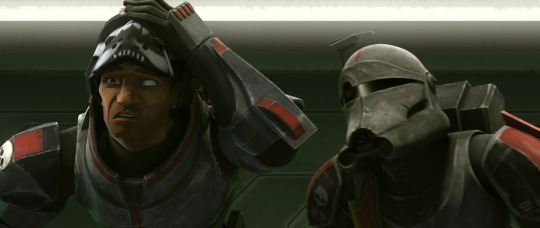
Obviously, we'll never know for certain, but I do wonder how Crosshair would've reacted if his brothers had rescued him and removed his chip at some point. Would he have stayed with them? Would he have wanted to rejoin the Empire voluntarily?
Considering he (supposedly) had his chip removed and still stayed with the Empire willingly in-universe, it's possible he might've wanted to do the same thing in an AU where his brothers rescued him.
He definitely despised that they were fugitives and "scavenging like rats," while he had authority, respect and purpose as a soldier of the Empire.
But, I think a large component -- although not the only one -- of why he stays with the Empire is that he felt like his brothers abandoned him. He brings this up several times in 1.15 and 1.16, and the way he does indicates this is a major sore spot for him.
We see in 1.01 "Aftermath" that the chip enhancement procedure is painful. He scrunches his face, flexes his hand and squirms around in the chamber. Plus, the machine itself looks similar to the Mind Flayer from other "Star Wars" properties.
Crosshair was literally being tortured by the Empire. Maybe he doesn't recall that once the procedure's done, but we see him getting his chip enhanced in both 1.01 and 1.03, and it's possible it was enhanced even more times off-screen.

I cannot stress enough: the Empire basically took Crosshair prisoner, tortured him and hijacked his free will.
And his brothers essentially did nothing to save him.
It would be one thing if his brothers were civilians like you and me, and didn't know the first thing about how to infiltrate an Imperial compound or how to navigate a firefight despite being outnumbered.
But, that doesn't apply to The Bad Batch. That's literally their bread-and-butter.
And Crosshair -- especially once he seems to regain his free will between the Bracca and Ryloth arcs -- watched his brothers risk their lives to save complete strangers while doing nothing for him.
I would've been livid too.
Not to sound like Tech, but while I don't agree with Crosshair's decision, I can understand why he decided to stay on Kamino rather than go with them at the end of 1.16. His brothers offered him no real comfort and no real apology, and I think he desperately wanted to hear that, especially from Hunter.
I know after everything that's happened -- especially Crosshair refusing to say when he had his chip removed -- that it would've been hard to admit their mistakes. But, Crosshair wanted to hear something beyond: "You can come with us if you want. And if you don't, we don't have to be enemies."
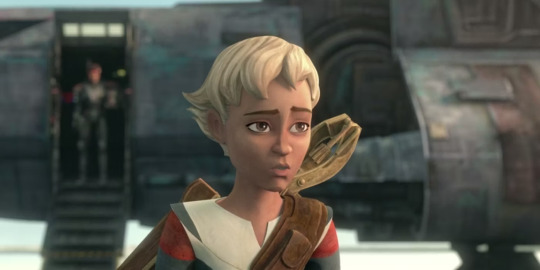
The closest thing to comfort any of them offer is Omega affirming that, despite everything, she still cared about him. This seems to be the only thing that really effects him, that causes him to doubt his decision, that causes him to show any kind of emotion beyond anger.
I legitimately believe that if someone had talked to Crosshair one-on-one for like five minutes, and really showed how much they still cared about him and always did, that he would've rejoined them.
Granted, it's really hard to tell.
Crosshair has, as Tech said, always been severe and unyielding. Plus, he really suffers from this "in for a penny, in for a pound" kind of mindset, which is partly why he stays with the Empire for so long even after regaining his free will.
But the fact that all his brothers leave him on Kamino again so effortlessly, so easily is just tragic. No final goodbye. No hug. No nothing.
For all any of them know, this could be the last time they ever see each other. (And, for Tech and Crosshair, it was.)
I know it wouldn't have been easy after everything that's happened, but for crying out loud, I just wanted them to try.
And I imagine Crosshair did too.
IN CONCLUSION
Honestly, I think the TBB writers and producers purposely never gave us a scene of The Batch debating whether to go after Crosshair, or a scene of them outlining to us the audience why it wasn't possible even though they wanted to.
I think the creative team wanted us to sympathize with Crosshair when he says "You weren't loyal to me," while also arguably giving our protagonists a weakness to overcome later.
This really seems like the case if we look at Season 2.
Once the Batch finds out Crosshair's being detained by the Empire's Advanced Science Division in 2.14 "Tipping Point," they immediately start discussing whether and why they should try to save him, even after everything that happened between them in S1.
On top of that, this time they actually decide to do whatever it takes to get him back, despite limited intel and the imminent danger behind such an undertaking.
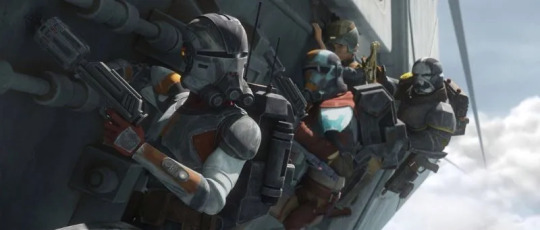
I think the Batch genuinely learned from their mistakes in Season 1 and, as Hunter maybe alludes to in 3.05 "The Return," regretted not going back for Crosshair sooner/at all after the Empire started controlling him.
I'll admit: I think when I first watched Season 1, I was basically in the Batch's corner. Crosshair was gunning for them at every opportunity, and Omega's well-being quickly became their priority (understandably so).
But, after rewatching Season 1 -- especially now that the show is over and we see how everyone's arcs play out -- it really hits me just how much Crosshair's brothers failed him in Season 1.
Again, I'm not saying Crosshair didn't make mistakes too. He definitely did.
But Crosshair's brothers failed him first.
AN ADDENDUM
(EDIT/UPDATE:) Since writing the above, I've stumbled across a few other posts of people making the counterargument, saying they believe Hunter was in the right and don't appreciate the hate he gets for not going back for Crosshair.
People are more than welcome to make that argument. I think that kind of debate just shows how nuanced this show and its characters are, because you can make valid arguments for both sides.
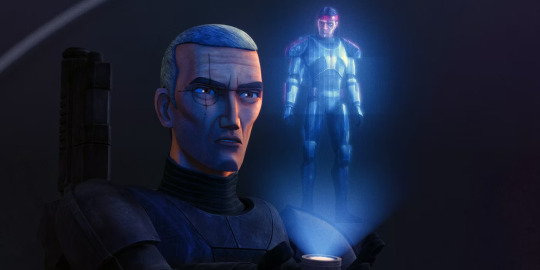
And to clarify, I don't hate Hunter (and the others) for not going back for Crosshair in S1. As Hunter says later in 3.05: "Nobody really understood what was happening back then." It was a chaotic time -- for the galaxy and their family.
In the span of one episode, the Jedi are exterminated; the war ends; the Republic is reorganized into the Empire; the clones' future role in the galaxy is questioned; and when CF99 refuse to kill civilians, they're declared traitors and arrested.
And to top it all off, Crosshair is acting strange AND they find out they have a little sister who's in danger.
So, when Crosshair seemingly betrays them and tries to kill them, and they only barely escape with their lives, it's understandable that the Batch's first move is just to get their bearings and figure out their next steps.
And, of course, all the dominoes fall from there.
So, while I definitely don't hate him and I understand why they don't go back for Crosshair initially, I am disappointed in Hunter.
If the writers wanted me to be on his side and understand that it was basically impossible to go back for Crosshair, then I needed a scene showing/telling me why they can't. Or I at least needed a scene proving that they care about him, because based on what we actually got in Season 1, I tend to fall on Crosshair's side when he argues his brothers didn't care about him the way they clearly care about Hunter when he's captured.
You can certainly make arguments that, because Crosshair's their brother and he knows all their strategies, strengths, weaknesses, etc., that he's even more dangerous than all the other Imperials they might face. Yes, definitely. I argue that's all the more reason to try to save him.
Yes, there would be risks. But, if you succeed, not only do you lose a very dangerous enemy -- one who knows you inside and out -- but you would (hopefully) regain a teammate.
Imagine you're in Hunter's shoes and your sibling -- or if you don't have one, a really good friend who feels like a sibling -- gets taken captive and mind-controlled by an evil organization. Wouldn't you try your damnedest to get them out? Or at the very least, wouldn't you be sad about their situation?
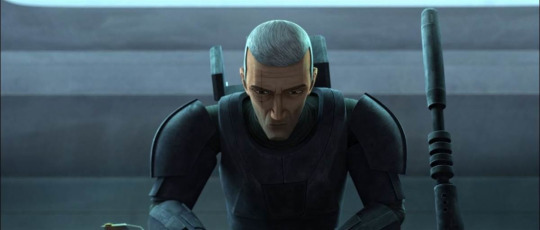
Rewatching 1.03 "The Replacements," there's an interesting scene that's probably the closest we get to a real discussion about Crosshair -- how they feel about him, whether they miss him, whether he really betrayed them or was being influenced by the chip.
@laughhardrunfastbekindsblog did a great analysis of each character's reaction, which I recommend you read at some point.
I want to take a quick look at it too, starting with the brothers looking at Omega with Crosshair's weapon kit like she just knocked over Grandma's urn or something.
It feels like, for the first time, they're starting to let themselves process what really happened. This is their first real chance to mourn losing their brother.
Tech wonders whether Crosshair's actions were influenced by his inhibitor chip, and Omega basically confirms that theory. Wrecker is excited by the possibility that Crosshair didn't willingly betray them, but Hunter very quickly shuts the conversation down, saying they have other problems to tackle first.
While he's not technically wrong, Hunter pulls out the "raincheck card” too frequently in Season 1. And subsequently, a lot of the topics that come up in conversations keep simmering in the background while the Batch does other things until they're FORCED to confront them.
This scene is the perfect example of that. The Batch didn't mention Crosshair except in passing in 1.02, and it's only when Omega finds his weapon kit that they are FORCED to talk about him. (EDIT: Check out the 3:45 mark of this video on 2.09 “The Crossing” for more examples.)
I get the sense that Hunter's reaction in this scene, plus all the distractions that come up later, is why the others never really bring up Crosshair again, except in passing. It's a sore subject for Hunter, and they all tend to take their cues from him, especially this early in the show. Plus, they're probably still processing their own feelings, so they might not be ready to bring up the topic.
One last thing from 1.03 I want to note is that, later in the episode, Hunter is telling Omega about his and his brothers' enhanced abilities, and he automatically excludes Crosshair from the list.
It really feels like Hunter -- and the rest of the squad by extension -- labeled Crosshair as a lost cause very early on. That it was a given that he was their enemy now and there was no real chance of getting him back (unless he came to his senses on his own like Howzer and other clones later do).
This might be why they're so shocked when he reveals he removed his chip, because they were hoping that once he "woke up" that he would come back to them. Wrecker even says as much to Crosshair in 1.16: "We still would've taken ya."
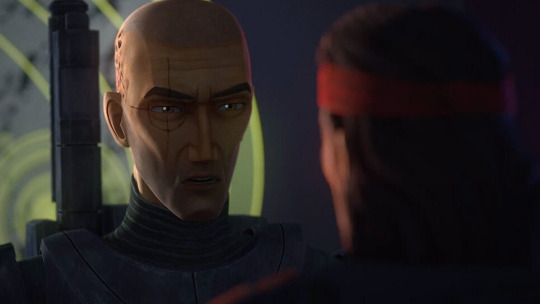
Ultimately, I think the characters had differing perspectives on who had the responsibility in the situation.
It seems Hunter and the others took a very passive approach. They told Crosshair about the chip when they had the chance, hoped he would "wake up" on his own, and would've accepted him back if he had.
But, Crosshair feels they should've taken a more active approach. He's hurt that they never came back for him, whether to save him or to join him.
(EDIT #2: I realize that by 1.15, at least, Crosshair seems to be arguing that they should’ve come back to join him in the Empire. He might be making that argument, but I’m saying his brothers had a responsibility to try to save him, and in that regard, I believe they failed.)
This is essentially the exchange Hunter and Crosshair have in 1.15:
Crosshair: They don't leave their own behind, most of the time. Hunter: You tried to kill us. We didn't have a choice. Crosshair: Hmm. And I did?
And, as I said before, based on everything we saw in Season 1, I tend to side with Crosshair.
Hunter made mistakes -- never talking about Crosshair and shutting down the others when they did was a big one. He never addressed the elephant in the room until he HAD to, and by then it was basically too late. And, of course, it seems the others took their cues from him.
As the leader, it was his job to -- at some point when they weren't in immediate danger -- introduce the topic and ask the others for their thoughts about Crosshair, especially once they knew how powerful the chip's influence was and once they knew how to remove it.
But, he didn't.
If the writers wanted me to side with Hunter when he says "We didn't have a choice" -- especially given the double standard I discussed earlier -- I don't think they gave me good enough reason to.
However, I think that's ultimately why the writers did what they did.
Both Hunter and Crosshair made enough mistakes in Season 1 that you can argue all day about which one of them failed the other more, which makes the show and characters all the stronger for it. Because neither one is 100% in the right or 100% in the wrong.
I just wanted to play Devil's Advocate, and try to explain why Crosshair felt like he did, and why I believe he was (at least partly) justified.
So, feel free to continue debating it, but I at least believe that Crosshair's brothers failed him first.
271 notes
·
View notes
Text
Hunter was trying to be a good older brother to Crosshair and a good father to Omega in The Return, despite a few moments of weakness, through protectiveness, observation, and supportiveness. He ultimately succeeded in his objectives.
The Bad Batch S3E5 "The Return" will always be one of my favorites because it doesn't shy away from the complexity of the family's dynamic after 1) losing Tech, who was often a peacekeeper/mitigator, and 2) regaining Crosshair. While I, and many others, wish the former was explored more, it does an excellent job of showing us even more about these siblings' dynamics than we even knew before.
As always with any analysis, this is a disclaimer that you may view this episode in an entirely different way due to various biases, one of the most notable being based upon your own favorite characters and your own life experience. All I ask is that you read through carefully before chiming in with any counterarguments!
The line of dialogue that most of my argument here hinges upon is from Hunter about midway through the episode, just before his and Crosshair's fight.
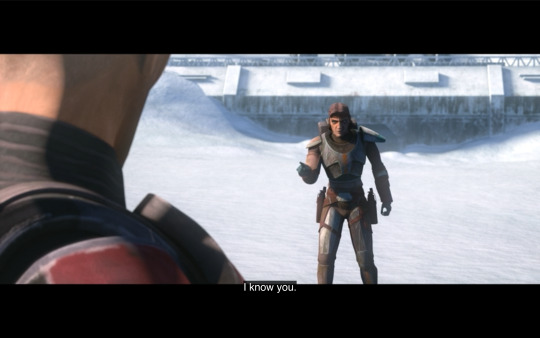
"I know you."
Going back to the very beginning of the episode, we see Hunter and Wrecker sitting and waiting for Omega to wake up. Crosshair's clearly not there, and when Omega asks about their brother's whereabouts, Wrecker says he wasn't there when they woke up, before Hunter adds this.
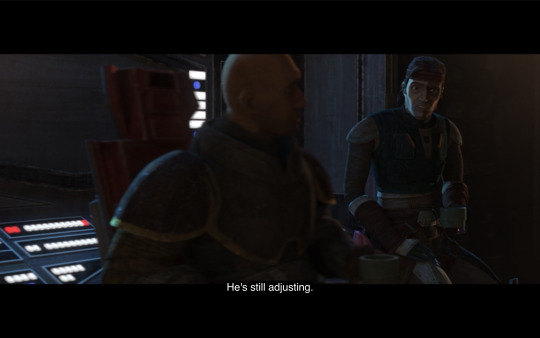
His face is clearly displaying concern, even though his words are reassuring. He's no doubt worried about Crosshair, too, but like he says later on: he knows Crosshair. He knows what to do when Crosshair's upset, and that the sniper wants/needs time alone, hence why he and Wrecker didn't go after him. Hunter is trying to reassure Omega, who isn't as familiar with Crosshair at this point, by insisting that this is how he adjusts to change. It's important to note that there doesn't really seem to be any hostility radiating from Hunter (or Wrecker) towards Crosshair here.
In fact, the duo only gets up and goes to check on Crosshair once Omega's involved. This proves something else that's important to understand for Hunter's character in this episode: he's wrestling with both his concern for Crosshair and his protectiveness over Omega, and that's because of this moment from season 1:
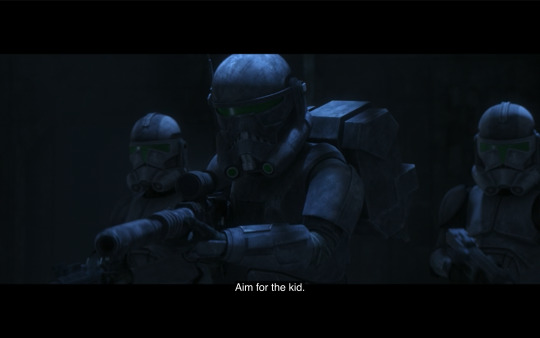
Because of Crosshair telling Hunter in S1E15 that he had his inhibitor chip removed, without the context of when, Hunter has to assume for Omega's safety that this was Crosshair acting of his own accord. This is because, if Hunter's to be a reliable protector of her, he always has to be as cautious as possible with those she's surrounded by—and unfortunately, in this case, that includes Crosshair.
(Remember that, even as the sergeant of Clone Force 99 and the eldest brother/caretaker of their family, Hunter's priorities have shifted since the war ended; Omega now comes before all else. He says this as early as S1E7 to Rex, when they had only had Omega for a short time. This is now at least a year after those events, which means that sentiment's only grown stronger for Hunter, especially after losing Omega to the Empire for six months.)
Because Crosshair is smart and also knows his brothers just like they know him, he comes to this conclusion himself. This is why he's not surprised when they start watching him and Omega from a distance, and why Crosshair insists it's because "They don't trust me."
Then, Echo arrives, and they start making plans to go to Barton IV. This is where we see Hunter's protectiveness of Omega really shining, along with some interesting glimpses of Hunter's concern/curiosity about Crosshair and what he went through.
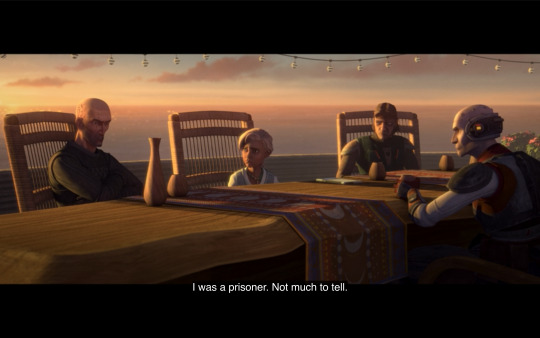
The fact that Omega and Hunter have the same expression here... that's intentional. Omega is but a mirror of her brothers, and always has been ever since she met them. She and Hunter are literally displaying the same amount of sympathy and concern for Crosshair here.
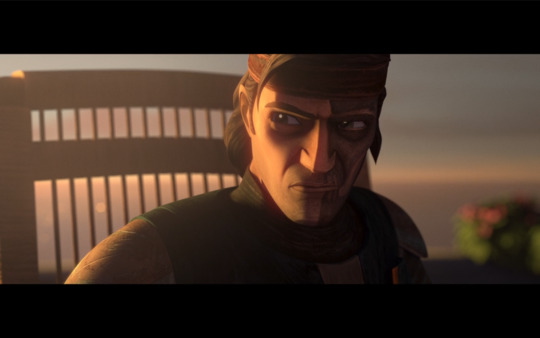
Now, this look from Hunter that's immediately after Crosshair's done talking is read as anger from a lot of people, which is understandable. To me, though, especially through this lens, it looks more like Hunter is coming to a conclusion. Hunter can tell that Crosshair knows more (and has gone through more) than he's letting on about, but he doesn't care that much about getting the intel that Echo no doubt wants. Hunter just doesn't like the fact that Crosshair won't open up about what happened to him.
It's important to keep in mind that as Hunter and Wrecker were watching Omega and Crosshair before, they undoubtedly saw Crosshair's target practice going poorly. Hunter would certainly make note of that, and thinking of his physical struggles along with hearing this... well, yeah, Hunter's gonna have a serious pondering face, because he wants to know what's wrong with his youngest brother so he can help him. But because he knows his brother, he knows that he has to keep his space for now and be mindful.
Once plans for the trip to Barton IV come up, Hunter proposes that he goes with Crosshair and Echo, again proving that Hunter isn't really trying to avoid Crosshair. In fact, Hunter only expresses any concern when Omega wants to join, and we all know why. He's worried about her and doesn't want to risk it, which he says plainly.
It's clear, though, that Hunter is still worried about Crosshair being so close to Omega, too, especially if they're going to an Imperial hideout. Hunter has trauma from that moment in S1E8, and it's not easy for him to see past that, as much as he does still care and worry for his youngest brother. Again, he has to suspect that anyone is capable of hurting her, aside from the brothers who've been protecting her alongside himself the entire time.
Crosshair even acknowledges this when he and Hunter pass one another while packing up the night before.
(I'd like to note that, in this moment, Hunter's the one who moves to accommodate Crosshair's path. To me, that's more evidence of the fact that Hunter is keeping a safe distance from Crosshair to let him process, but because Omega's there too, he's also keeping a watchful eye on him. He's really torn between the two.)
"Don't hold it against him," Crosshair tells Omega. Why? Because:
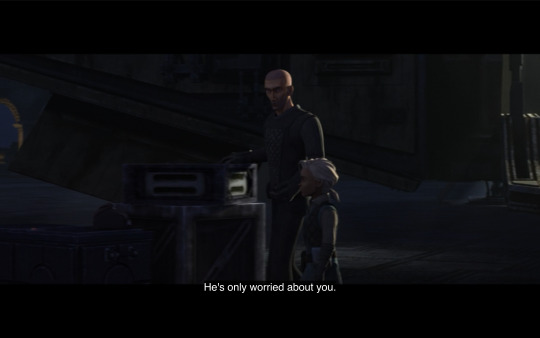
Crosshair understands that most, if not all, of Hunter's moments of caution towards Crosshair have everything to do with Omega and her safety, rather than Hunter being angry at Crosshair. Hunter doesn't like that Omega's going on this risky mission, and he really doesn't like that it's happening with Crosshair there, when he hasn't even told Hunter everything that happened. How is he supposed to properly protect her (and Crosshair) without knowing all the details?
(And how sweet is it that Crosshair agrees with Hunter's take on Omega coming with them?)
They get to Barton IV, and there, we get one of Hunter's moments of weakness, when he's really giving in to his protectiveness of Omega and his frustration/worry about having such few details about Crosshair and his falling out with the Empire.
(But first, let's quickly acknowledge Crosshair emerging in his old armor, and the fact that Hunter, Wrecker, and the others kept it. Hunter (and Wrecker I believe) both lost pieces of their armor during their search for Omega, no doubt either losing them in dangerous situations or selling things to get by, but they never once touched Crosshair's kit—even when it would have been really easy to sell his things before selling their own.)
Because the base is empty, Hunter starts to worry that it's a sign of something bad. Remember, just because Hunter is the level-headed sergeant and leader of the group, he's not immune to trauma. Imagine how traumatizing Eriadu and all his failed attempts to find Omega with Wrecker were for him, especially with him literally being a tracker. The last time they were all together like this on a mission was when Tech died.
So, Hunter gives into that protective sense and challenges Crosshair, because now he needs the details. He has a sense that this place is notable to Crosshair, but not how, and if he wants to protect Omega, who is his main priority, he has to find out. He's also getting more and more frustrated that Crosshair won't talk to him about it.
This can be evidenced by one of their exchanges. It's only after Crosshair brings up his cell again that Hunter insists, "I get the feeling there's more to this place than you're saying." And... well, Hunter's right. This is a place of trauma for Crosshair, and Hunter's no doubt picking up on that. After being reminded of Crosshair's imprisonment, Hunter has to ask, he has to press, in his mind, for the wellbeing of Omega, Crosshair, and the rest of his squad.
Again, Hunter doesn't like operating off little information to accomplish all these things. He's a protector at heart, and he always has been. Crosshair not giving him all the details he can remember (likely because of his own trauma) makes Hunter feel even more on edge, and that's why he lashes out a bit more at his brother, questioning him about why he didn't mention the raiders before.
Unfortunately, with Crosshair deflecting to avoid his own hurt, Hunter takes the bait and engages, leading to their exchange of "Just following orders?" "If you're scared, why don't you wait on the ship?" Thankfully, Echo steps in and breaks it up, which gives Hunter time to clear his head again. This is Hunter's first biggest moment of weakness.
Now, we're getting to one of my favorite sequences: Hunter watching Crosshair from a distance inside the depot.
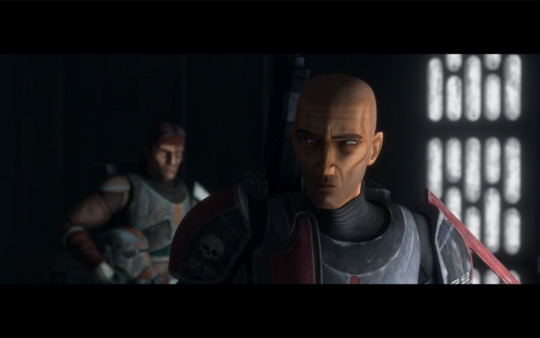
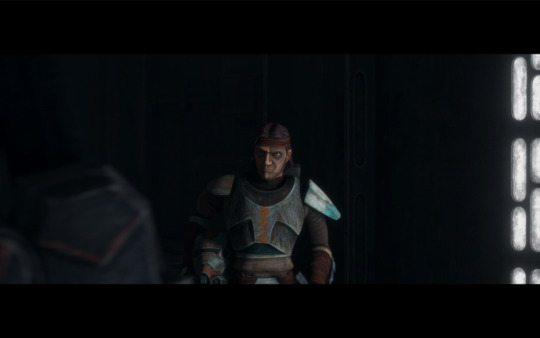
Hunter clocks Crosshair's discomfort right away after Echo says that Crosshair's words about the base serving its purpose "Sounds familiar." Again, it's easy to understand why people might read this as Hunter being angry or cautious, but to me, it looks like Hunter's just trying to get a read on why that particular exchange sent Crosshair away, and what exactly he's looking for.
Wanting to figure out more so that he can help Crosshair and thus help them all in this very moment, Hunter quietly follows Crosshair, and that's what leads to him seeing Crosshair pick up Mayday and the other regs' helmets.
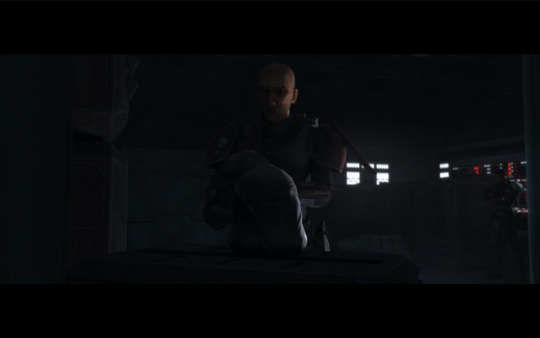
(Hunter lurking in the back right. I'm obsessed with this shot.)
Remember, Hunter is observing this as someone who remembers Crosshair not wanting anything to do with the regs. He antagonized them perhaps the most out of any other in the squad during their arc in The Clone Wars, and he even told Hunter in S1E15 that the Batch was superior to the regs, and to most other soldiers in general. Hunter seeing Crosshair treat these reg helmets with such reverence is such a strong indication to him that something major has shifted for Crosshair, and it had likely happened on this planet.
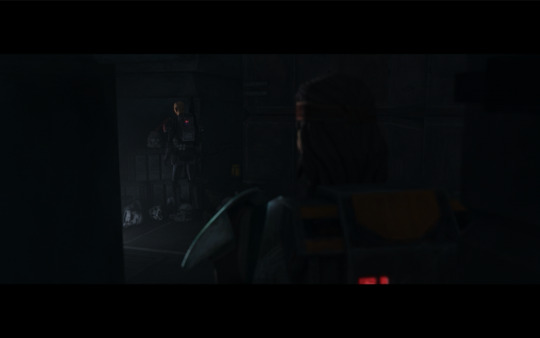
But Hunter, again, knowing his brother, remains a quiet observer. It would've been easy for him to engage here, but he recognizes that Crosshair needs this moment to himself. Hunter even leaves him to it after. Would someone who really didn't trust Crosshair at all whatsoever turn their back to him like that? What he does is give his brother privacy, and acknowledge that he needs to know what happened... but this isn't the right place or time to be pressing him about it.
Danger is lurking, though, and Hunter's desperation to know the truth so he can be better equipped is growing. It hits a peak when Crosshair, prompted by Batcher's barking, checks the perimeter by himself. Pay close attention to how Hunter reacts to Crosshair's exit.
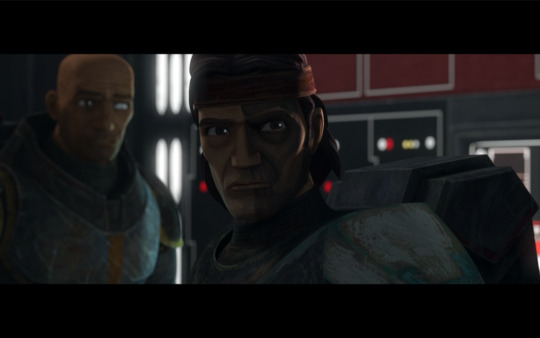
It isn't really anger in this expression. Wrecker's behind him is certainly one of concern. Hunter instead looks determined, and that's because he's about to pursue Crosshair to start getting answers. He's tired of not knowing, and because the stakes are starting to rise, and the evidence is all around him. Hunter decides that he's given enough space and now has to push Crosshair to talk to him.
Because, as Hunter's about to say in a few seconds, he knows Crosshair. He knows, and from what Echo says later, he's always known how to get Crosshair to talk, and it seems that it often involves some fighting and bloodshed—because Crosshair has a harder time opening up than his other brothers.
But Hunter will be damned if he doesn't try, especially now that Omega's safety could depend on this information.
Now, at last, we're at the pinnacle moment of the episode for these two characters: the fight, and another moment of weakness for Hunter. He reminds Crosshair that he knows him, and he demands this time to know what exactly happened here.
Hunter, because he knows his brother, has to push Crosshair (literally) to get anything out of him. He doesn't want this to be simple bickering like before. So, Hunter goes for a low blow. He knows that Crosshair values loyalty above all else, so he brings up Crosshair's disloyalty to both the Empire and their own squad, knowing it'll hurt him enough to get some real responses out of him.
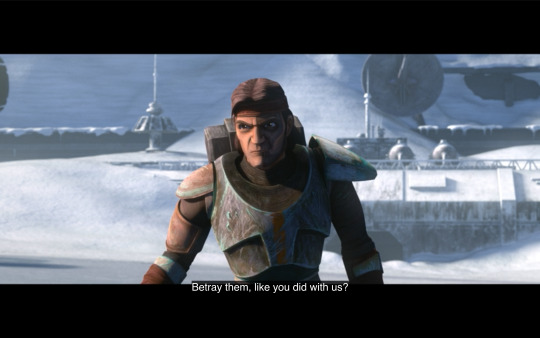
Then comes the physical shove. This is a clear demand for Crosshair to start giving answers.
But look at how Hunter's expression changes as he waits for Crosshair to talk.
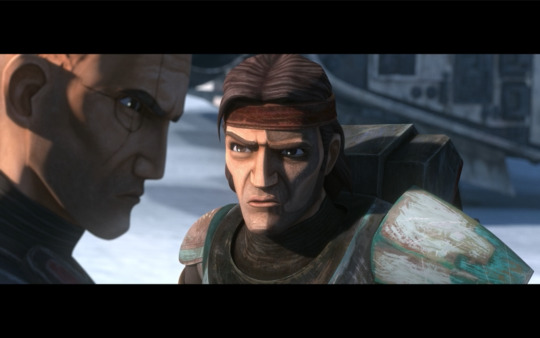
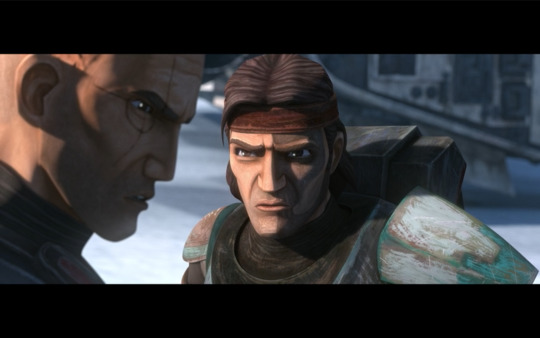
His brow softens, because Crosshair's hesitance to say or do something right away is evidence of the fact that it's something really, really serious that happened. At the end of the day, he's just worried for his brother. He wants to know, needs to know, so he can help him. It almost looks like he's pleading for an answer here.
And Crosshair does answer truthfully, revealing that he killed Lt. Nolan. Hunter is obviously shocked, and he even has a somewhat guilty reaction to Crosshair saying "after they betrayed me", because, I mean, we all know Hunter's been harboring guilt for leaving Crosshair behind.
That's when Crosshair digs his claws in to protect himself, too, also going for low blows against Hunter—starting with Hunter ignoring the warning Crosshair had sent from Tantiss.
(What's really telling to me here is that Hunter doesn't once defend himself when he easily could have. He could have told Crosshair that he was the only one who wanted to listen to Crosshair's warning, but that his and the rest of the squad's desire to try to save Crosshair ultimately won out. But he doesn't. He just takes it.)
Hunter only starts to get really angry when Crosshair gets Omega involved.
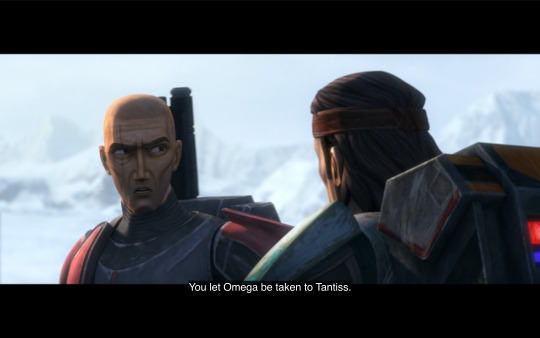
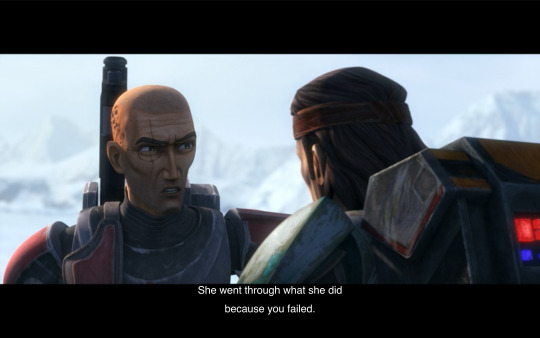
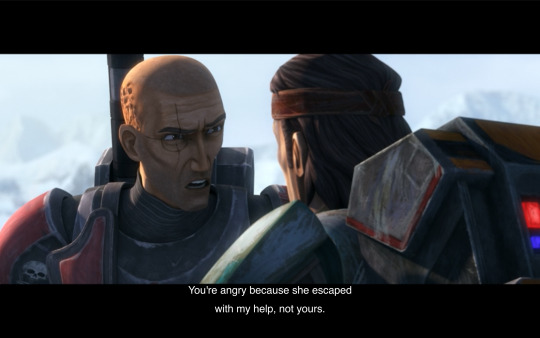
Hunter turned Crosshair's loyalty against him, so Crosshair turns Hunter's protectiveness against him. Imagine being a protector like Hunter, who's even more fiercely protective of Omega, and being told that after months of desperate, worried searching, you're the reason why the person you care the most about went through their worst bout of suffering.
Yeah, that stings. Especially because there's truth to it, the part about his jealousy towards Crosshair being the one to free her instead of himself. Hunter no doubt felt like he had failed as Omega's protector by losing her to the Empire, and not only that, but the brother he left behind had to be the one to bring her back to them.
(I also think that, in reading between the lines in this entire part of Crosshair's argument, he could even be insinuating that Hunter's shouldering the blame for Tech's death. If he knows the details, then he knows that ultimately, Hunter's the one who approved the mission. "You ignored it", in reference to Crosshair's message, could mean that both Tech and Omega could have been safe if Hunter had simply made the right call. It may not have been intentional on Crosshair's part, but I could easily see Hunter thinking that, especially if he already felt guilty about it.)
No wonder why these two are about to fist fight in the snow. Their ugliest, scariest monsters have finally come out.
And that's when the scary monster comes out, too.
(I love the symbolism!)
Hunter immediately snaps back into his protector mode. He warns Crosshair to move, but also physically shoves Crosshair out of the way and takes his previous place, making himself the one who's closest to the threat.
(Hunter does this a lot with his squad, by the way.)
They focus on getting to safety, and then figuring out a plan with the others to get the wyrm back outside the perimeter. This is when Hunter insists that they have to make sure the wyrm is drawn out that far so that they're not trapped inside with it, and Crosshair volunteers to take it on his own. But Hunter's not okay with that.
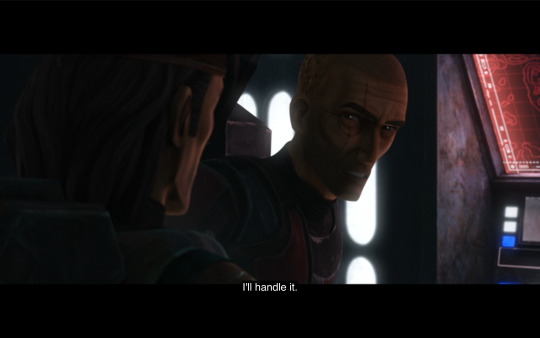
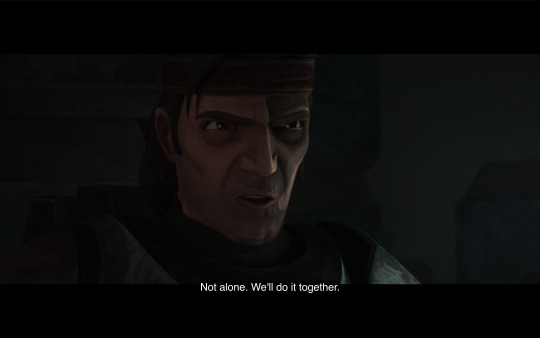
You would think that Hunter would want to be as far away from Crosshair as possible after what just transpired, but he doesn't. Instead, in this moment, Hunter is assuring Crosshair that he doesn't have to do things alone anymore, that they're brothers at the end of the day, and he wants to help. I think this is Hunter's first true attempt at making a truce with Crosshair, and attempting to extend his hand to him.
Of course, Crosshair snaps back asking Hunter if he's sure that's what he wants, and that leads to a moment of tension—but notice that, unlike the other times, Hunter doesn't retaliate. He understands with more clarity now why Crosshair's lashing out. Crosshair's hurting.
So, in teaming up with Crosshair here, Hunter knows he can mend what's most important to Crosshair by proving it with his actions: loyalty.
If anything, what Crosshair lashing out here and what Hunter going with him proves is that Crosshair's mostly hurt that he's lost the loyalty/trust of his brothers. When they get out there and Hunter's trapped underneath the ice, left to rely on his brother for guidance and rescue, it allows Crosshair to mend that sense of loyalty and trust. He can earn it back.
Not because Hunter necessarily needs him to do that, although it certainly is helpful, but because Hunter knows that Crosshair needs that. Crosshair needs to feel reliable to them again.
That's what's so perfect about Hunter's safety literally being in Crosshair's hands here. They're able to banter the way they likely would've during the war, and Hunter doesn't hesitate when Crosshair extends his rifle to pull him up and get him out of the hole in the ice.
Hunter gets proof that he can indeed trust Crosshair with his life again, and Crosshair gets that proof, too. Because, at the end of the day, they're just an eldest and youngest brother. Youngest siblings (I say as a youngest child myself) are often looking for validation and trust from their older siblings, especially the eldest. This display of trust must've been so, so validating and healing for Crosshair.
That brings us back to that first line of dialogue I highlighted: "I know you." Hunter knew Crosshair was hurting like this all along, and while he was struggling between his protectiveness over Omega and his concern for Crosshair, he was finally able to make his brother's journey to healing happen.
We then get the nods of mutual trust, understanding, apologies, and forgiveness, before they sit in peace together.
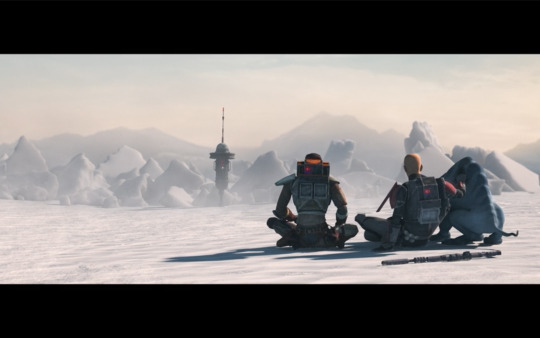
(This is one of my favorite shots in all of Star Wars. I mean, come on.)
I love how the shift in their dynamic is evident enough that everyone recognizes it once they get back. They hug it out with Wrecker, and then we shift into one of the most meaningful dialogue exchanges we'll ever get between them.
Now that Crosshair's laid more of his vulnerabilities out on the table, he seeks reassurance in Hunter. Again, youngest siblings so often just want to feel validated by their older siblings, especially the eldest. Crosshair's looked to Hunter to lead him and guide him his whole life. This is why the guilt's so evident when he comes clean about making mistakes with the Empire.
It would've been so easy for Hunter to say yeah, you did make mistakes, you did hurt us and many innocent people. Instead, Hunter says these simple few words that carry so much weight:
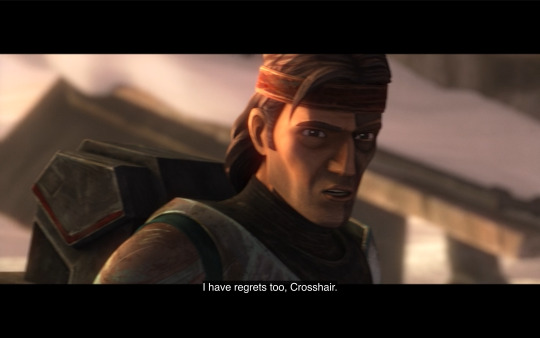
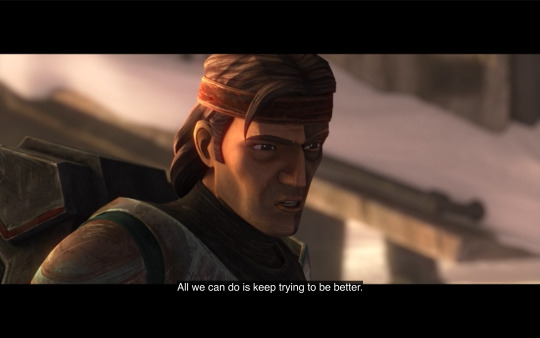
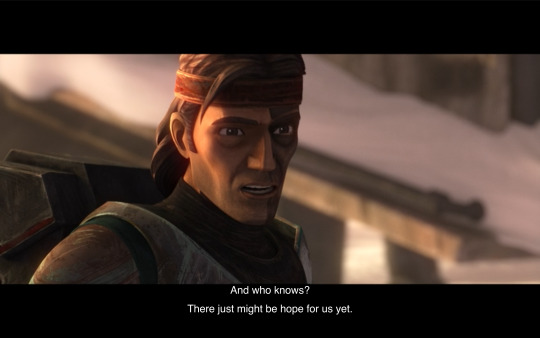
Hunter takes on that burden with Crosshair. He lets his own vulnerabilities show by saying, yeah, I'm with you there, there are things I wish I hadn't done, either. He then gives him reassurance and hope by saying that they can forge a new path forward, that they're not tied down by who they used to be, nor what bad decisions they made.
Hunter is putting them on the same level here, and for someone like Crosshair, who probably thought his brothers would never trust him nor accept him the way they used to because of what he's done, this means everything.
(I also feel like Crosshair really needed to hear the "I have regrets too" line from Hunter in particular. He needed a hint that Hunter really did regret leaving him behind, even if it was the best/safest option for the rest of the squad at the time. You can certainly still regret doing something, even if it was the best option at that time.)
In summary, The Return is about not just a return to Barton IV, but a return to who Clone Force 99 used to be. Crosshair's return to his squad, the return of their trust in him and vice versa. A return to the familiar.
Hunter didn't handle this perfectly, nor would anyone who was in his shoes with all these complicated relationships and trauma, but he did his best. Even while caught between his concern for Crosshair and his fierce protectiveness of Omega and the members of his family that he had left, Hunter still found a way to make things right. He completed both objectives.
For as much as Crosshair needed to have the trust of his family back, Hunter needed the reassurance that he could still keep his entire family safe on missions like these. He needed to know he could still take care of them, physically and emotionally.
And he succeeded.
#imagine being able to watch this episode and be normal about it. not me!#tbb hunter#tbb crosshair#the bad batch#star wars#star wars meta#clone force 99#analysis#sunny yapping yet again about hunter and crosshair what's new
243 notes
·
View notes
Text
The last words Crosshair heard from Hunter before he was subjected to his inhibitor chip being intensified were:

"Oh no, no, no. We stay together."
Crosshair may have just been arguing with all his brothers, but Hunter is still trying to protect him.
And the troopers attack Hunter for it.

And then there's Crosshair's reaction (which Hunter doesn't see): his look of shock and anger mirroring his brothers', a look that quickly fades to a resigned shake of the head before he stands to leave.




And while I'm sure there were lots of thoughts going through Crosshair's mind - "see, Hunter, this is why we need to just follow orders, you wouldn't get hurt if you would just comply" likely being among them - I firmly believe at least part of the reason why Crosshair got up and went with the troopers without a word of protest was because it was his way of protecting Hunter in return.

#the bad batch#star wars the bad batch#tbb hunter#tbb crosshair#clone force 99#tbb analysis#tbb meta#tbb brothers#hunter tries so hard to protect every member of the squad#and crosshair still loves his brothers even when he is so frustrated with them
306 notes
·
View notes